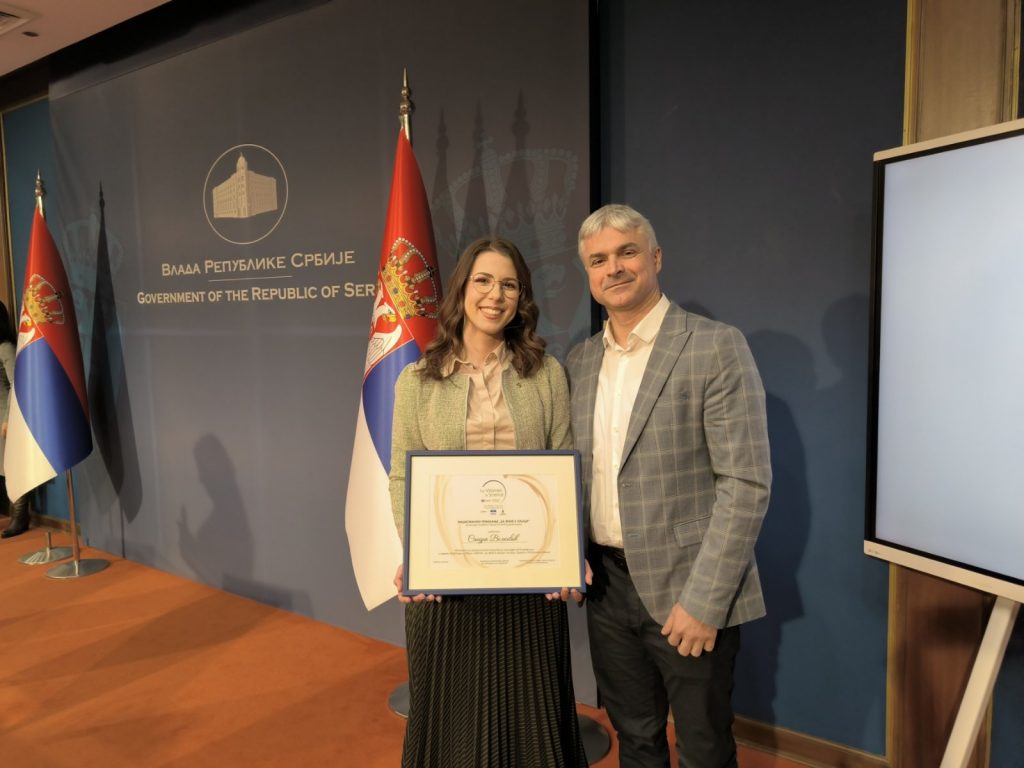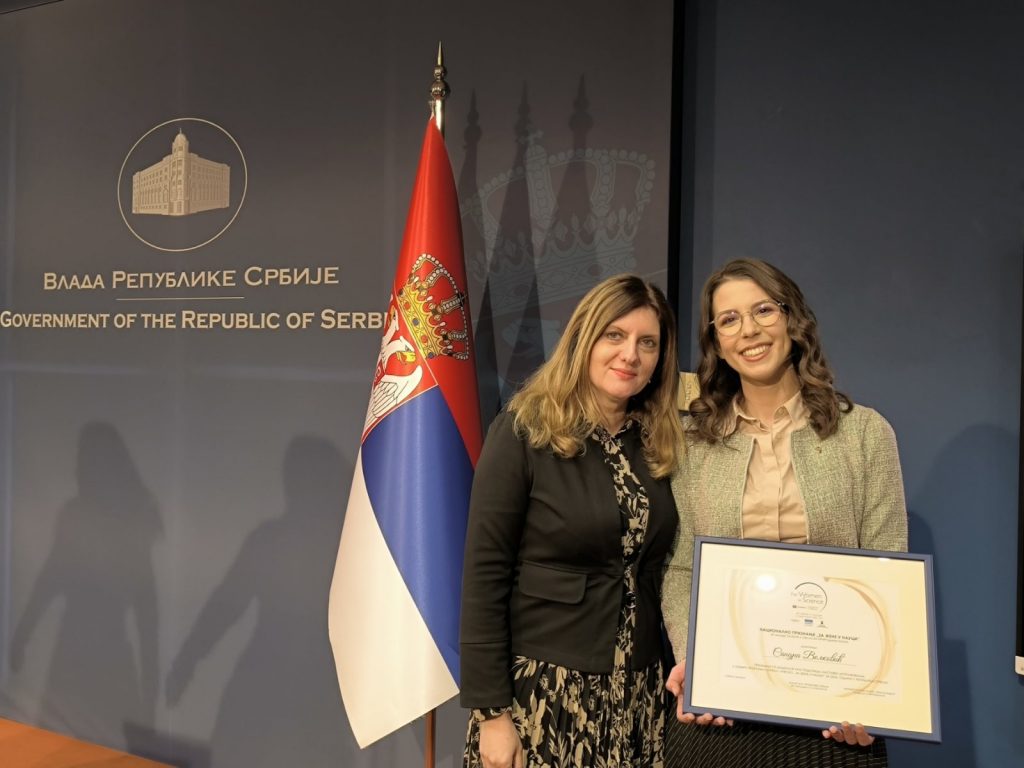With our Pre-University STEM program „From Idea to Impact: Launching the IEEESTEC Conference“, through interactive workshops and final competition, students learn to work in a team, exchange ideas, learn to quickly identify and solve a problem and contribute to the final result – the practical implementation of the project. The program is realized in cooperation with the local STEM institutions (University of Nis, Faculty of Electronic Engineering (FEE-UNI), The Center for the Promotion of Science (CPS), Science clubs in Nis and Leskovac).
01. Administrative meeting regarding STEM project
15.01.2024. At the meeting held at the beginning of the year, the planning and organization of future STEM workshops were discussed. The team members agreed that the workshops will be held monthly, with a special focus on developing skills and knowledge relevant to ongoing projects. Prof. dr. Danijel Dankovic presented the plan for the realization of the project From Idea to Impact: Launching the IEEESTEC Conference.
02. Preparing for the Galaksija Cup
31.01.2024. Students from the Mija Stanimirović Technical School have been diligently preparing for the prestigious Galaksija Cup competition. They visited our institution seeking assistance and the opportunity to learn additional skills crucial for the event. During their visit, we provided comprehensive guidance and support, covering various technical and theoretical aspects to enhance their knowledge. Miloš Marijanovic and Nikola Mitrovic worked closely with the students, ensuring they were well-prepared and confident as the competition approached. The collaboration was effective, and we believe this experience has significantly boosted their chances of success at the Galaksija Cup.
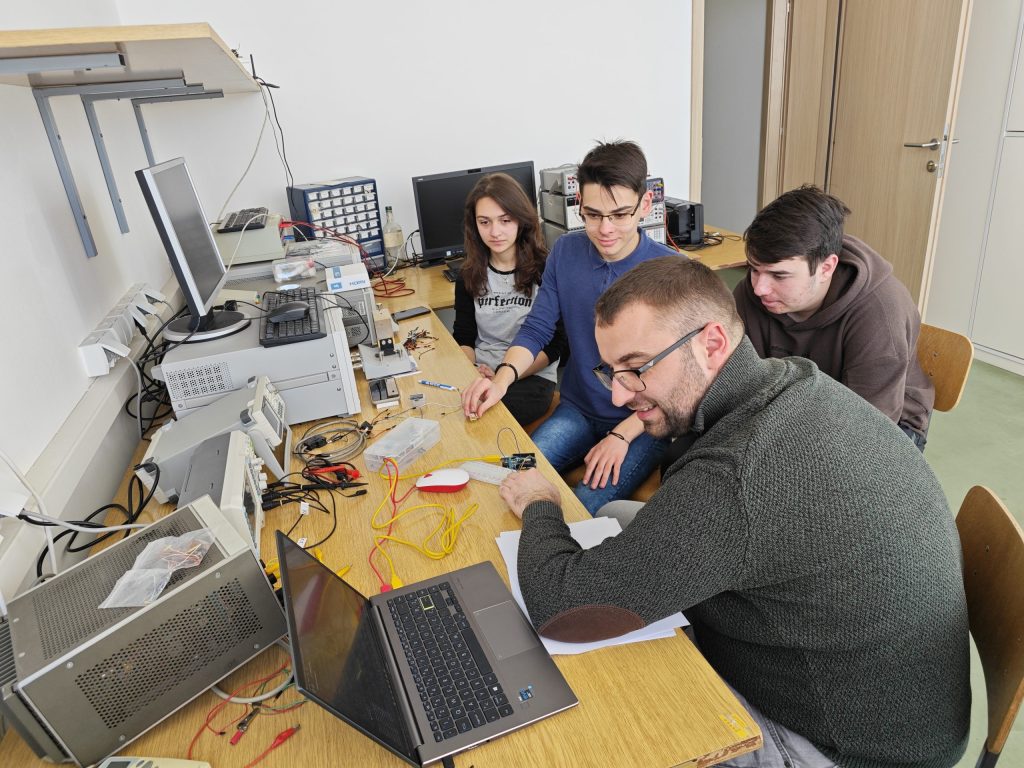
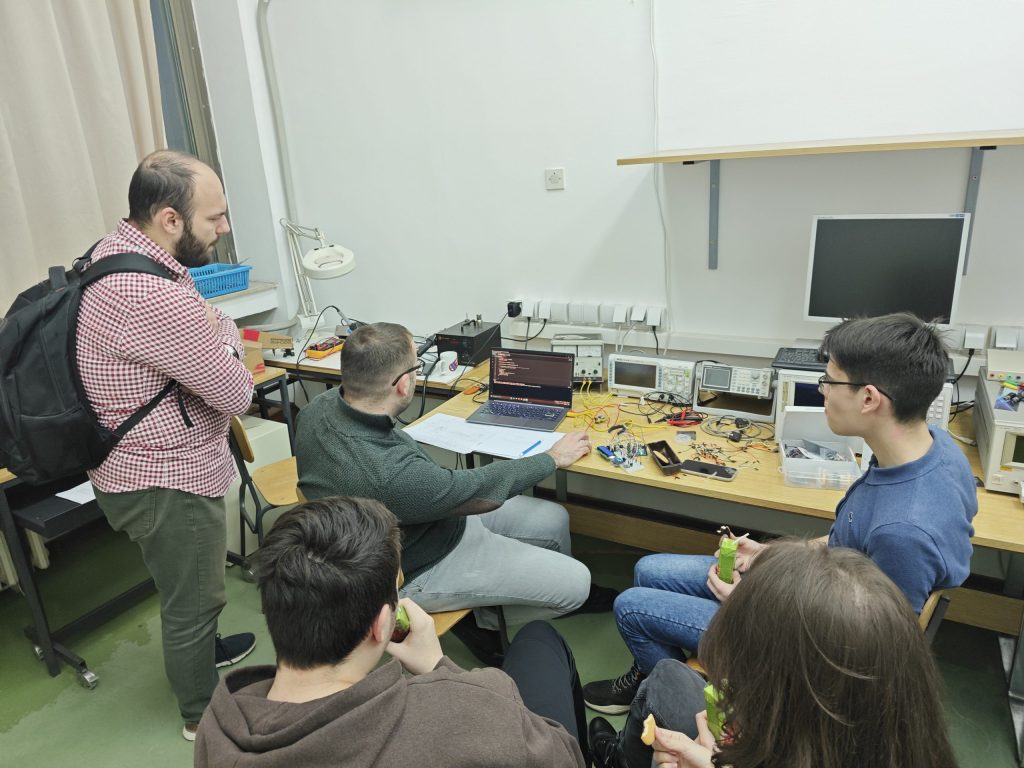
03. Second preparation for the Galaksija Cup
01.02.2024. Students from the Mija Stanimirović Technical School have returned, this time to collaborate with our colleague Nikola Mitrović. They are continuing their preparation for the Galaksija Cup, focusing on further improving their project. Nikola welcomed them warmly and began by reviewing their progress so far. He identified key areas that needed enhancement and provided detailed feedback. Over several sessions, the students received hands-on training and expert advice on advanced techniques. Nikola also shared valuable insights from his own experiences, which the students found incredibly inspiring. The team worked together intensively, refining the project and addressing any challenges that arose. By the end of their time with Nikola, the students had made significant improvements and felt more confident in their abilities.
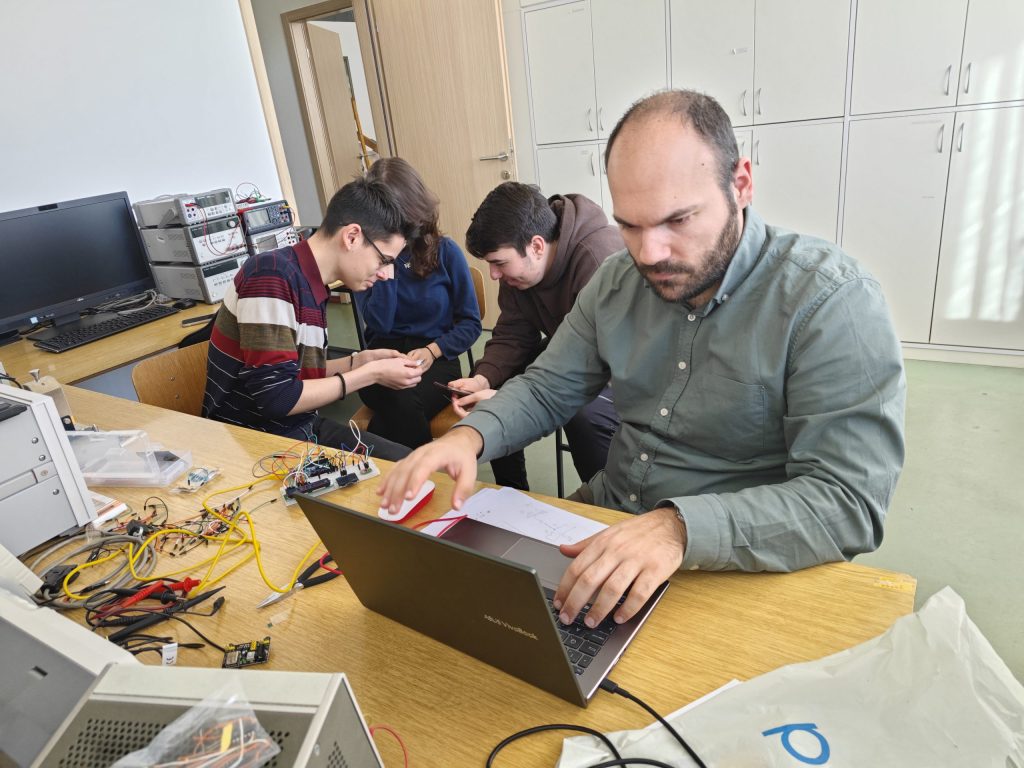
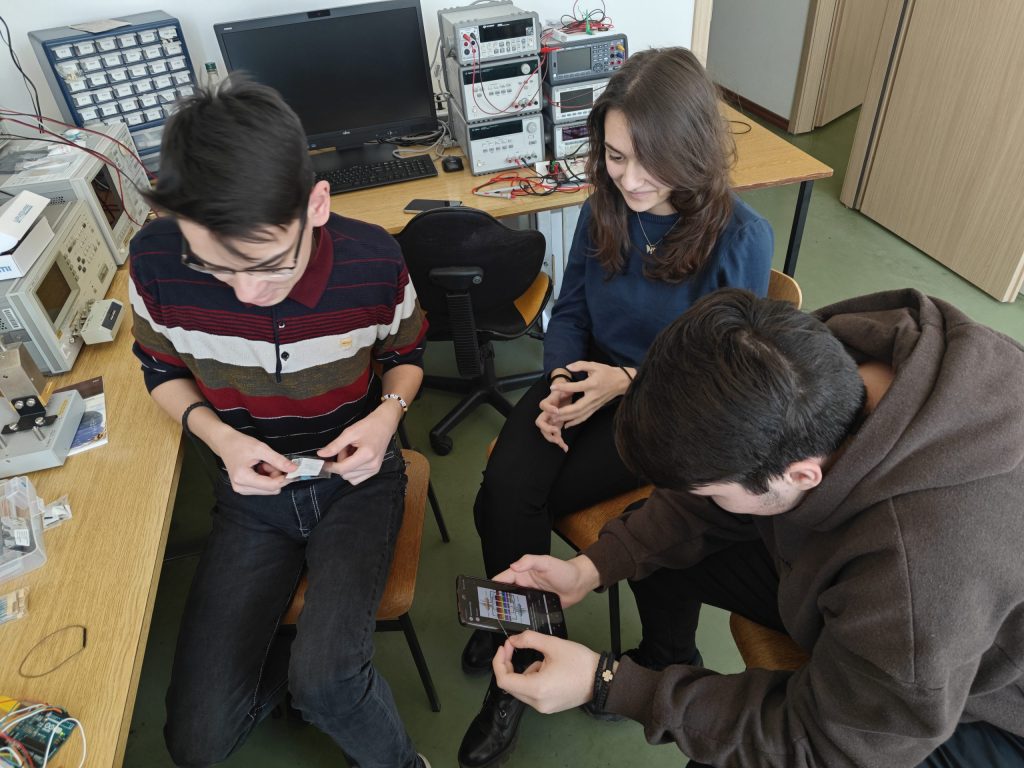
04. The promotion of science and the enhancement of teaching
20.02.2024. On February 20, 2024, a meeting was held to discuss the promotion of science and the enhancement of teaching. The meeting was attended by: Prof. Dr. Danijel Danković, Head of the Department of Microelectronics, Faculty of Electronics, Niš, Dr. Miloš Marjanović, Assistant Professor with a PhD, Faculty of Electronics, Niš.
The primary focus of the meeting was to outline future collaborative activities and establish a framework for improving educational practices. A series of workshops and STEM-related activities were planned to promote science among students. These activities aim to foster interest in scientific fields and provide practical, hands-on experiences. The potential involvement of students from the Mechanical-Electrotechnical School in Paraćin in notable events such as the IEEESTEC conference and the SSCS Arduino Contest was discussed. Participation in these events is expected to provide students with valuable exposure and experience in their respective fields. Overall, the meeting was productive, setting the stage for a series of initiatives aimed at enhancing the quality of education and promoting scientific inquiry among students. Prof. Dr. Danijel Danković and Dr. Miloš Marjanović expressed their commitment to driving these initiatives forward, ensuring that both institutions benefit from the collaboration.
05. The first visit to the Makers Lab
22.02.2024. The IEEESTEC conference is an event that strengthens the collaboration between the Faculty of Electronics in Niš and the Technical School „Mija Stanimirović“ in Niš. On February 22nd, this collaboration continued with a visit by Prof. Dr. Danijel Danković to this school. During his visit, Prof. Danković toured the newly opened Makers Lab and spoke with students who are working on their projects and preparing for this year’s competitions in that space. The students were also informed about the opportunity to submit their work to the international Arduino Contest, organized under the auspices of the SSC society within IEEE (https://www.sscs-arduino-contest.com/). Additionally, during this visit, it was confirmed that the workshops with the students of this school, which took place at the Faculty of Electronic Engineering in Niš during February, will continue in the coming period. Finally, professional lectures were arranged for the teachers of this school in the areas of practical electronics and 3D printing.
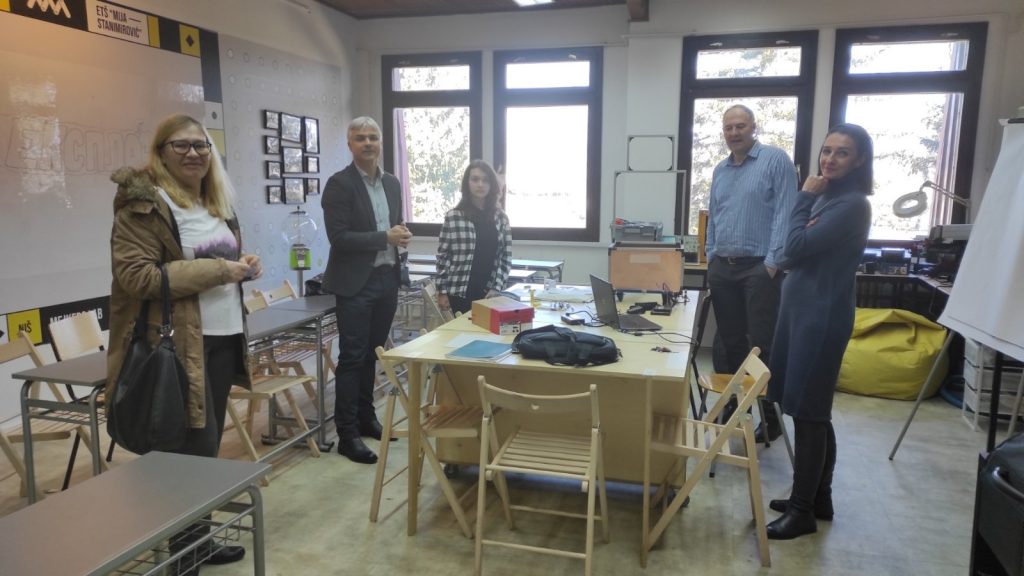
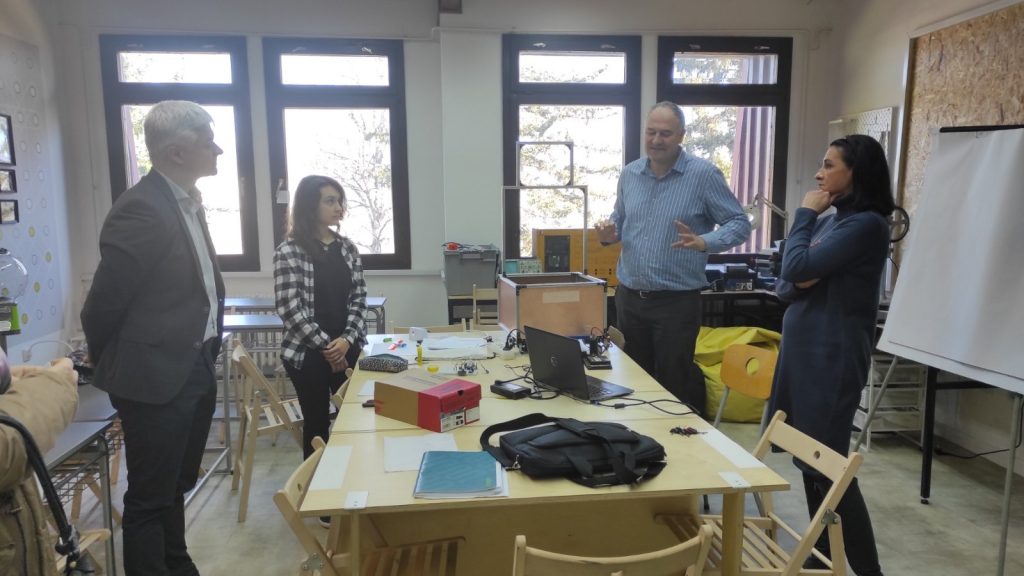
06. Collaboration with the Technical School „Mija Stanimirović“ in Niš
27.02.2024. On Tuesday, February 27th, a visit to this school was conducted, during which the school and its motivated students presented their projects in the newly equipped Makers Lab. The equipment in the lab is exceptional and offers a wealth of resources now available to the students and their teachers.
Within this dynamic collaboration with the Faculty of Electronic Engineering in Niš and colleagues from the Department of Microelectronics, the ambition is to revitalize a series of projects that will enhance technical education, practical knowledge, and research. The discussions during the visit were highly engaging, with numerous ideas on how to improve existing projects and achieve new goals. Some of the proposals include the creation of innovative robots and the extensive use of 3D printers, showcasing the great creativity of these young individuals. Additionally, the students had the opportunity to learn more about the Arduino competition organized by the SSCS society within the IEEE association, further fueling their passion for technology. During the visit, assistants from the Department of Microelectronics, Dr. Miloš Marjanović, Nikola Mitrović, and Sandra Veljković, were guests of the school.
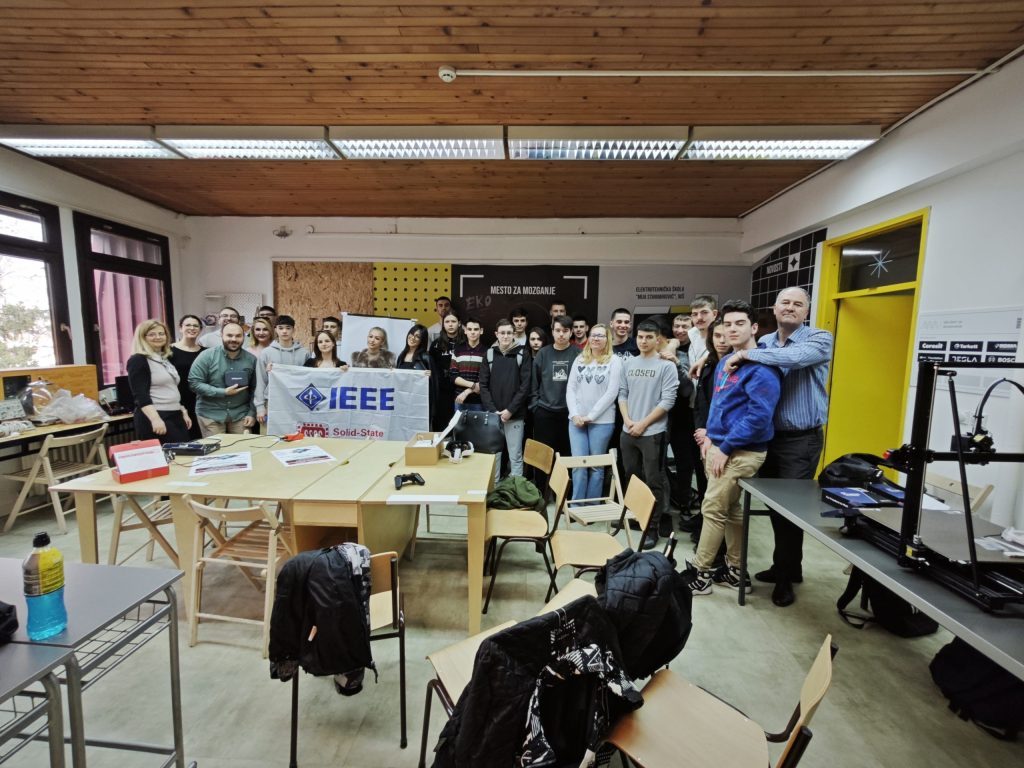
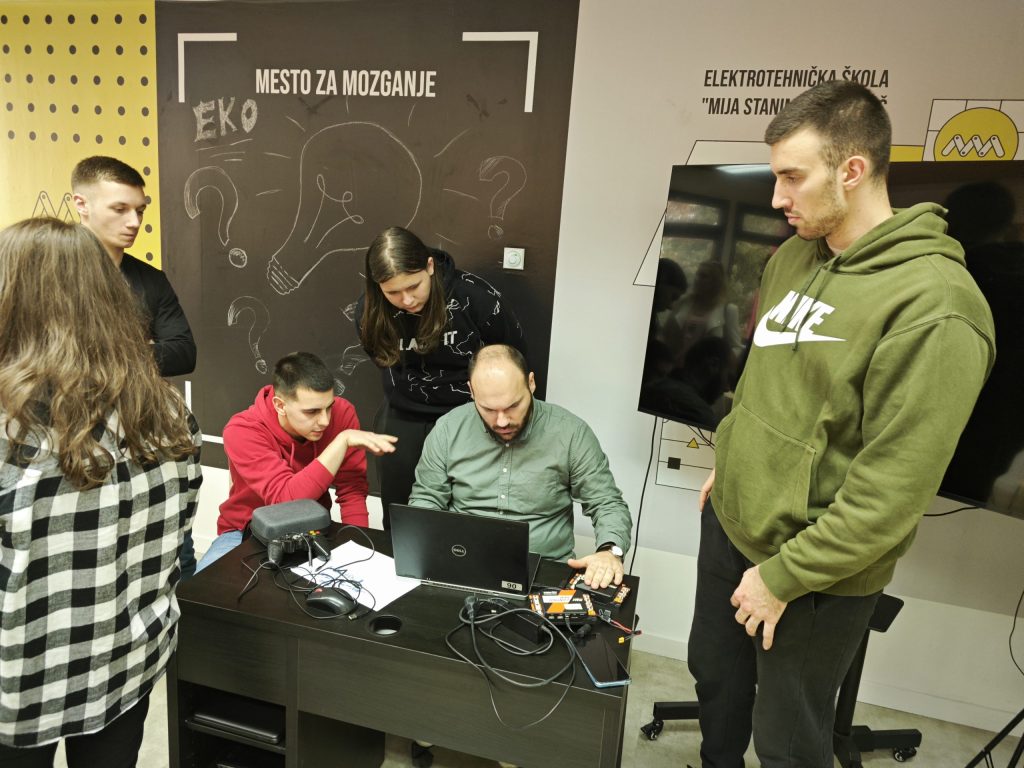
07. Workshop & Competition Report: RLC Meter
28.02.2024. On February 28th, 2024, a workshop on RLC meter implementation was held, fostering hands-on learning. Participants, including students and hobbyists, assembled and calibrated RLC meters under expert guidance. Challenges were overcome with collaborative effort. Nikola’s experience and mentorship were pivotal in project refinement and optimization. The team from Svetozar Markovic high school Nis prepared for an upcoming competition, utilizing the RLC meter project. Nikola Mitrovic’s leadership ensured efficient project development and testing. Overall, the workshop provided practical skills and collaborative experiences.
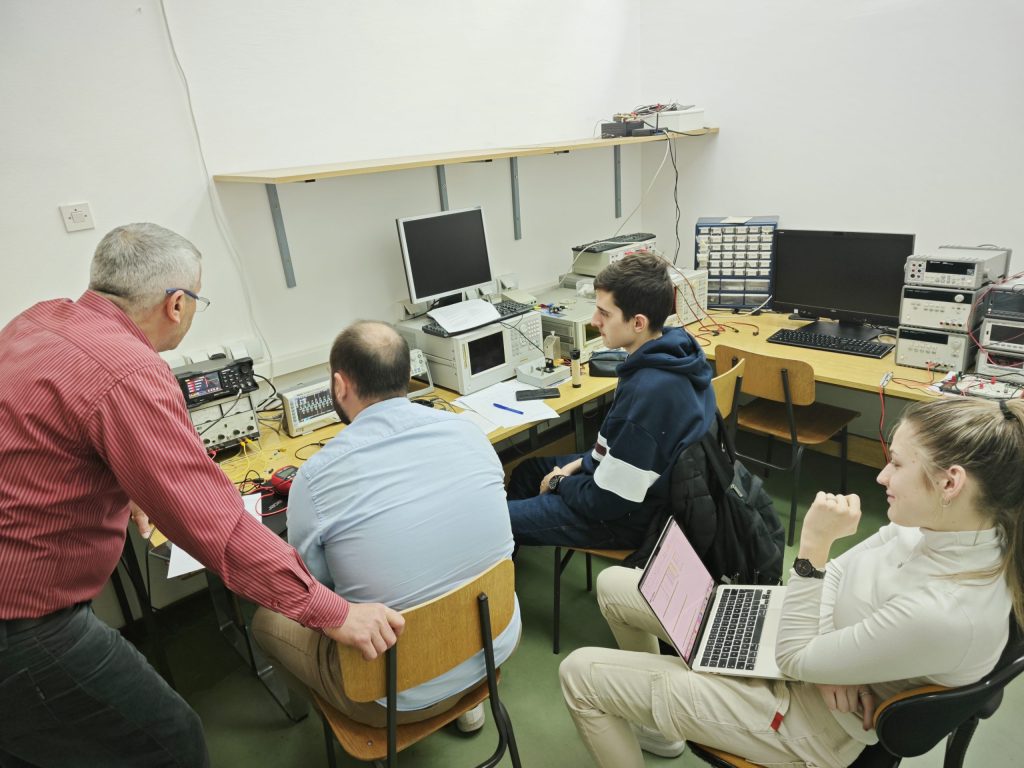
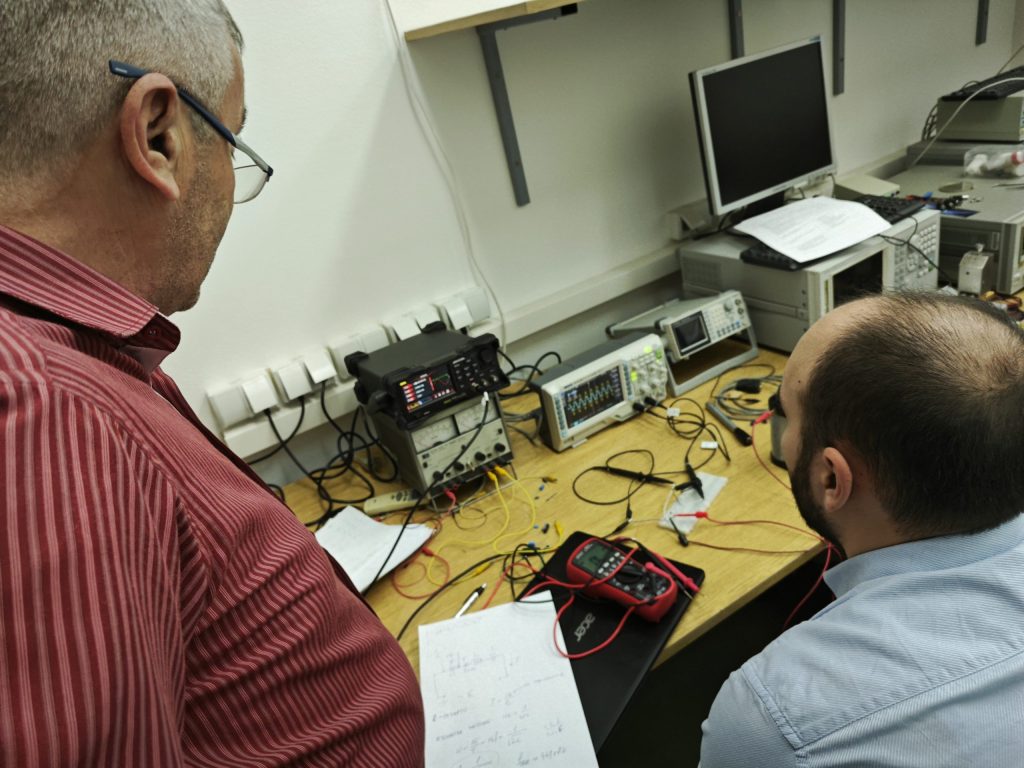
08. RLC meter project
02.03.2024. Following the workshop, teams transitioned seamlessly into competition preparation mode. Utilizing the skills and knowledge acquired, participants honed their RLC meter project for optimal performance. Nikola’s guidance continued to be invaluable, steering the team towards excellence. Rigorous testing and refinement were conducted to ensure readiness for the competition. The collaborative spirit fostered during the workshop persisted, enhancing productivity and fostering innovation. As the competition date approached, excitement and determination mounted among participants. The combined efforts and expertise propelled the project towards success, setting the stage for a promising outcome at the competition.
09. 3D Scanning and Printing
20.03.204. At the Technical School „Mija Stanimirović,“ a three-hour workshop on 3D scanning and printing was successfully conducted by an expert facilitator, Nikola Mitrovic. The workshop attracted enthusiastic participation from both students and faculty members, indicative of a keen interest in emerging technologies. Participants were introduced to the fundamentals of 3D scanning, including various scanning techniques and equipment. Practical demonstrations were provided, allowing attendees to witness the process firsthand and gain valuable insights into the intricacies of 3D modeling. Additionally, hands-on sessions were conducted, enabling participants to experiment with 3D printers and produce tangible objects from digital models. Feedback surveys were distributed at the end of the workshop to assess participant satisfaction and gather suggestions for future improvement. The overwhelmingly positive response from attendees underscores the value of such workshops in fostering technological literacy and innovation among students. Plans are already underway to organize similar workshops in April, ensuring continued engagement and learning opportunities for the school community.
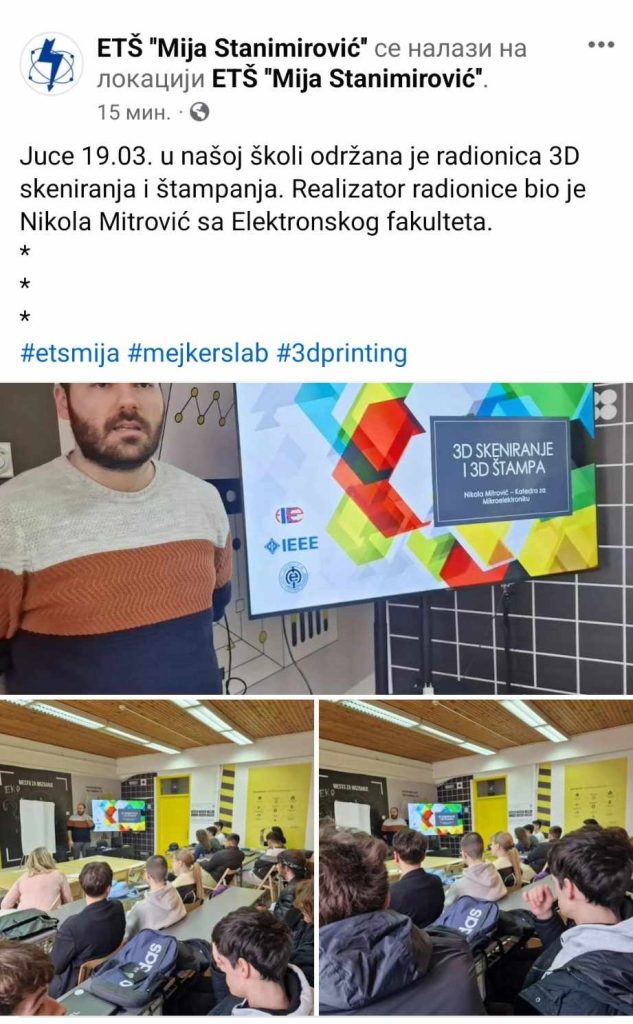
10. Galaksija Cup 2024
22-23.03.2024. The Galaksija Cup, a national competition for students of electrical engineering schools in the field of microcontroller and microcomputer applications, was held for the 8th time at the „Nikola Tesla“ School Center in Vršac from March 22 to 23, 2024. This year, 23 projects were presented, and over 50 students from 13 electrical engineering schools The second day of the competition was reserved for oral presentations of projects in front of the jury. The jury consisted of prof. Dr. Danijel Danković and Dr. Miloš Marjanović from the Department of Microelectronics, Faculty of Electronic Engineering in Niš, prof. Dr. Kalman Babković and Prof. Dr. Ivan Mezei from the Department of Energy, Electronics and Telecommunications, Faculty of Technical Sciences Novi Sad and Zoran Rončević, entrepreneur „R-Datagram doo“ Novi Sad. The event was covered by Radio Television Serbia and local media. Galaksija Cup 2024 was organized by the Ministry of Education of the Republic of Serbia, the Association of Electrical Engineering Schools of Serbia, ŠC „Nikola Tesla“ Vršac with the support of the Nordeus Foundation, Continental Automotive Serbia doo Novi Sad, „Mehatronika“ magazine, FTN Novi Sad and the Faculty of Electronic Engineering Niš.
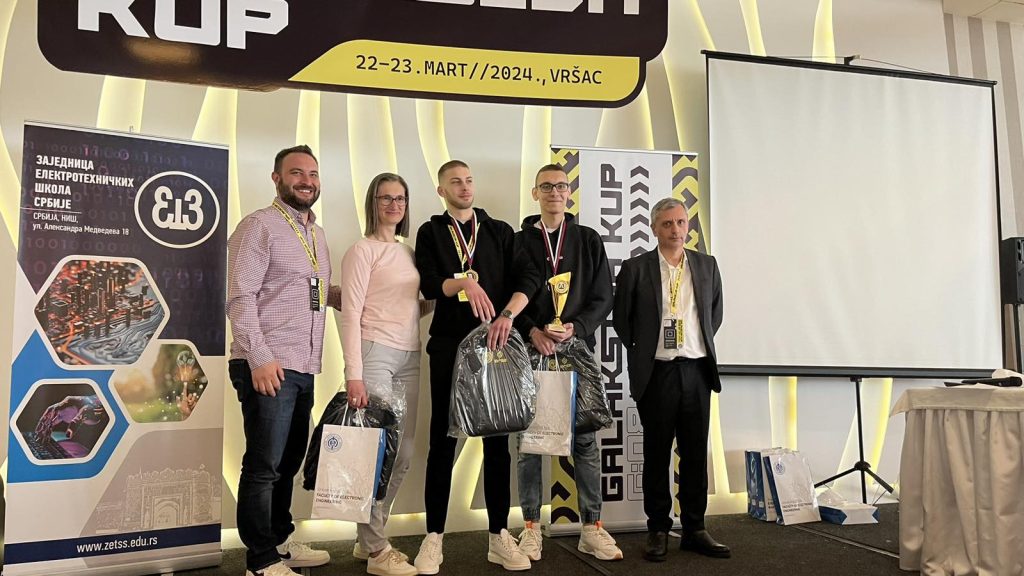
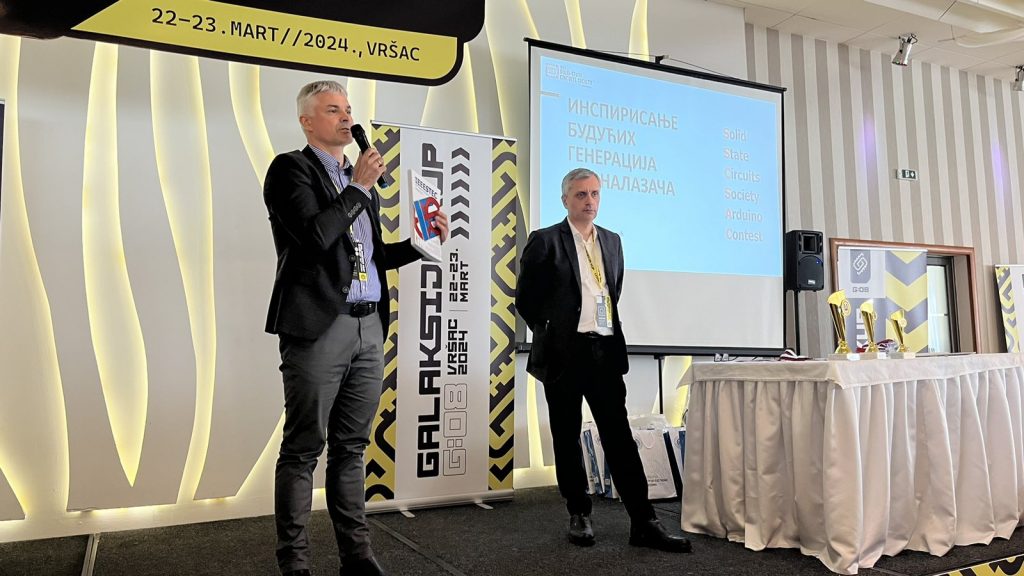
11. Introduction to Arduino Course
08.04. 2024. On Monday, April 8th, 2024, an introductory workshop was held as part of the Arduino course at the Faculty of Electronic Engineering in Niš. The workshop aimed to familiarize participants with the basic concepts of electronics and programming and provide them with initial practical steps in working with the Arduino platform. Throughout the workshop, the focus was on the use of pull-up and pull-down resistors, buttons, LED diodes, and corresponding resistors. We began with a brief introduction to Arduino – an open-source platform for electronics and programming, enabling easy prototyping of various projects. Participants were introduced to basic electronics concepts, including circuitry, resistance, voltage, and current. The purpose and application of pull-up and pull-down resistors in electronic circuits were explained. We demonstrated how these resistors are used to stabilize signals at the inputs of microcontrollers like Arduino. Participants had the opportunity to work with buttons and connect them to the Arduino board. We explained how buttons are used for detecting pressing and releasing events, as well as how these signals are processed programmatically. Participants were acquainted with the basic characteristics of LED diodes and the need for using resistors with them. We demonstrated how LED diodes are connected to the Arduino board and how they are controlled through the programming code. In the practical part of the workshop, participants had the opportunity to independently connect a button to the Arduino board and program it to detect button presses and respond accordingly. They also performed a similar task with an LED diode, programming Arduino to blink the diode at a certain interval. The introductory workshop of the Arduino course was successful in its purpose to familiarize participants with the basics of electronics and programming and equip them to work with the Arduino platform. Through theoretical and practical work with pull-up and pull-down resistors, buttons, LED diodes, and corresponding resistors, participants gained a fundamental understanding of the operation of these components and their integration into electronic projects.
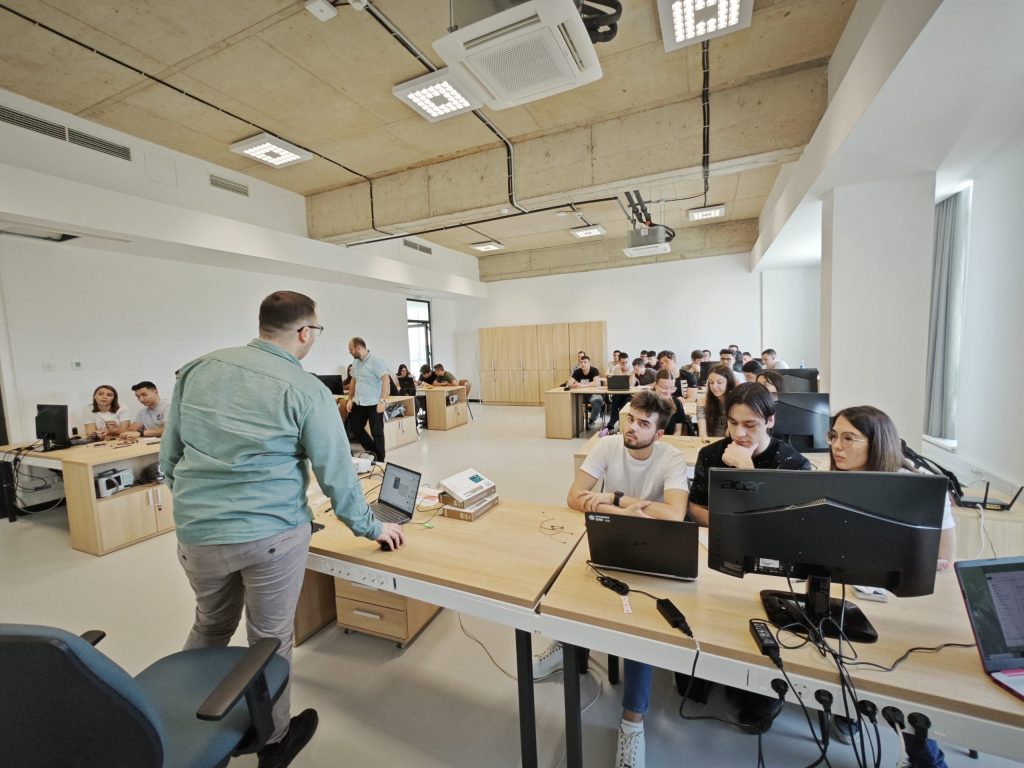
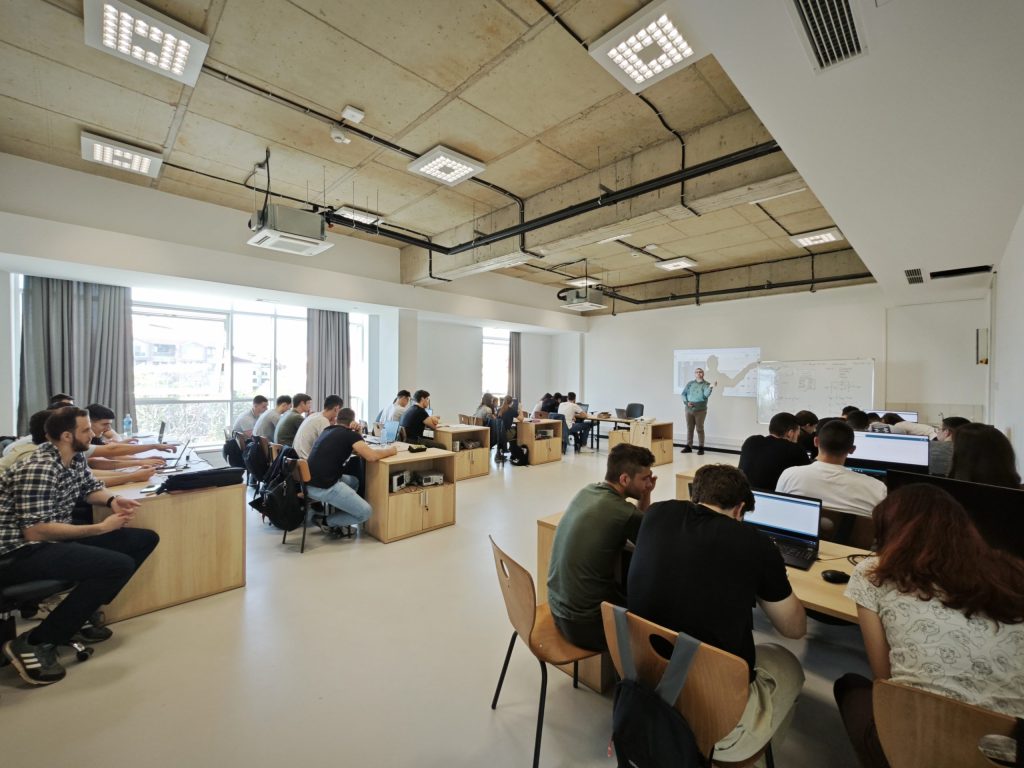
12. The Electronics Engineering Cup
11-12.04.2024. The Electronics Engineering Cup serves as a pivotal event uniting both high school students and undergraduates, fostering an environment for learning and competition within the realm of electronic circuit design analysis and printed circuit board (PCB) design. Hosted in the second week of April at the Faculty of Electronic Engineering Niš, the educational segment of the Electronics Engineering Cup provided an inspiring program. Attendees, involving excited high school students and university scholars, were given to a series of educating lectures delving into the details of power sources and communication protocols. Of particular significance were the detailed discussions on routing rules governing these circuits on PCBs.
The speaker on these educational sessions was the Master Engineer Aleksandar Stefanov from Novi Sad, who explained the complexities of the subject matter. Among the participants were students enrolled in the Electronic Components and Microsystems module, with junior engineers specializing in PCB design from the DMV company based in Niš. Additionally, the event welcomed the presence of students and professors from the ETŠ „Nikola Tesla“ in Niš, further enriching the collaborative atmosphere.
Following the educational activities, the month of May is reserved for hackathon dedicated to the PCB design. This competition is poised to serve as a local preliminary round for the esteemed European TIE competition, a tradition reaches over two decades and held in the city of Sibiu, Romania. The Electronics Engineering Cup will be organized by the Department of Microelectronics and the IEEE Student Branch Niš, in close collaboration with the lecturer, Aleksandar Stefanov. Together, they have planned an event that not only educates but also inspires the next generation of electronic engineering stars.
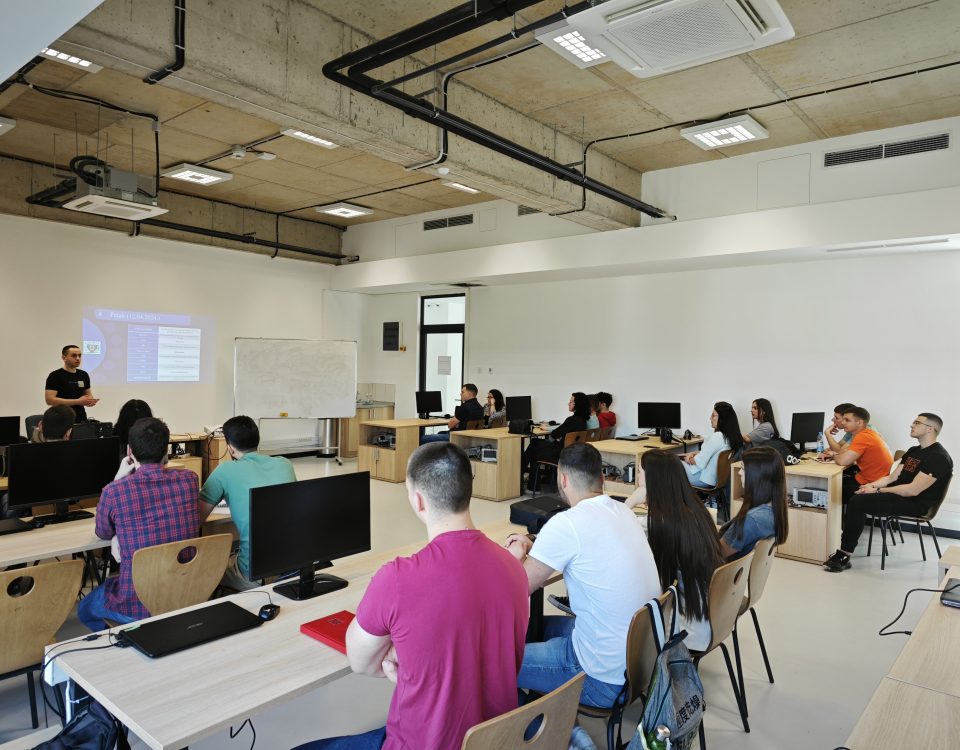
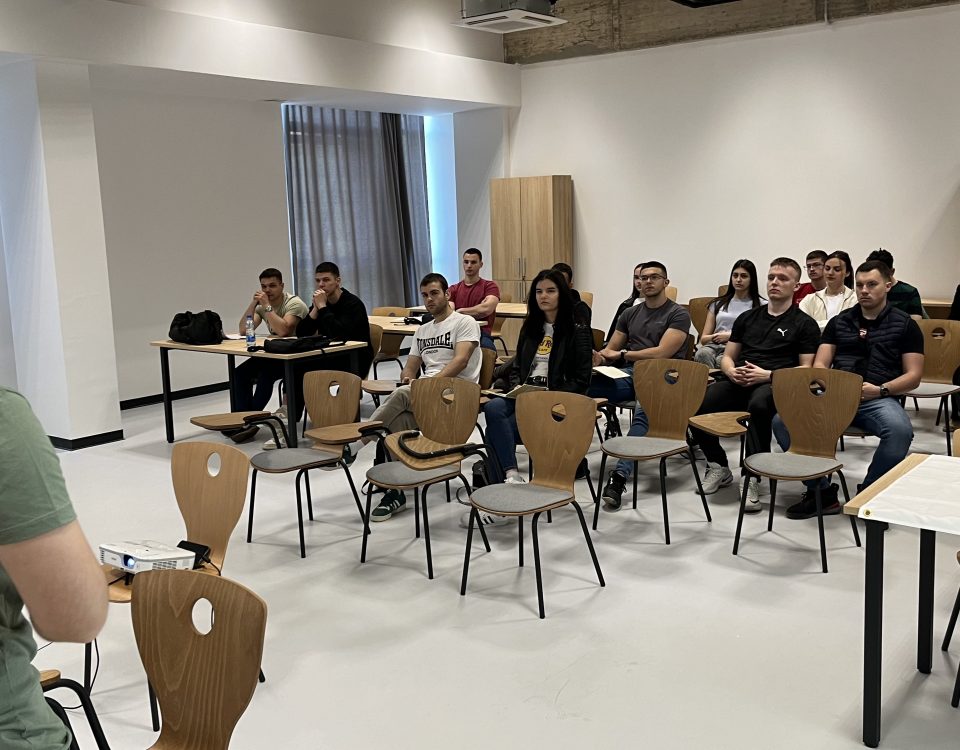
13. Arduino course 2. workshop
16.04.2024. On Tuesday, April 16th, the second Arduino workshop was conducted. During this workshop, participants had the opportunity to learn more about serial communication. At the outset, participants reviewed basic aspects of the Arduino development environment, such as analog and digital pins and their differences, as well as input and output pins. However, in this exercise, the implementation of serial communication commands was introduced, and the serial monitor was utilized to display data contained within the code. Assistant Nikola Mitrovic led this workshop, with assistance from Associate Professor Miloš Marjanovic, Assistant Sandra Veljkovic, Stefan Nikolic, and Nikola Petkovic.
The session began with a theoretical overview of serial communication principles, followed by practical demonstrations and hands-on exercises. Participants were guided through the process of establishing serial communication between Arduino and a computer using USB. They learned how to send data from Arduino to the serial monitor and vice versa, enabling real-time monitoring and interaction with the microcontroller.
In the practical part of the workshop, participants implemented serial communication in their Arduino projects, exchanging data between the microcontroller and the computer. They were able to observe the transmitted data in the serial monitor and analyze its behavior, thus gaining a deeper understanding of serial communication concepts.
Overall, the workshop was successful in expanding participants’ knowledge of Arduino programming and introducing them to the essential concept of serial communication. The collaborative effort of the instructors and assistants ensured a smooth and informative learning experience for all participants.
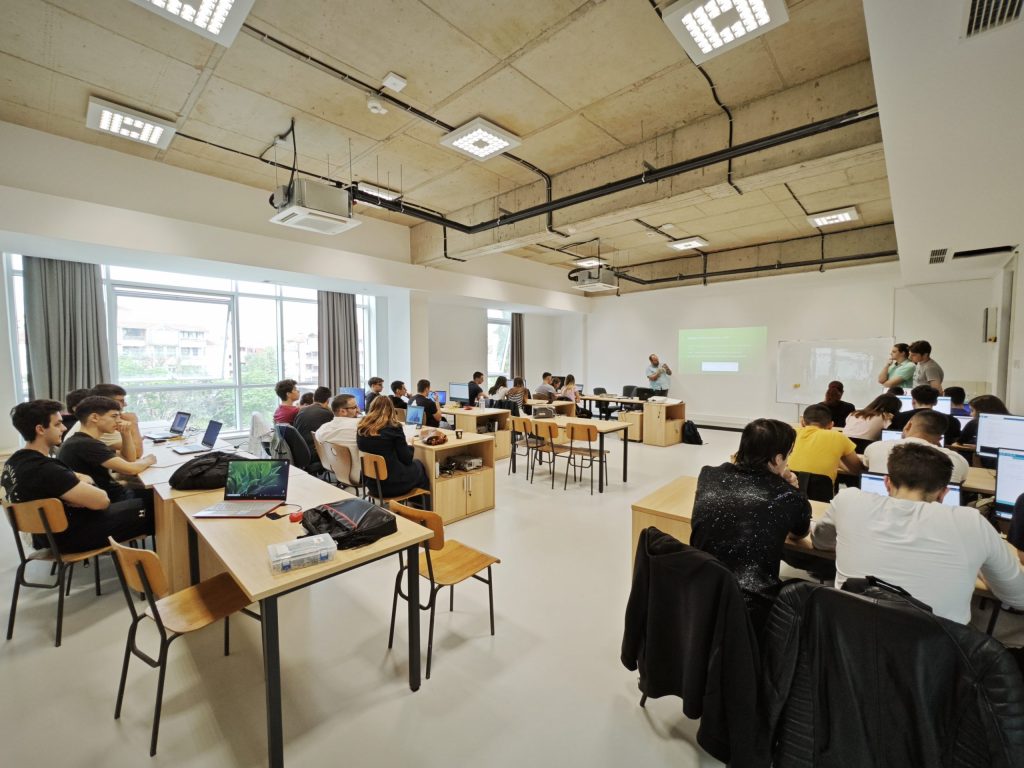
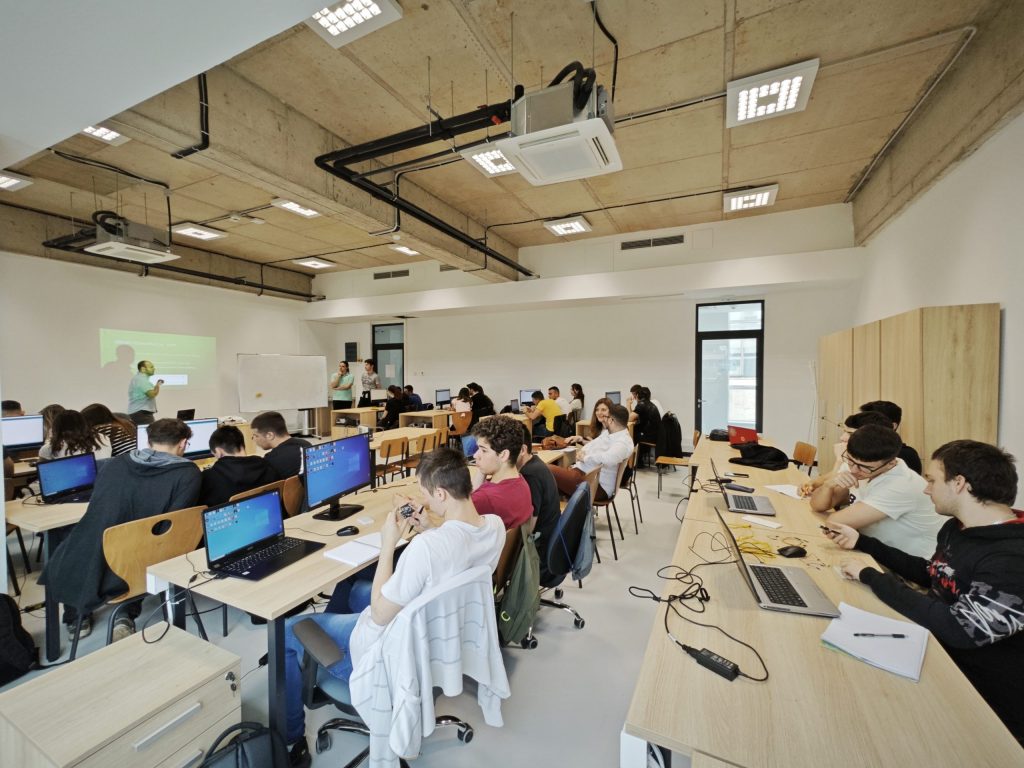
14. The IEEE Education Week at the Faculty of Electronic Engineering Niš
16.04.2025. The week behind us was declared as Education Week by IEEE – the Institute of Electrical and Electronics Engineers. Members of the Microelectronics Department, active IEEE volunteers, organized two events as part of the „Education Week“.
On Tuesday, April 16th, the Arduino course for first-year students continued. This week, students learned about serial communication, specifically about UART in Arduino. They practically implemented an Arduino project enabling communication between Arduino and a computer bidirectionally. The workshop was led by Nikola Mitrović.
On Thursday, April 18th, guests at our teaching laboratory were eighth-grade students from „Car Konstantin“ Elementary School in Niš, along with their teacher Marijana Perović. Students learned new concepts in the field of microelectronics, and in the practical part of the workshop, they implemented and tested the operation of a transistor circuit for driving a DC motor on a prototype board. According to the survey feedback, they were most impressed by the result of successfully powering the motor and measuring the current flowing through it. The workshop was led by Miloš Marjanović and Sandra Veljković.
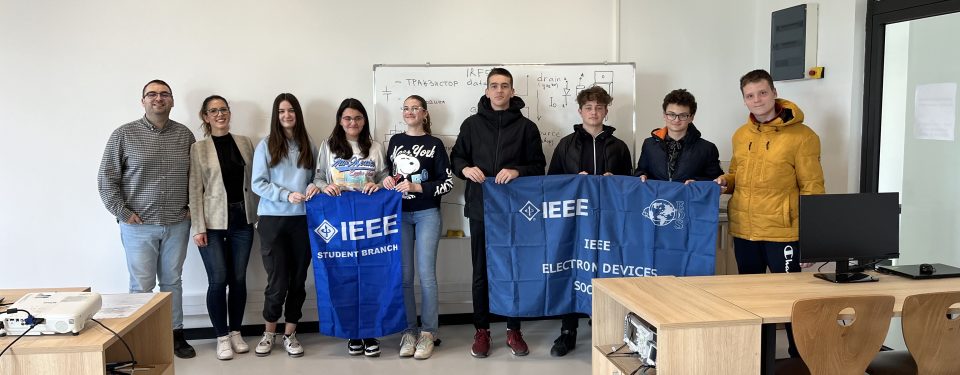
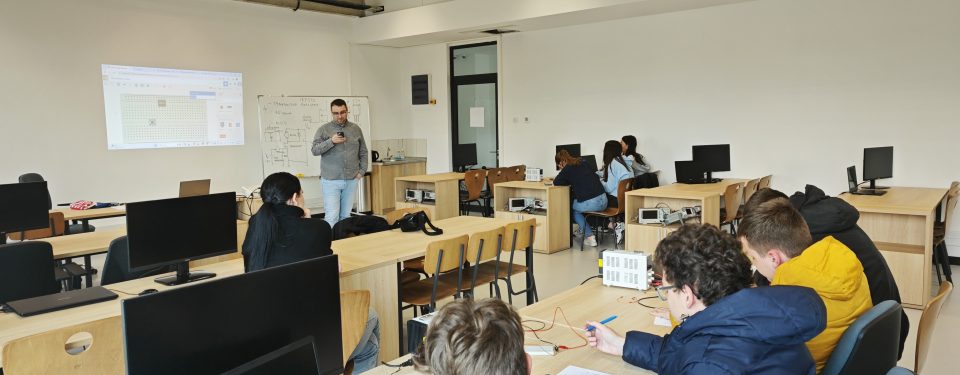
15. Advanced 3D Modeling and Printing Techniques
18.04.2024. Scheduled for later this month, this workshop will delve deeper into the intricacies of 3D modeling software and advanced printing methodologies. Participants will have the opportunity to explore popular software tools used in 3D modeling, such as Blender and Tinkercad, and learn advanced techniques for creating complex designs. Practical sessions will provide hands-on experience with advanced printing technologies, including resin-based and multi-material printing. Participants will learn how to optimize their designs for different printing methods and troubleshoot common issues encountered during the printing process. Additionally, the workshop will explore innovative applications of 3D printing in various industries, from healthcare to automotive engineering.
16. Analog-to-Digital Conversion (ADC) Workshop within Arduino Course
22.04.2024. As part of the ongoing Arduino course at the Faculty of Electronic Engineering, a workshop focusing on Analog-to-Digital Conversion (ADC) was held on Thursday, April 18th. The workshop, designed to supplement the curriculum and provide practical insights into ADC principles, was well-received by participants.
Theoretical concepts were reinforced through hands-on activities, where participants learned to interface analog sensors with Arduino boards and perform ADC conversions. Practical demonstrations showcased the process of reading analog signals, converting them to digital values, and utilizing the data in Arduino sketches. Throughout the workshop, instructors provided guidance and support, assisting participants in troubleshooting issues and optimizing ADC performance. Participants were encouraged to experiment with different sensor configurations and ADC settings to gain a deeper understanding of ADC operation.
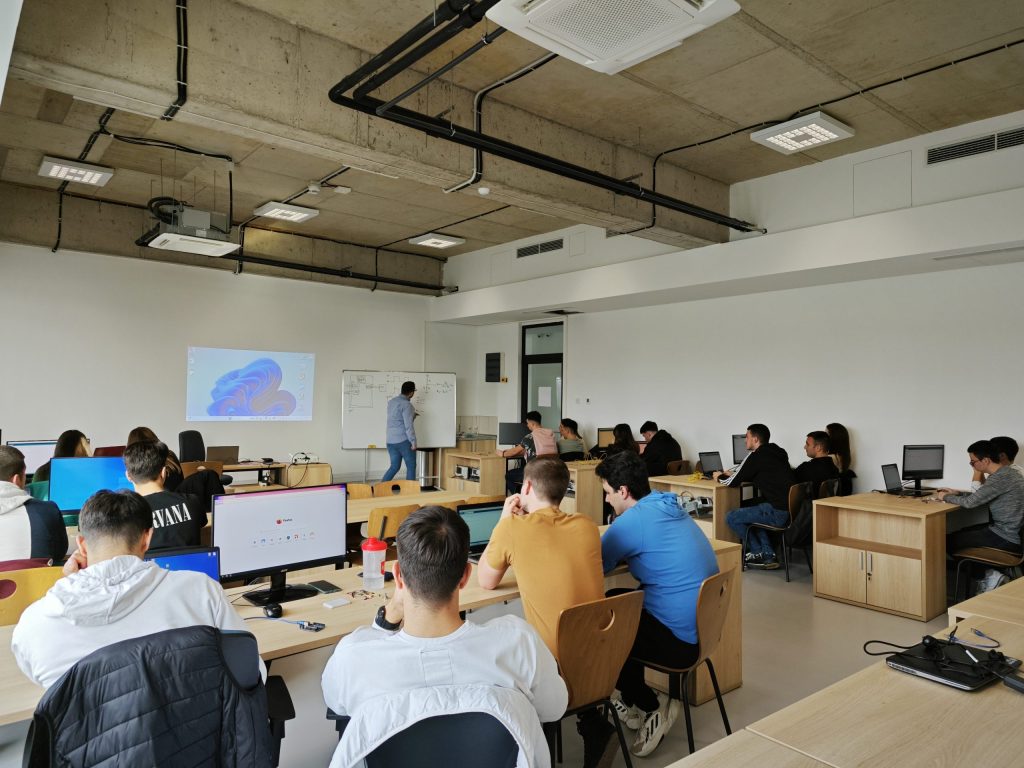
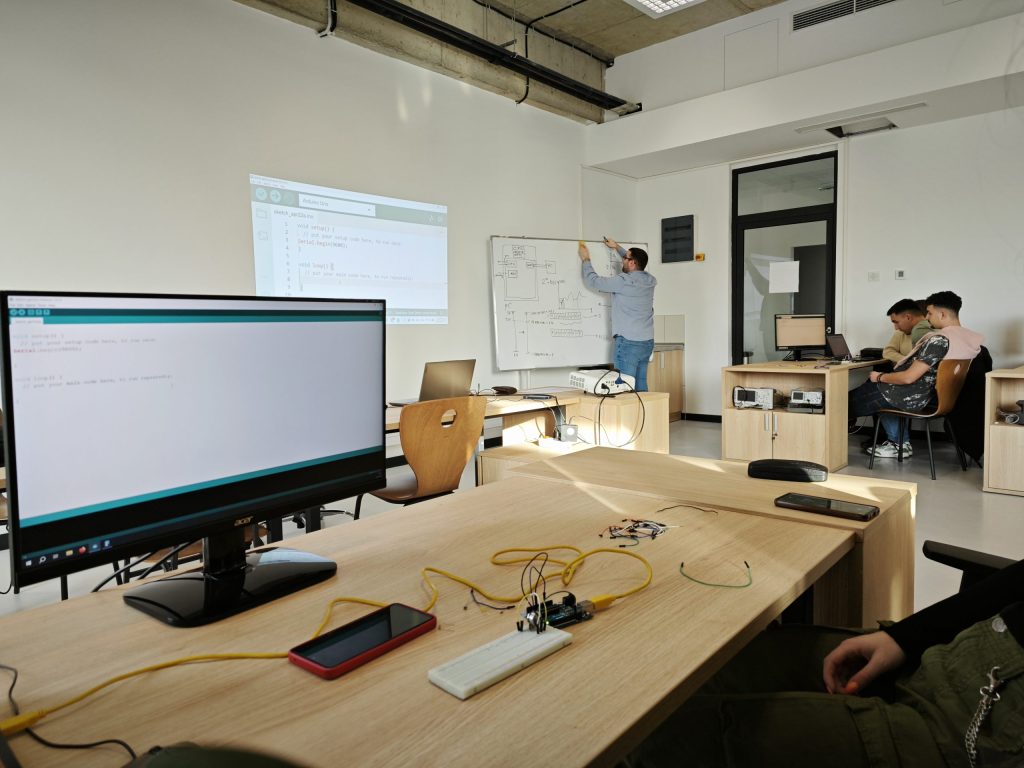
17. Introduction to RGB LEDs and Their Applications
23.04.2024. During the recent Open Day event at the Faculty of Electronic Engineering, a specialized workshop was organized for students from outside Niš. The workshop focused on RGB LEDs and their versatile applications in modern electronics and lighting systems. Led by experienced instructors, the workshop began with an overview of RGB LED technology, explaining the principles of color mixing and control. Participants were introduced to the concept of additive color mixing and the role of red, green, and blue LEDs in producing a wide range of colors. Practical demonstrations showcased various applications of RGB LEDs, including mood lighting, visual displays, and decorative lighting effects. Participants had the opportunity to experiment with RGB LED modules and control them using microcontrollers such as Arduino. Hands-on activities allowed participants to create their own RGB LED projects, learning how to program dynamic lighting effects and sequences. By manipulating RGB color values and adjusting brightness levels, participants gained insights into the creative possibilities offered by RGB LEDs.
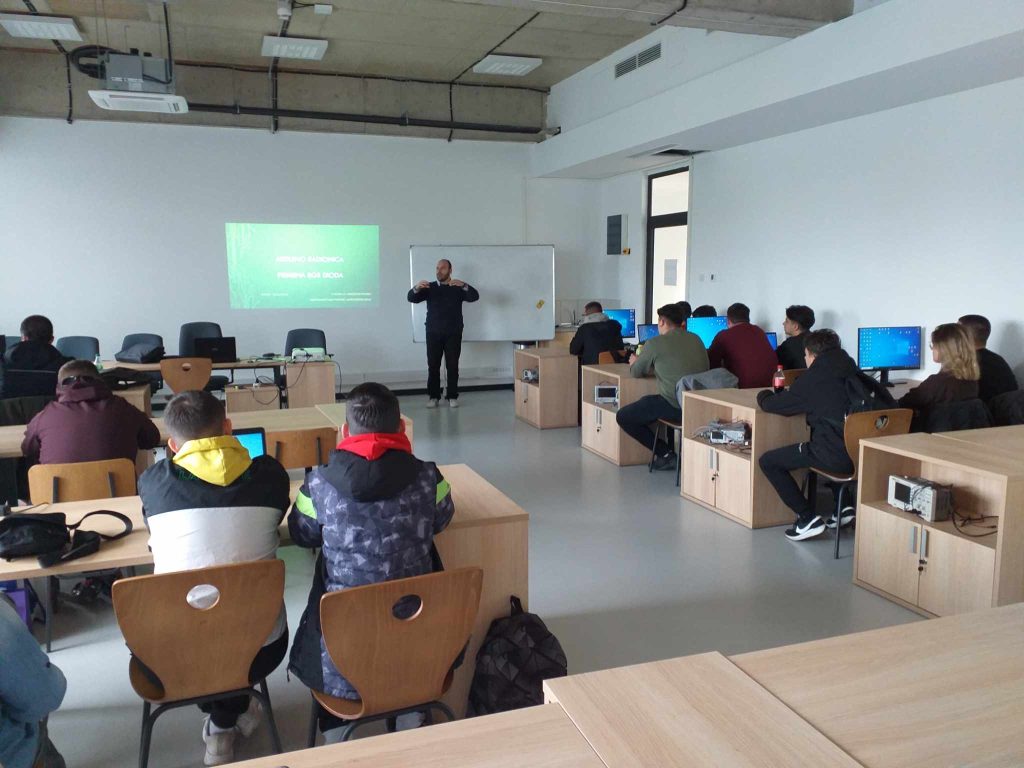
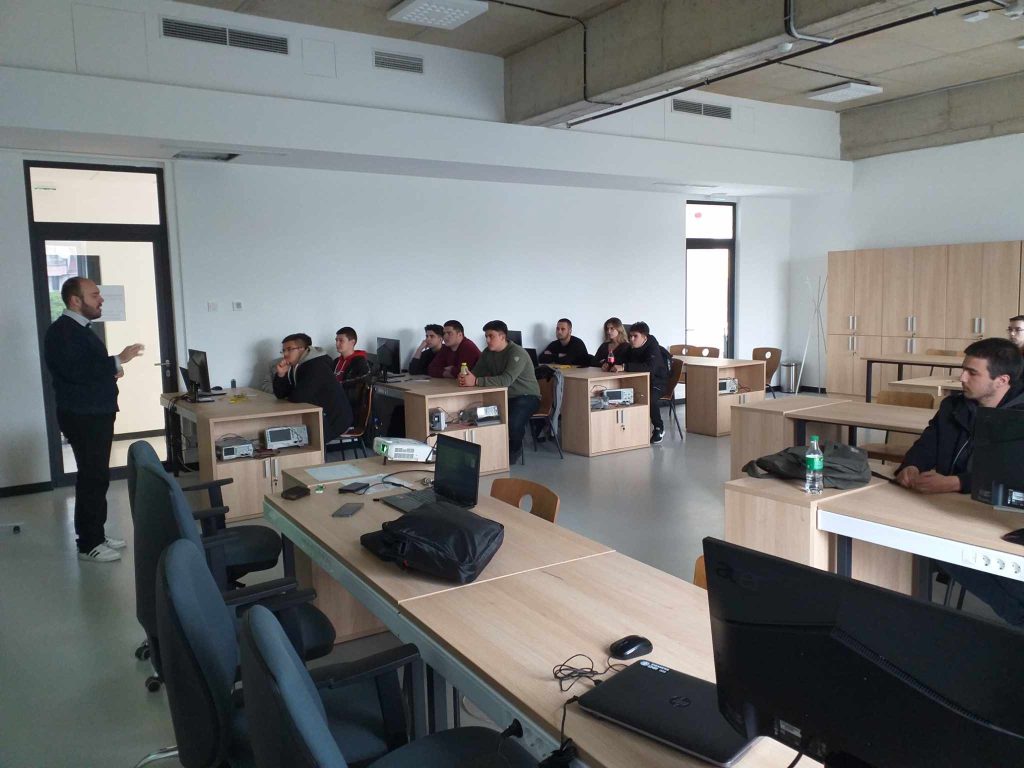
18. Quiz at Grammar school Bora Stankovic
09.05.2024. And throughout the month of May, the implementation of the STEM project „From Idea to Impact: Launching the IEEESTEC Conference“ continues, supported by the IEEE and EDS associations. Workshops have been conducted with students from the „Svetozar Marković“ Gymnasium in Niš and the Technical School „Mija Stanimirović“ in Niš, with some workshops being held in the laboratories of the Faculty of Electronic Engineering and others in their premises. On Thursday, May 9th, the project was expanded to include the „Bora Stanković“ Gymnasium in Niš, where two classes had the opportunity to participate in this project. The project was presented to the students, explaining the concept of workshop implementation, and then they had the opportunity to participate in a quiz to qualify for attending the workshops. As part of the quiz, students could test their knowledge of physics. We also owe a great deal of gratitude to the physics teacher, Vladana Golubović, who facilitated the school visit. Additionally, students who attend the workshops will write papers for the IEEESTEC conference, which will be held on the last Thursday in November. The team implementing this project consists of Prof. Dr. Danijel Danković, Prof. Dr. Emilija Živanović, Assoc. Prof. Dr. Miloš Marjanović, Assistant Nikola Mitrović, and Assistant Sandra Veljković.
19. Arduino course 4
10.05.2024. Within the Arduino course framework, a workshop dedicated to RGB LEDs was conducted. Led by experienced instructors, the workshop aimed to familiarize participants with RGB LED technology and its applications. Participants learned about the principles of RGB color mixing and control. Practical demonstrations allowed attendees to experiment with RGB LEDs and create dynamic lighting effects. The workshop covered topics such as interfacing RGB LEDs with Arduino boards and programming them to display various colors. Hands-on activities enabled participants to gain practical experience in controlling RGB LEDs. Feedback from participants indicated a high level of engagement and interest in the topic. The workshop was led by Nikola Mitrović
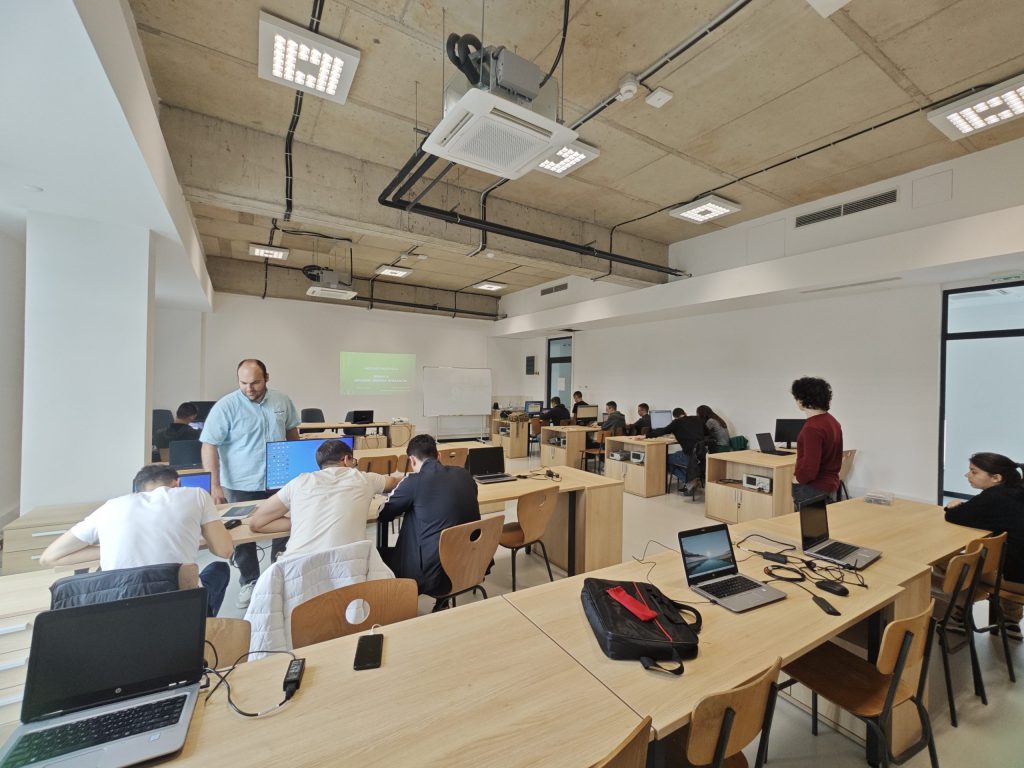
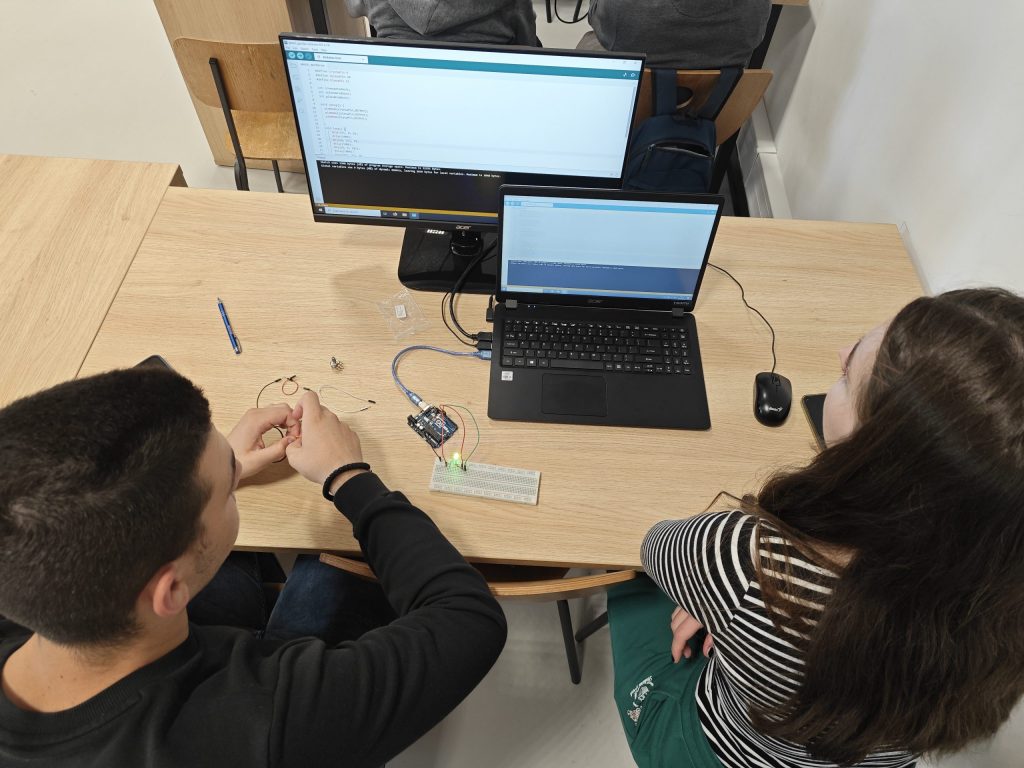
20. Arduino Workshop 5
20.05.2024. On Monday, May 20th, the fifth Arduino workshop in the current cycle was successfully conducted. Participants were engaged in an interactive session focusing on working with a piezo buzzer, which modulated its frequency based on distance variations. The exercise incorporated real-time data visualization, with diverse values displayed on the serial monitor. Furthermore, the workshop advanced to include the utilization of an LCD display, effectively showcasing the outcomes of the experiment. Attendees were tasked with activating and integrating the LCD, configuring backlight settings, and inputting data into the LCD’s second row. The workshop fostered hands-on learning, enabling participants to gain practical experience in interfacing multiple components and sensors with Arduino boards. Facilitators provided individual guidance, ensuring that each participant comprehended the concepts and techniques introduced during the session. Participants actively engaged in troubleshooting exercises, enhancing their problem-solving skills in Arduino programming and circuitry design. Feedback forms were distributed at the conclusion of the workshop to gather insights for improving future sessions. Overall, the workshop served as an invaluable learning opportunity, empowering participants to further explore the potential of Arduino technology in their projects and endeavors.
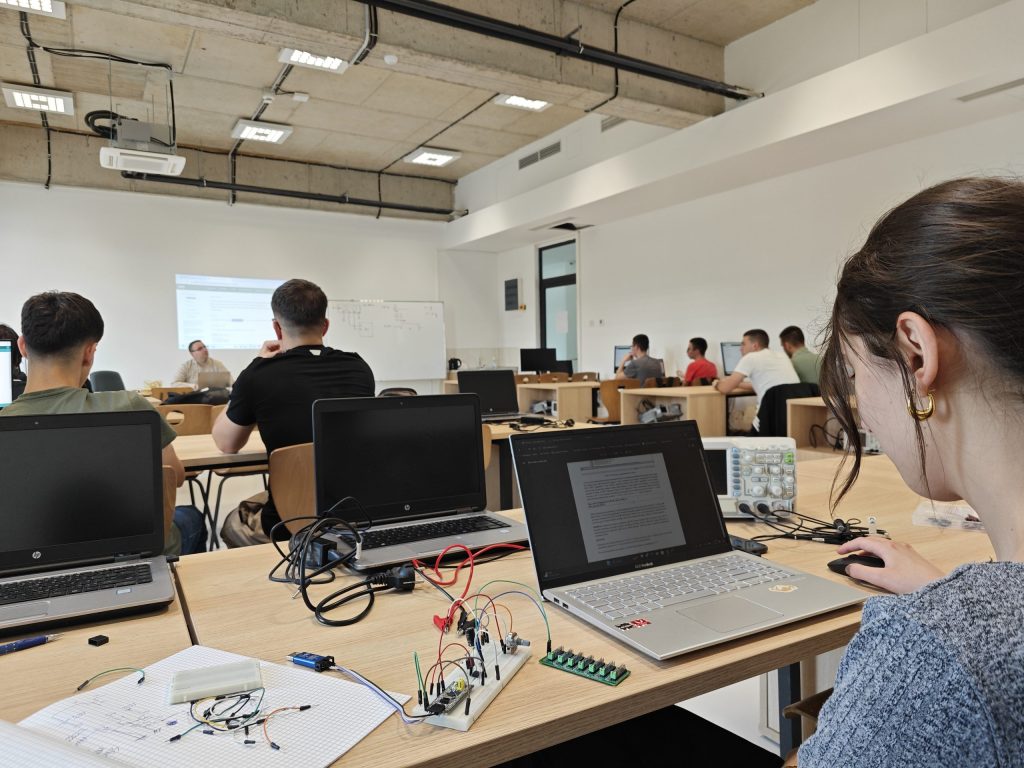
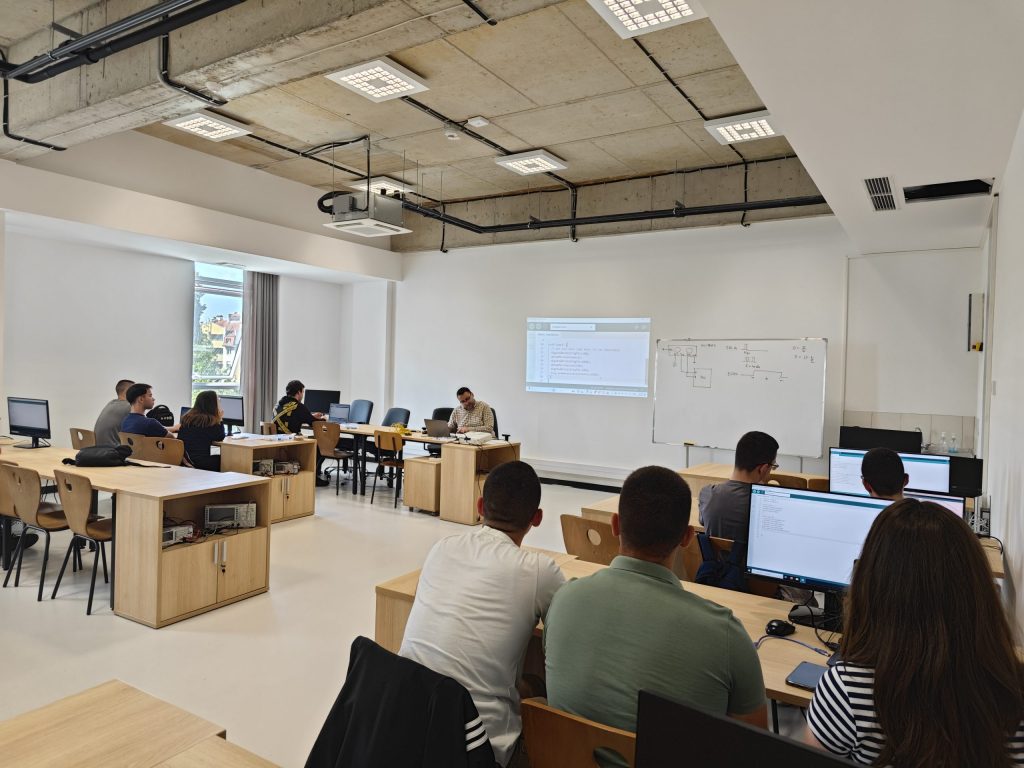
21. ARM Microcontroller Programming
22.05.2024. On Wednesday, May 22nd, the continuation of the STEM project „From Idea to Impact: Launching the IEEESTEC Conference“ took place. We welcomed guests from the third grade of Bora Stanković High School in Niš to our laboratory. During the two-hour workshop, students were introduced to the fundamentals of ARM microcontroller programming. The session was led by Assistant Professor Miloš Marjanović. The next step entails working on a project centered around the ARM microcontroller, which will be showcased at the upcoming IEEESTEC conference. This workshop aimed to equip students with practical programming skills and foster their interest in microcontroller-based projects. The engagement and enthusiasm displayed by the students underscored the success of the workshop in achieving its objectives. Feedback from both students and instructors will be utilized to enhance future sessions and ensure continuous improvement in STEM education initiatives. The active participation of students reflects the effectiveness of hands-on learning experiences in nurturing technological proficiency among young learners. Overall, the workshop served as a stepping stone for students to delve deeper into the realm of microcontroller programming and innovation..
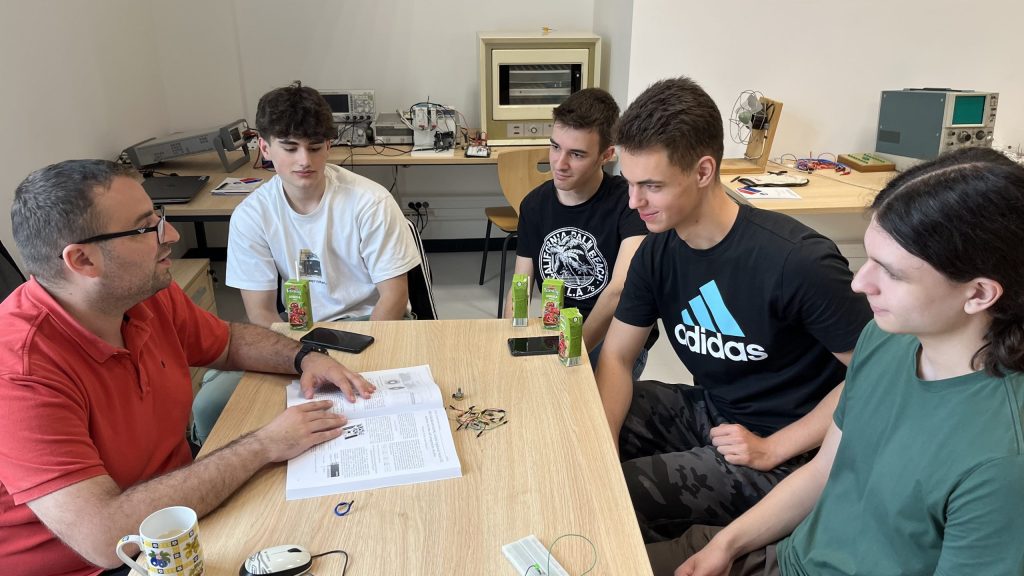
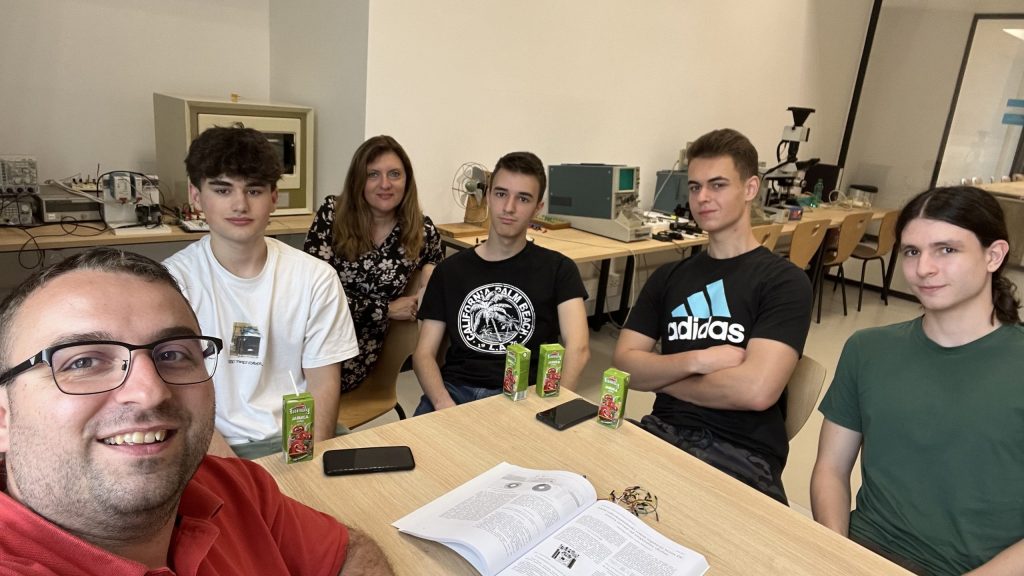
22. Another Successful Arduino Course Completed
30.05.2024. Another cycle of Arduino workshops has been completed. Throughout April and May, seven sessions of two hours each were organized at the multipurpose building of the Faculty of Electronic Engineering in Niš. The workshops were extremely successful, providing students with the opportunity to gain practical knowledge. Through theoretical and practical exercises, around thirty participants mastered the basics of working with electronic components and sensors, as well as the fundamentals of programming in the Arduino environment.
The course was attended by 36 first-year students. During the workshops, participants had the chance to learn in detail and work practically with various components. One of the most interesting sessions was on controlling servo motors. Students learned how to adjust the rotation angles of the motors. This skill is particularly useful in developing various robotic systems and automation. Additionally, participants were able to get acquainted with the operation of displays. LCD displays are very useful for displaying information in many projects, and students learned how to display text and special characters on these screens. As part of the workshops, students also had the opportunity to familiarize themselves with ultrasonic sensors. These sensors are useful for measuring distance and detecting obstacles. Students learned the principle of sensor operation and how to interpret measured values. Additional attention was given to buttons, LEDs, RGB LEDs, piezo buzzers, and the application of MOS transistors. At the end of the Arduino workshops, participants were extremely satisfied with their achievements and the progress they made.
The organizational team was a crucial factor in the success of these workshops. Professor Emilija Živanović led the team with her expertise and experience and provided support to the students throughout the course. Miloš Marjanović and Nikola Mitrović stood out as exceptional lecturers, with rich practical experience in working with the Arduino development environment. Assistant Sandra Veljković and students Karolina Živković, Jovan Urošević and Dusan Arsic also participated in the workshops, and their involvement contributed to the success of this project. All team members put in significant effort and energy to provide a quality experience for the participants.
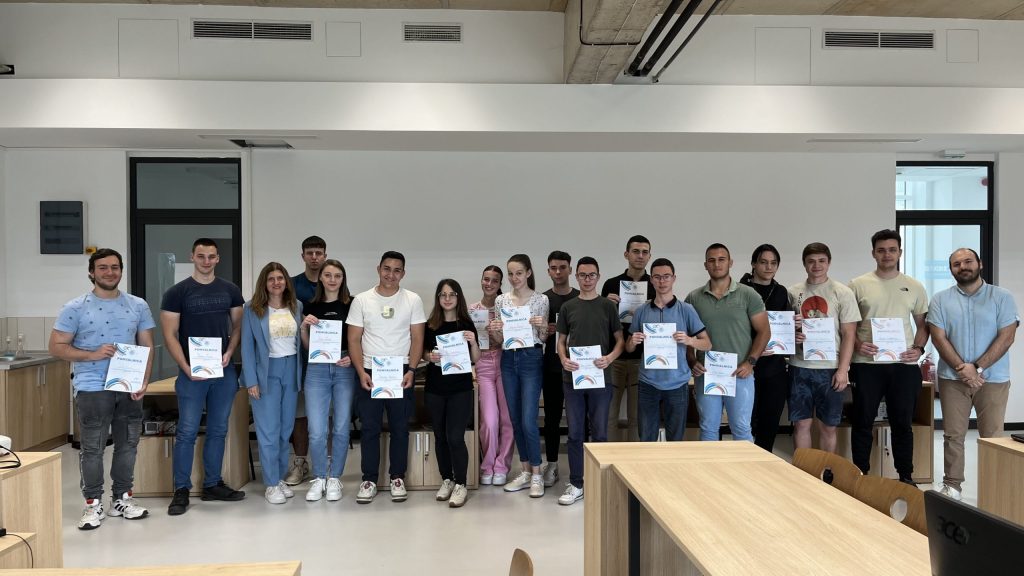
23. Final of the „Electronics Engineering Cup“
06.06.2024. The final of the printed circuit board design competition „Electronics Engineering Cup“ was held on Thursday, June 6, 2024, at the Faculty of Electronics in Niš. The 12 finalists worked for 4 hours on a task that involved designing an electrical schematic for a device, selecting suitable electronic components according to given criteria, and routing the printed circuit board. The competition was organized by the Department of Microelectronics of the Faculty of Electronic Engineering in Nis in collaboration with the Association of Professionals in Science, Engineering, and Education (UP-SEE: Up-Skill Engineering Education) and the IEEE student branch of the University of Niš. Valuable prizes for all finalists were provided by the competition sponsors HTEC Group, Mikroe, and Tenstorrent..
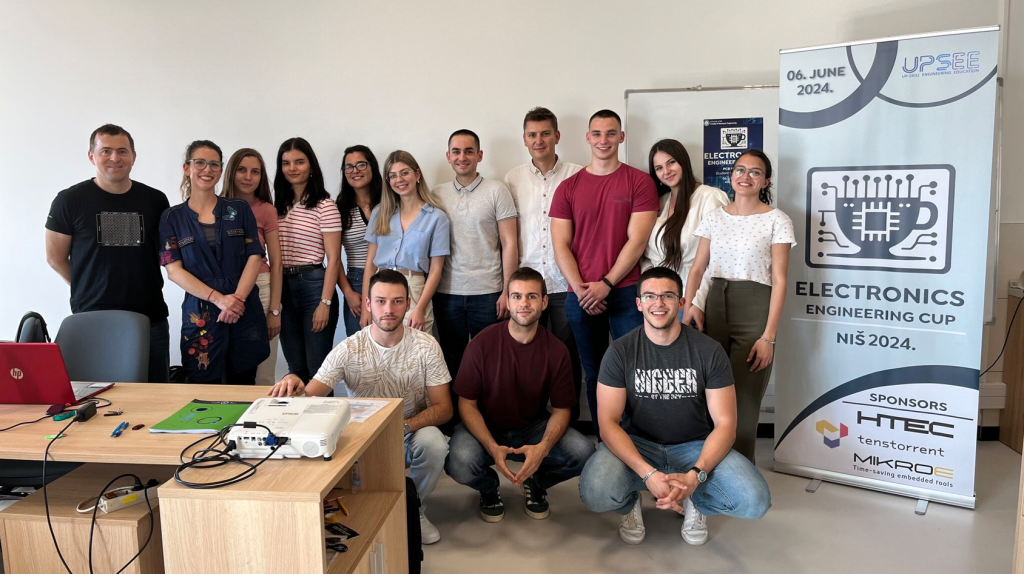
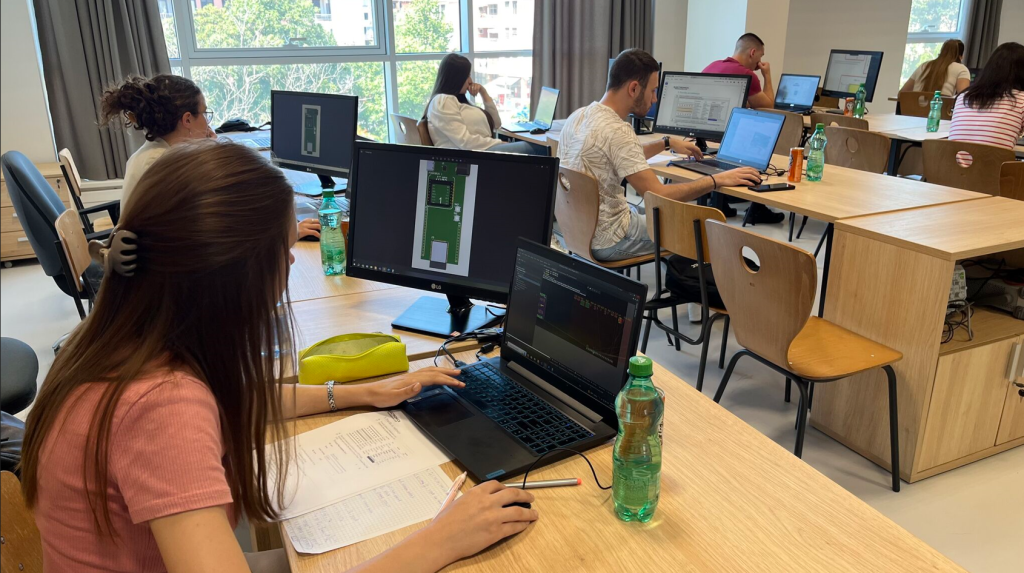
24. Final Workshop at ETŠ „Mija Stanimirović“: 3D Scanner Stand
13.06.2024. In June 2024, a successful five-hour final workshop was held at the Electrotechnical School „Mija Stanimirović“, marking the culmination of a multi-month cycle of educational activities dedicated to creating a stand for 3D scanning. This workshop cycle, which began on March 18, 2024, aimed to provide students with hands-on experience in designing and fabricating tools. These workshops were conceived and led by teaching assistant Nikola Mitrović. During the final workshop, work was carried out successively with three groups of students, guiding them through the final steps in the creation and assembly of the 3D scanner stand. Each group demonstrated remarkable dedication and innovation, contributing their unique ideas and skills to the final product. Through group work, the students gained detailed knowledge of 3D modeling techniques, the application of engineering principles, and the practical aspects of assembly and equipment testing.
This project was more than a technical exercise; it provided students with the opportunity to apply theoretical knowledge in practice, develop teamwork skills, and tackle real-world engineering problems. Additionally, the workshops served as a platform for creative thinking and innovation, resulting in a solution that will contribute to the educational process in the long term. All workshops were conducted as part of the project “From Idea to Impact: Launching the IEEESTEC Conference,” which has been actively ongoing since the beginning of 2024.
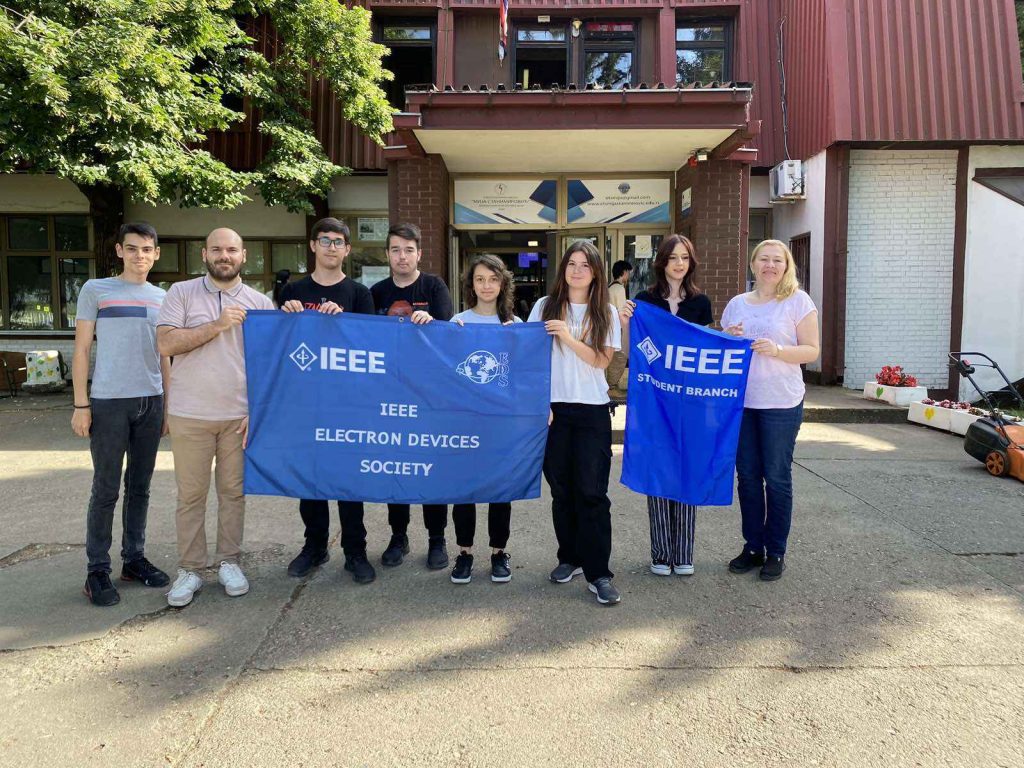
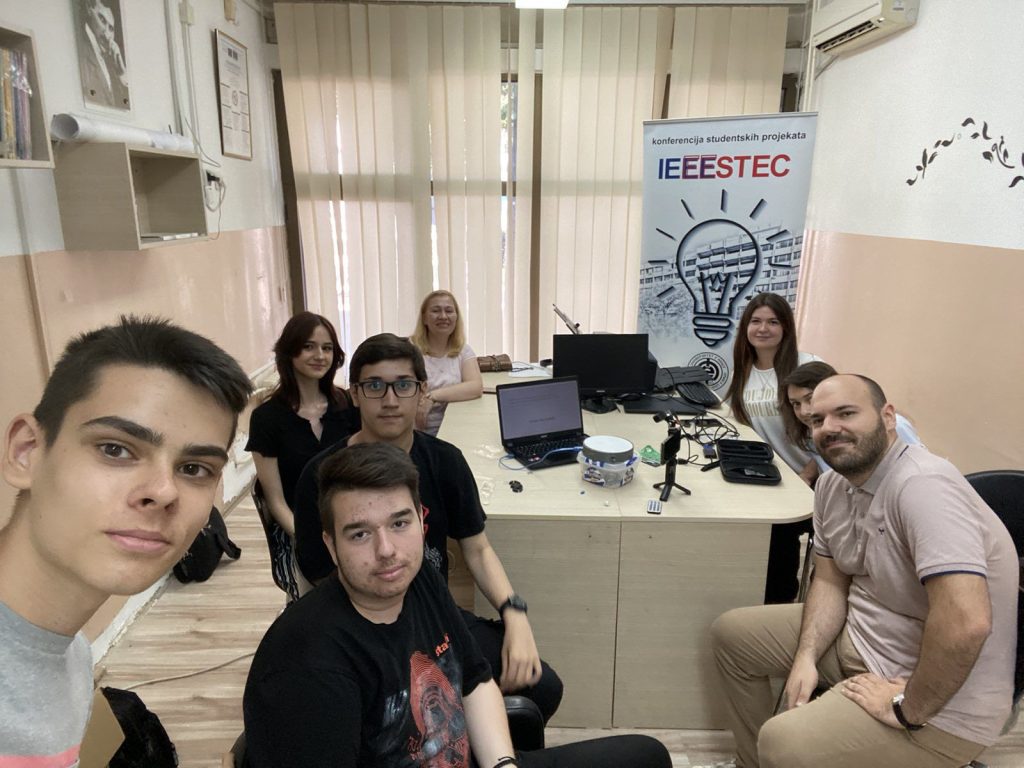
25. National Science Day
10.07.2024. National Science Day, celebrated on July 10th in honor of the birth of Nikola Tesla, was commemorated this year at the Department of Microelectronics. The event was attended by students, professors, and associates, with the focus on presenting current scientific research projects actively participated in by the members of the Department.
During the event, students had the opportunity to learn about the latest research projects and the significant contributions the Department of Microelectronics makes in the field of science and technology. A special segment of the lecture was dedicated to the activities conducted by IEEE, an international organization that promotes the advancement of technology.
Quoting Nikola Tesla, we are reminded of his wisdom and vision: „Of all the ‘frictional forces,’ the one that most retards human progress is ignorance.“
This quote served as an inspiration for further work and development, reminding us of the importance of education and continuous learning. The celebration of National Science Day represents a significant event for the Department of Microelectronics, providing an opportunity for the exchange of knowledge, ideas, and inspiration.
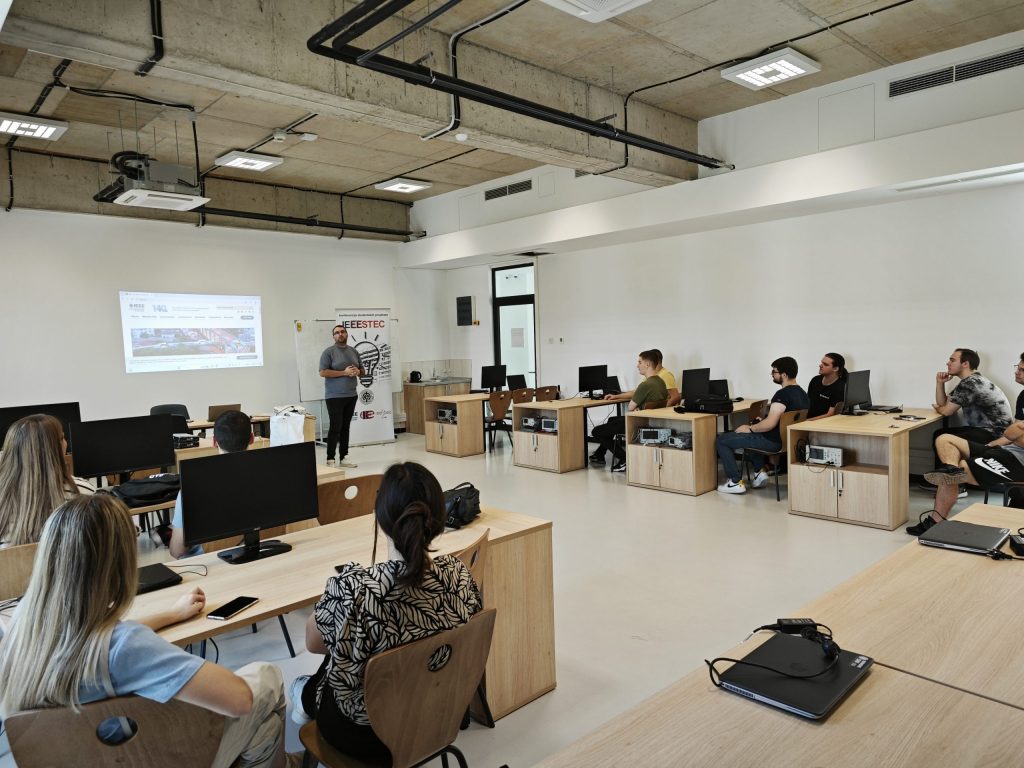
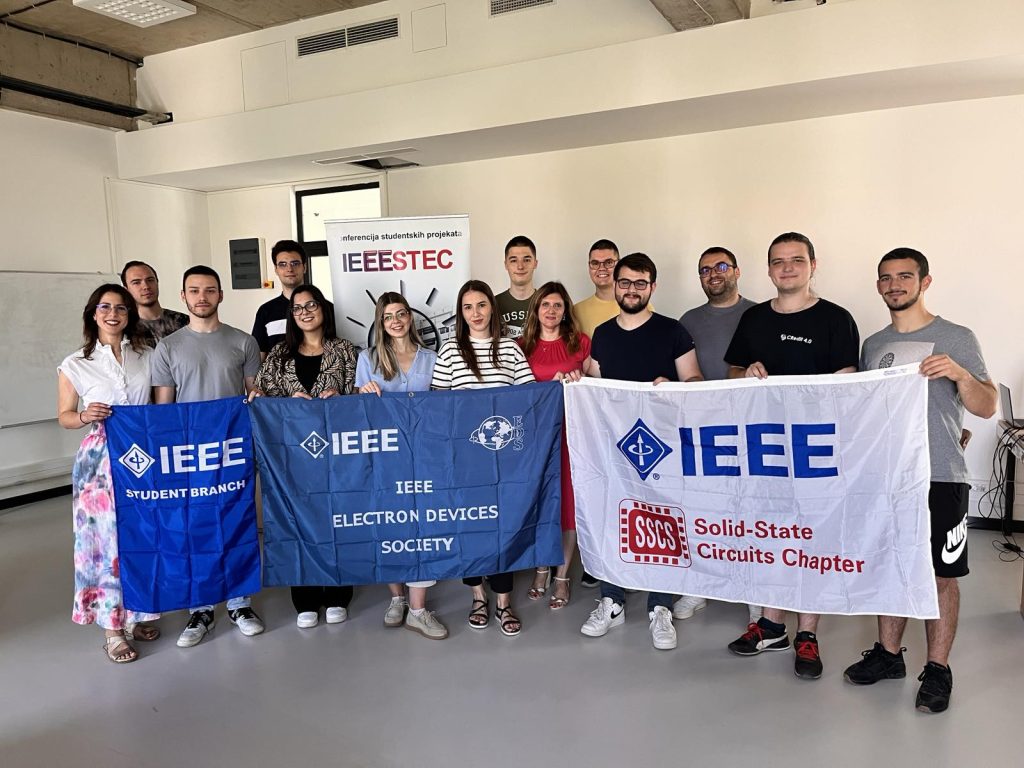
26. Researchers’ Night organized by the Center for the Promotion of Science
On Friday, September 27th, the Researchers’ Night event was organized by the Center for the Promotion of Science in several major cities across Serbia. As in previous years, part of our team participated in its realization. Master’s students, Nevena Veselinović and Veljko Stošić, were tasked with presenting some of the STEM projects carried out at the Faculty of Electronic Engineering in Niš to the visitors. Additionally, the attendees had the opportunity to see how the previous IEEESTEC conferences were organized, the type of projects that were implemented, and how a scientific paper is written. Students, professors, and teachers expressed great interest in participating in this type of activity in the future.
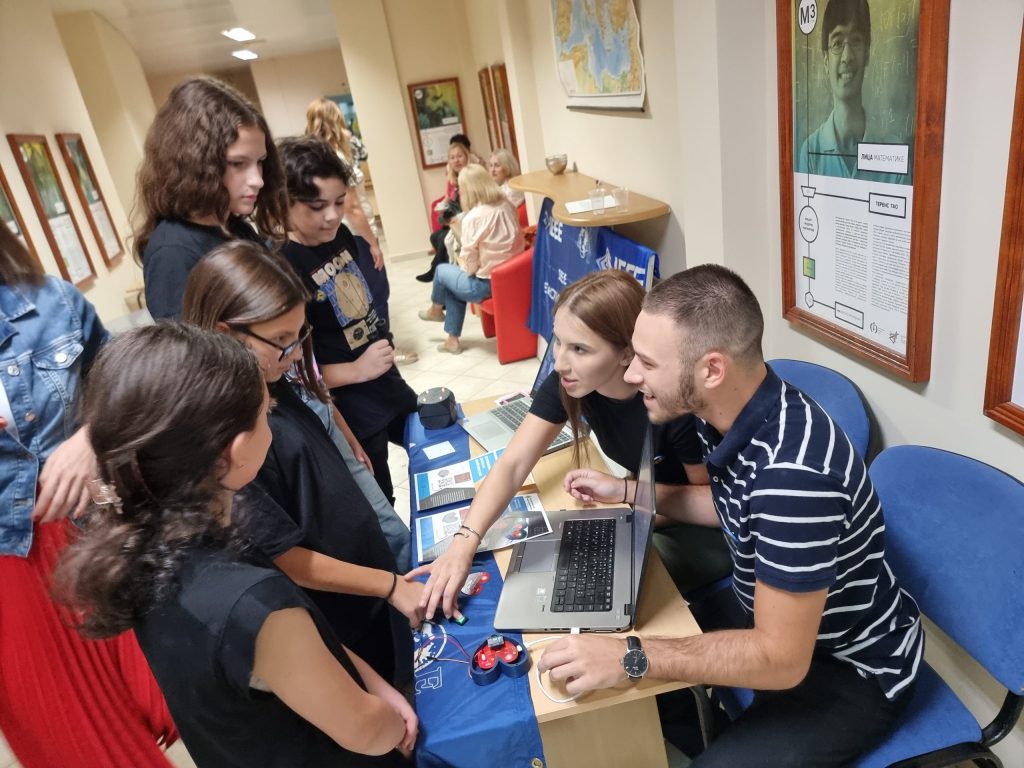
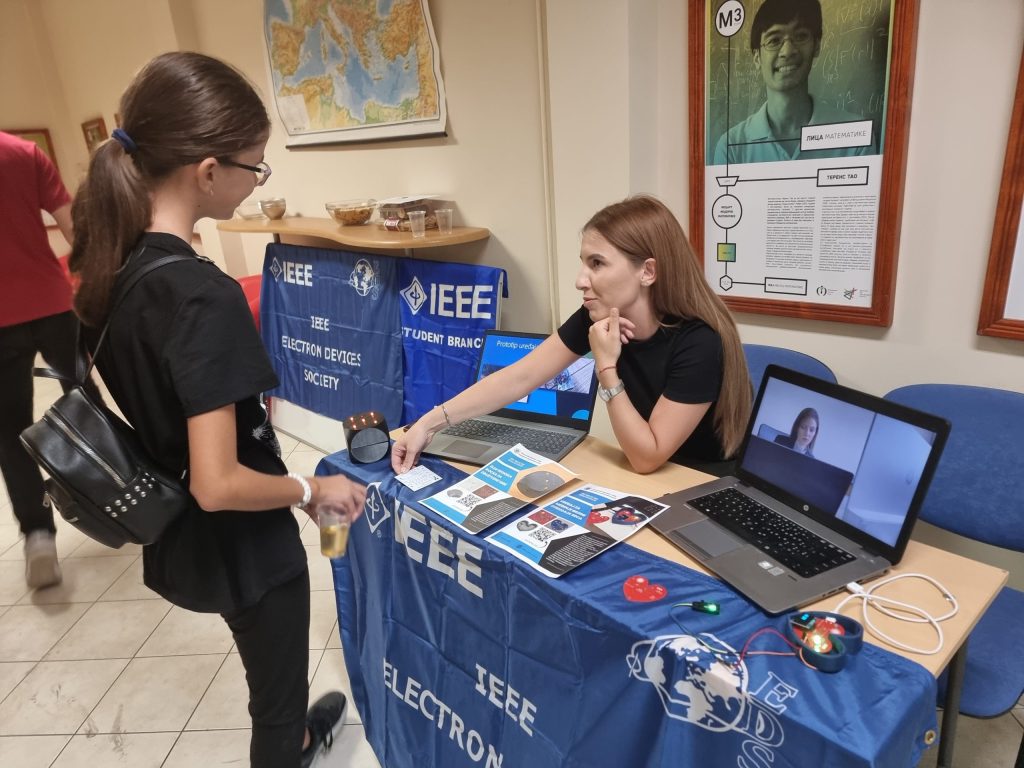
27. Cooperation with Grammar school „Bora Stanković“
On September 20, 2024, cooperation with Grammar school „Bora Stanković“ continued as part of the STEM project „From Idea to Impact: Launching the IEEESTEC Conference“. In addition to a group of students from this school who, with the aim of publishing papers for the IEEESTEC conference, will implement a project in the field of microcontroller programming, this time Prof. Dr. Emilija Živanović held a meeting with professors Snežana Janković and Vladana Golubović and proposed cooperation in the field of physics. The goal of this meeting was to engage another group of students from this school in this STEM project. This time it will be students who have gained rich experience in physics competitions and whose extensive knowledge in this field will enable them to be equal participants in the IEEESTEC conference through the implementation of their own project. Namely, a series of workshops is planned for the month of October, where the students will have their results, which they will publish, through the theoretical lecture, calculation exercises and practical work in the laboratory. The workshops will be organized in Grammar school „Bora Stanković“ and at the Faculty of Electronic Engineering Niš.
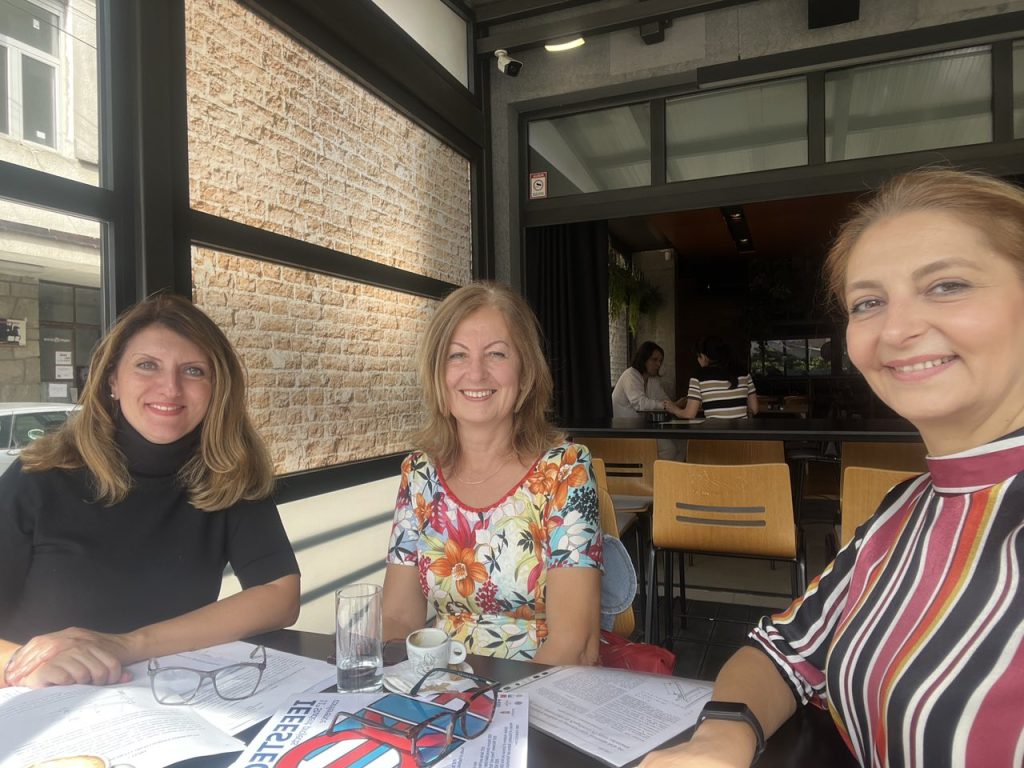
28. Workshop with students from Grammar school „Bora Stanković“
On October 4, 2024, the cooperation with Grammar school „Bora Stanković“ continued as part of the STEM project „From Idea to Impact: Launching the IEEESTEC Conference“. Prof. Dr. Emilija Živanović held a class at Grammar school „Bora Stanković“ from Niš for students who have an affinity for Physics, which were proposed by professors Snežana Janković and Vladana Golubović. At the beginning of the class, the project was presented to the students and professors, as well as the idea of cooperation, which will result in a written paper for the IEEESTEC conference. In the class, the force of friction and the mass moving on an inclined plane were covered. The students were interested, active and showed an understanding of the material in this area. In addition to the theoretical part, calculation tasks were also completed. The students completed a survey at the end of the lesson, which was related to their practical work in the laboratory. Next week, the agreement is for students to come to the Faculty of Electronic Engineering and participate in a workshop, where they will be able to learn about this topic in a practical way, as well as do a laboratory exercise.
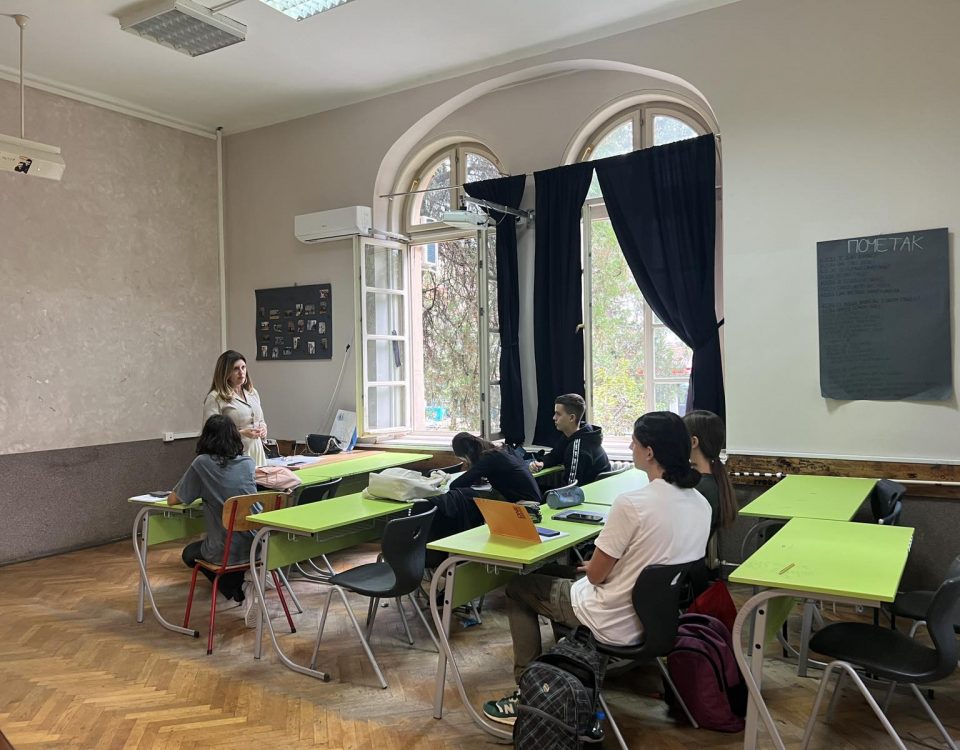
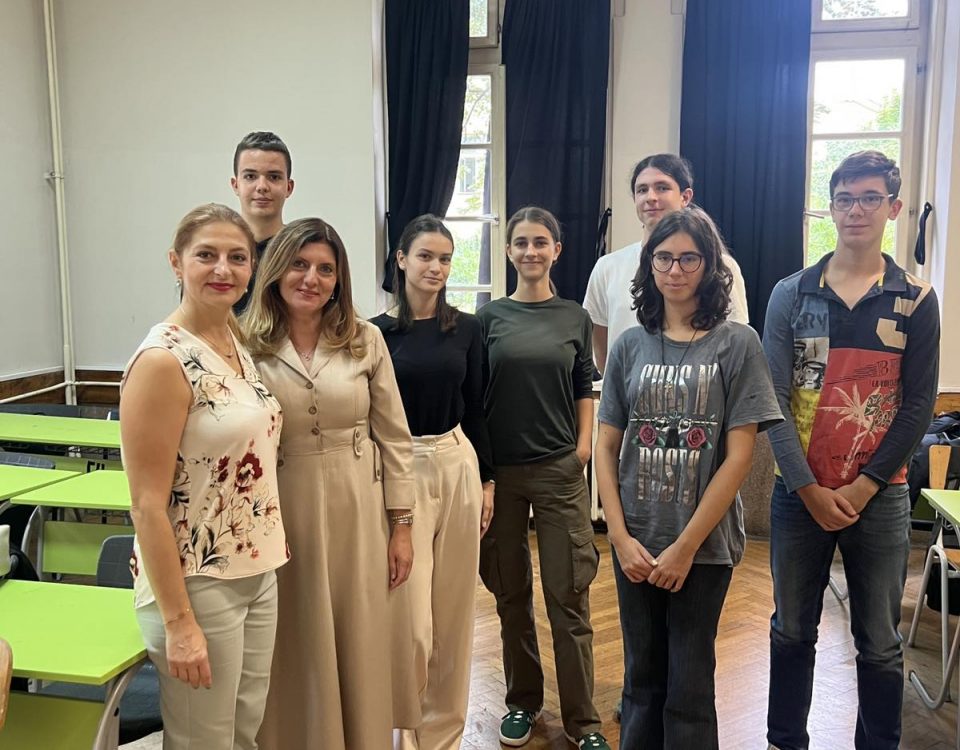
29. Participation in the MIDEM Conference and Promotion of the STEM Project
Prof. Dr. Danijel Danković participated in the international conference titled the „59th International Conference on Microelectronics, Devices and Materials – MIDEM 2024,“ held from October 2 to 4 in Rimske Toplice, Slovenia. On this occasion, he presented an invited paper titled „Analysis of NBTI and SHE Induced Degradation in Power VDMOSFETs.“ During the conference, Prof. Danković also attended the presentations of high school students from Slovenia, under the session „HIGH SCHOOL STUDENTS’ PROJECTS,“ as well as the student competition presentations titled „EMC COMPETITION STUDENTS’ PRESENTATIONS.“
Prof. Danković used the opportunity to introduce colleagues and students from Slovenia to the IEEESTEC conference and the STEM project being implemented in Niš. This presentation aimed to foster future collaboration and boost relations between institutions in both countries. He also highlighted the importance of connecting young talents through STEM initiatives, which could make joint educational and research activities. Additionally, Prof. Danković discussed the possibility of organizing joint workshops and knowledge exchange programs with Slovenian institutions, further promoting STEM education and innovation.
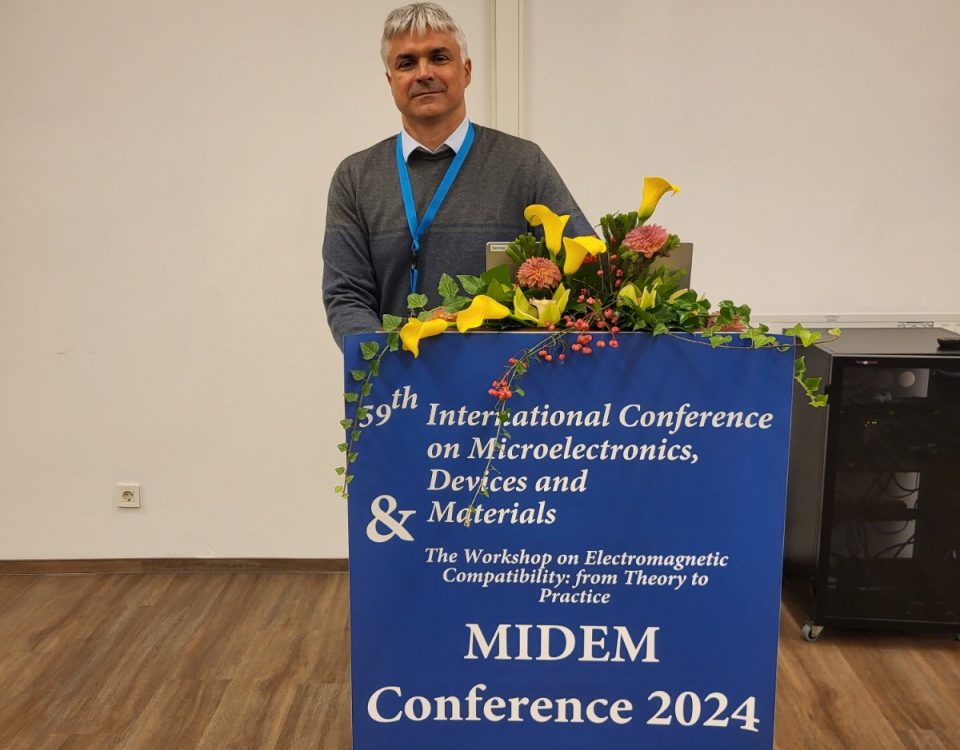
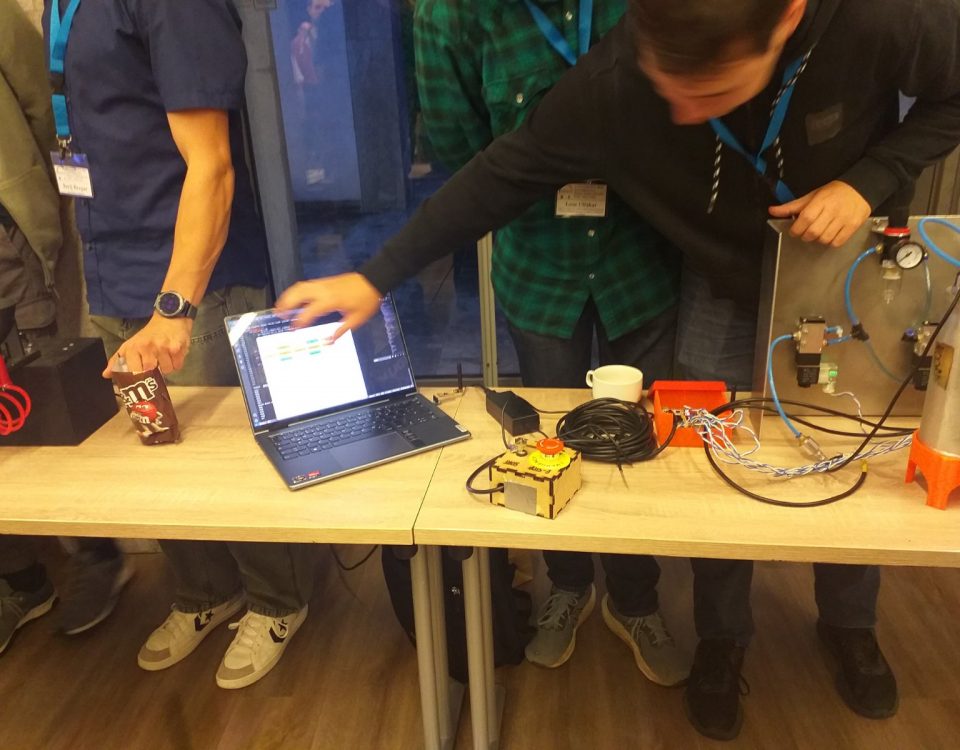
30. Cooperation with Technical School “Mija Stanimirović”
Prof. Dr Danijel Danković, as part of the beginning of the new school year, visited the Technical School ‘Mija Stanimirović’ in Niš. The purpose of this visit was the final preparation of student projects for the IEEESTEC 2024 conference. In addition, during the discussions, the results of the previous year’s collaboration were summarized, and an activity plan for the current school year was created. During the visit, Prof. Danković was introduced to the new project “SMART AGRICULTURE” that the school is implementing. The goal is to enhance this project through joint activities and to present the results at the IEEESTEC conference.
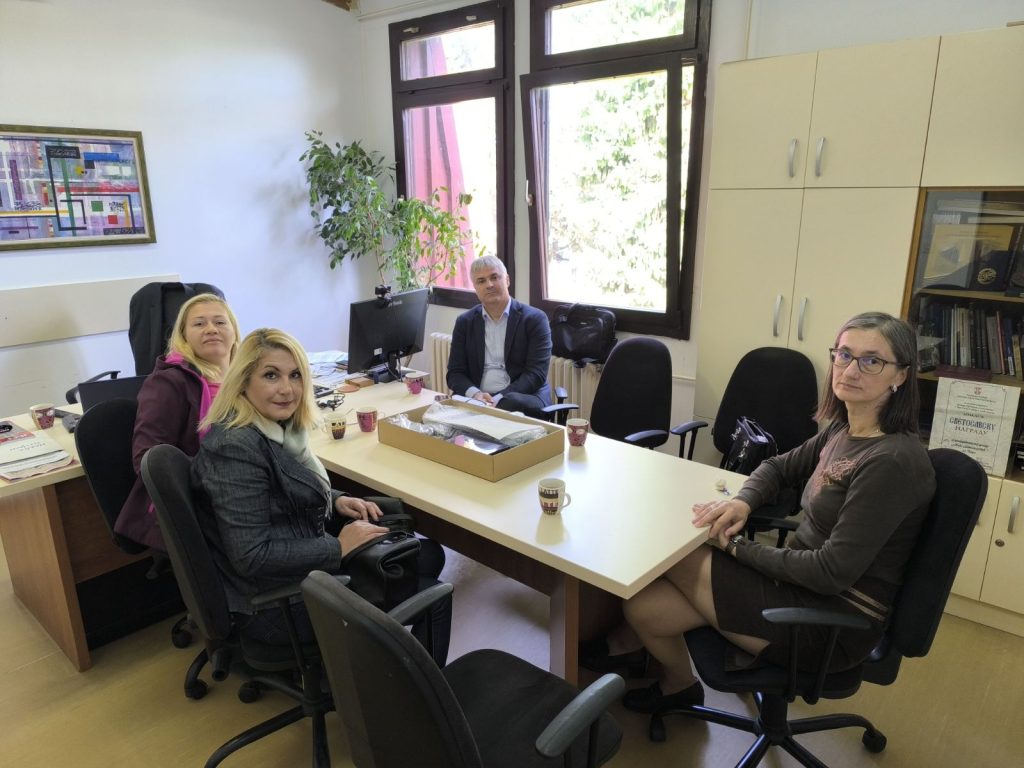
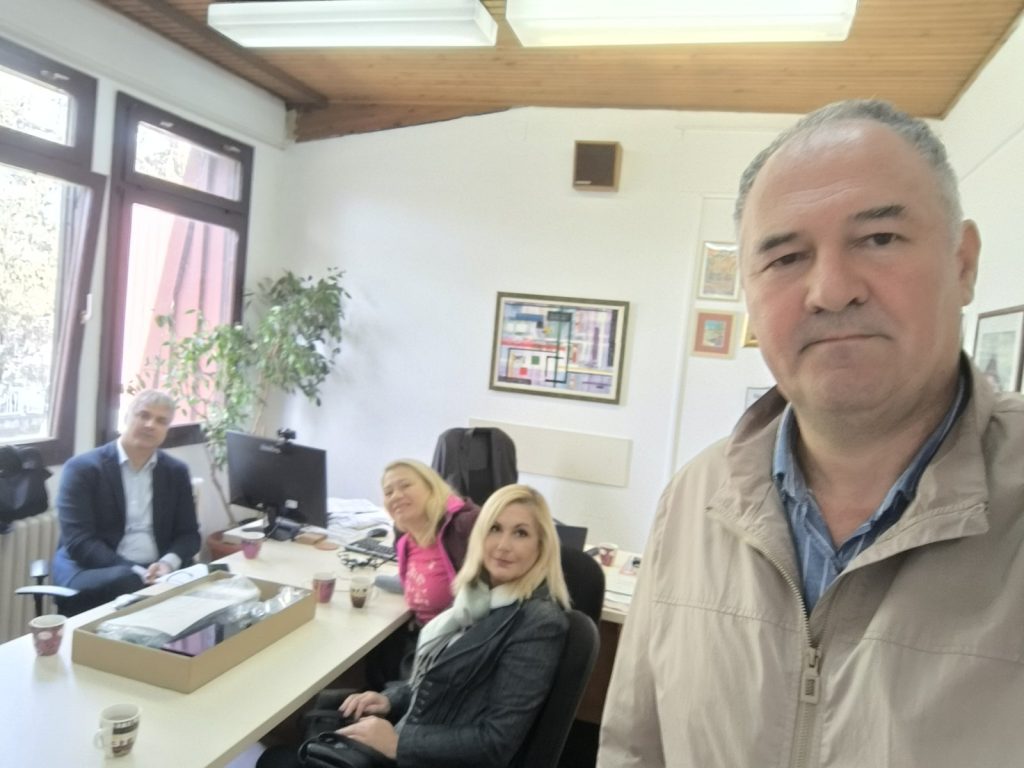
31. Workshop – Determining the coefficient of friction using an inclined plane
On October 11, 2024, cooperation with the high school „Bora Stanković“ continued as part of the STEM project „From Idea to Impact: Launching the IEEESTEC Conference“, this time with a workshop for students at the Faculty of Electronic Engineering in Niš. The aim of this workshop for the students was that they did a laboratory exercise for which they previously had a theoretical lecture. The students were satisfied, they gained some new experience doing the exercise „Determining the coefficient of friction using an inclined plane“. The organizers of the workshop were Prof. Dr. Emilija Živanović and Assoc. Dr. Miloš Marjanović from the Faculty of Electronic Engineering with the cooperation of Professor Vladana Golubović from school „Bora Stanković“. During the workshop, the students completed a survey regarding their impression of their stay at the Faculty of Electronic Engineering in Niš, as well as practical work in the laboratory. The next activity is writing a paper for the IEEESTEC conference. In addition to motivation, cooperation with the school and the impressions of the students, the paper will provide an overview of lecture from Physics related to the force of friction and the mass moving on an incline plane.
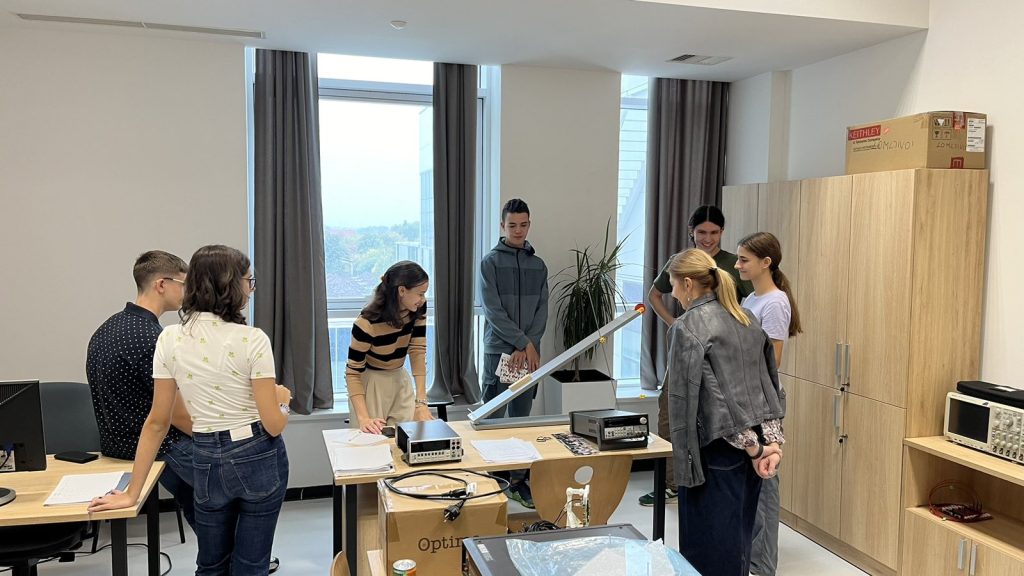
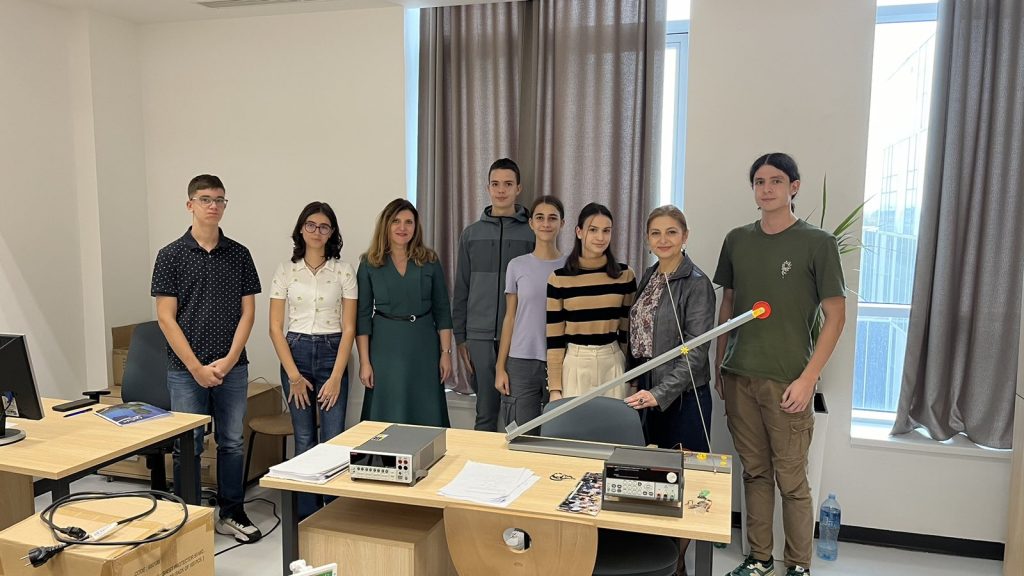
32. The 67th International Belgrade Book Fair
On Saturday, October 19, 2024, at 6 PM, in Hall 2 of the Belgrade Fair, the 67th International Belgrade Book Fair was officially opened – the most important literary event in this part of Europe with a broad international significance. Under the slogan “The Word is Free,” more than 400 domestic and international publishers, writers, visitors, and literature enthusiasts have the opportunity to enjoy the beauty of words and numerous programs in Halls 1, 1A, 2A, and 4 until October 27, celebrating freedom expressed through words.
This year’s Guest of Honor country is the Republic of Cuba, showcasing its cultural tradition and diversity through works from scientists, writers, poets, and artists. In addition to Cuba, authors from Belarus, Bosnia and Herzegovina (Republic of Srpska), Greece, Italy, Iran, Congo, Morocco, Germany, Romania, Russia, Tunisia, Turkey, Ukraine, Croatia, and Montenegro present their literary works and cultures.
Additionally, the Center for the Promotion of Science participated in the fair, where visitors could learn about the latest publications in the fields of science and education. As part of their program, the Center also presented the proceedings from the IEEEESTEC conference, further enriching the fair’s content and giving attendees the opportunity to learn about innovations and research in the field of technical sciences presented at the IEEEESTEC conference.
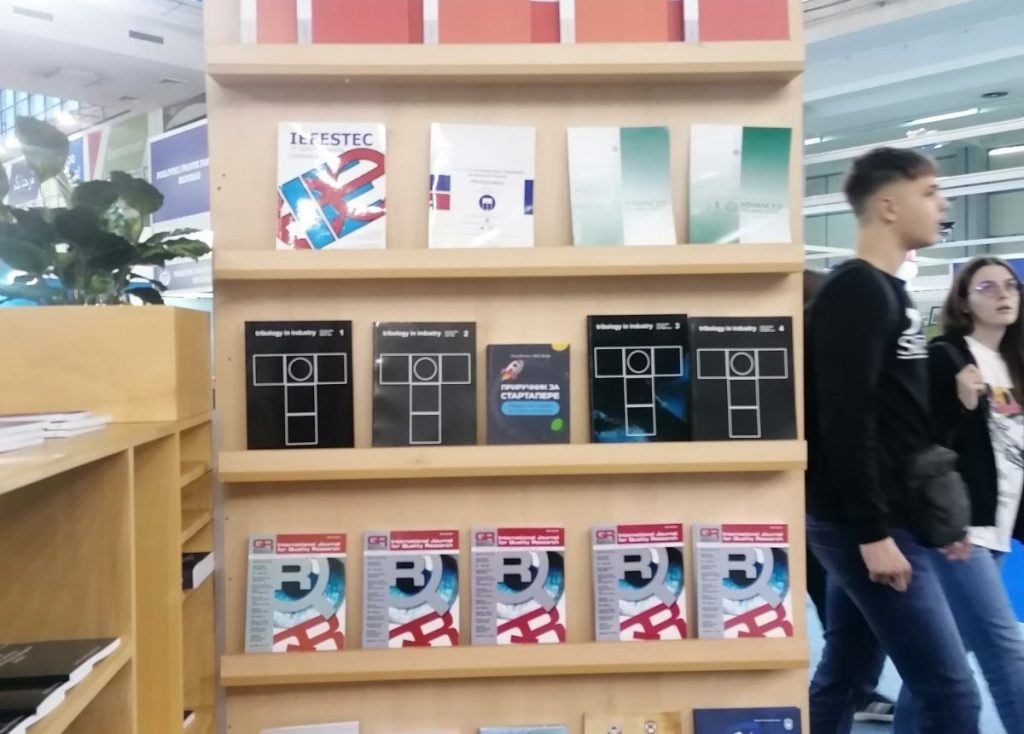
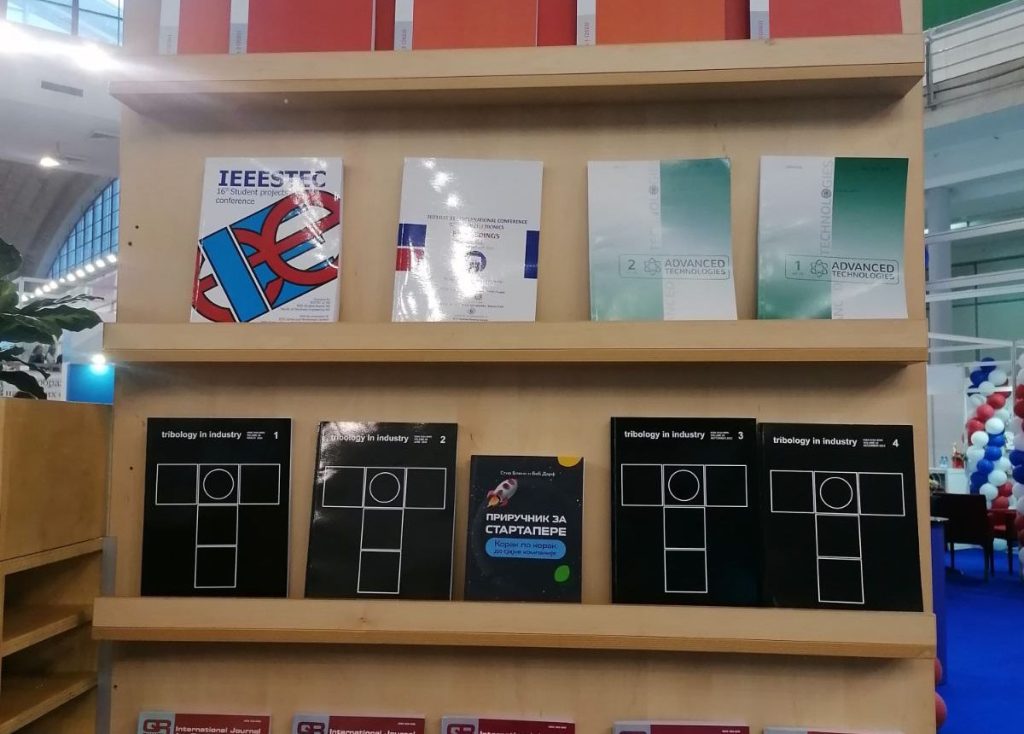
33. Collaboration with technical school „Rade Metalac“ in Leskovac
On October 25, Professor Dr. Danijel Danković visited the technical school „Rade Metalac“ in Leskovac. Throughout October, there has been a very active collaboration with this school regarding the preparation of a paper for the IEEEESTEC conference. Despite the long-standing partnership and the numerous papers published by this school at previous IEEEESTEC conferences, consultations were still necessary for this year’s submission. Previously, the collaboration had taken place solely through various platforms and emails, which is why Professor Danković personally visited the school. Agreements were made concerning the presentation of the paper during the IEEEESTEC conference.
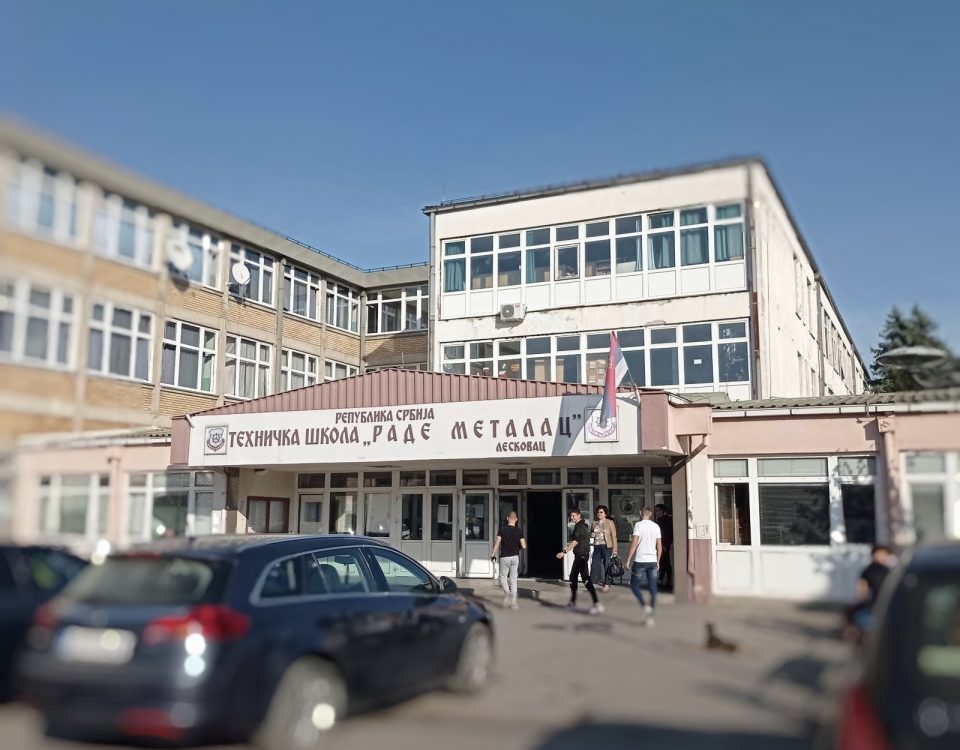
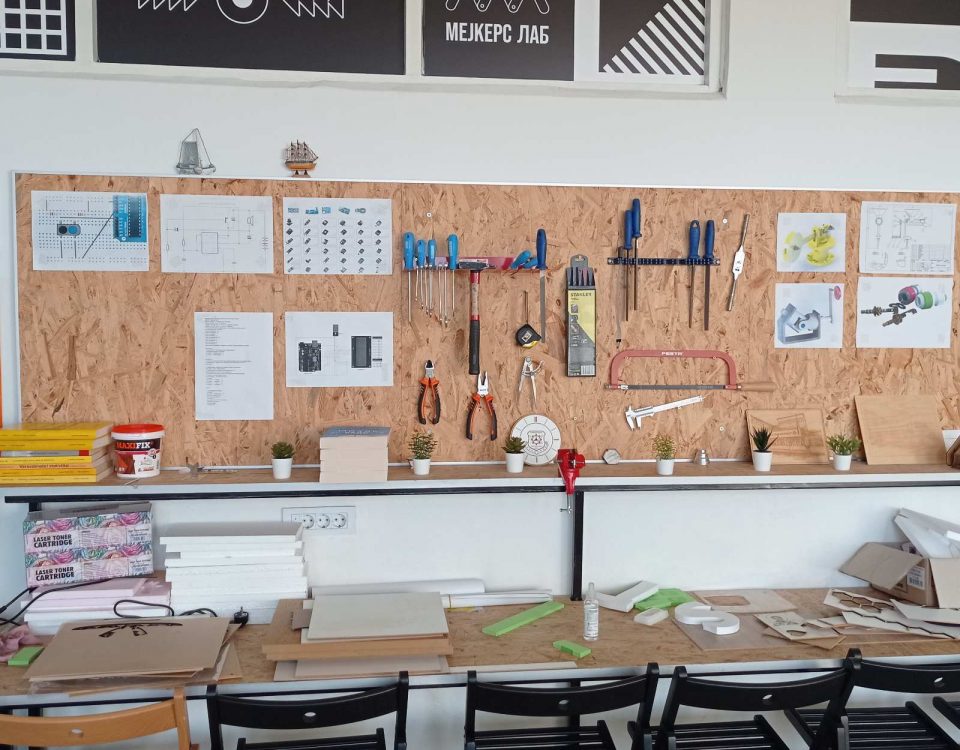
34. The Arduino Contest
For the second year in a row, the ED/SSC Serbia and Montenegro Section has taken part in organizing the Arduino Contest, a significant platform for showcasing creativity in electronics and programming. This year, for the first time, the contest was open to participants from around the world, including both university and high school students. With a highly competitive field, participants were allowed to present their projects in their native languages, with their voices then transcribed for uniform assessment.
The ED/SSC Serbia and Montenegro Section made significant efforts to raise awareness of the contest within Serbia and provided support for project implementation as needed. The response was encouraging, and one of the Serbian teams earned a commendable third-place award, demonstrating both the skill and dedication of young engineers from the region. Also, from the very beginning of the competition, Sandra Veljković was involved in the organization process and was one of the judges who evaluated the works that participated in the competition.
We hope to see similar contests, initiatives, and enthusiasm for competition in the future, as they offer invaluable opportunities for testing knowledge, fostering a spirit of innovation, and developing a competitive mindset among young talents.
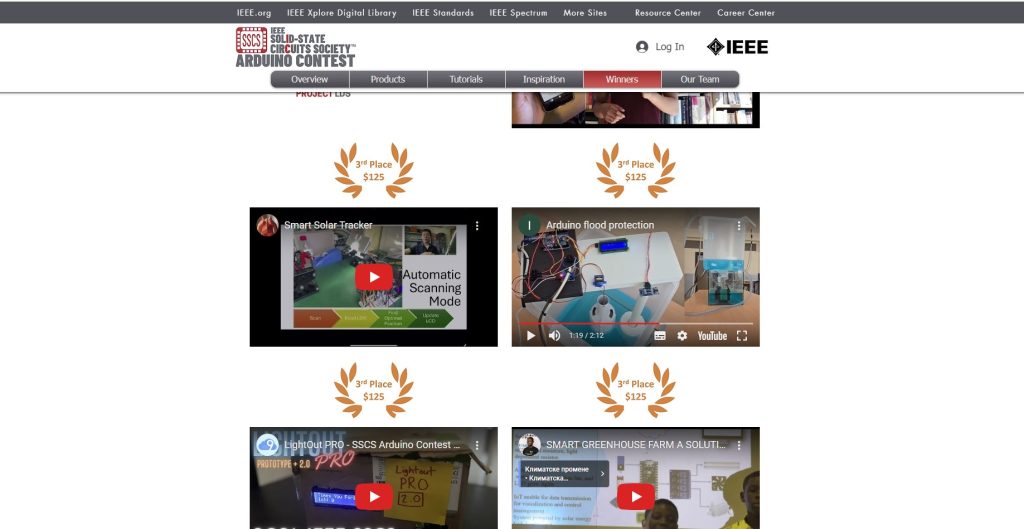
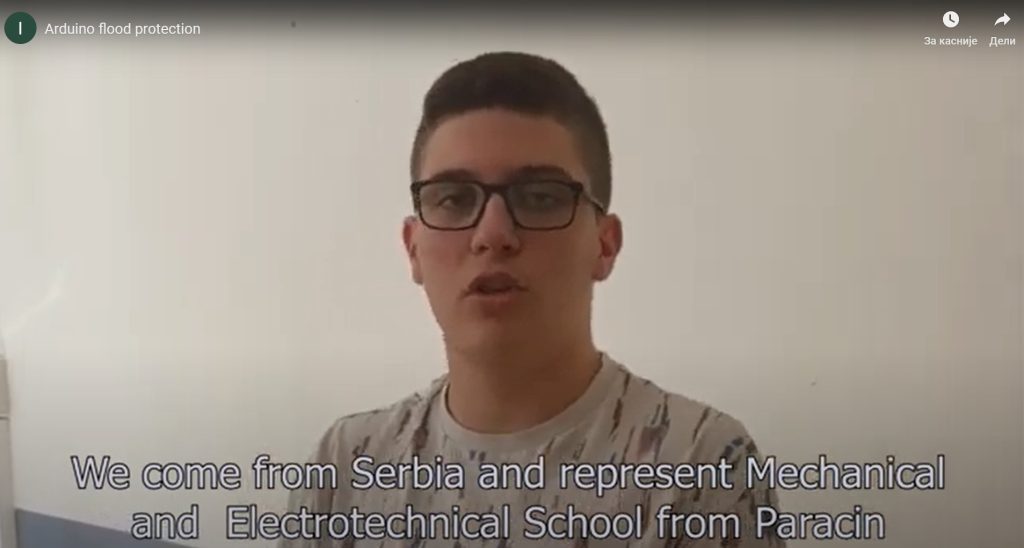
35. Team building
The „Sports Center Nikolić“ Balloon Hall Vinik is a popular sports and recreation venue near Niš, situated in the historically significant area of Vinik, which was once home for the Roman elite. Today, Vinik serves as a relaxation and picnic spot for locals. Our section has been organizing various social events aimed at fostering connections and friendships, including celebrations, museum and company tours, and high school visits.
One notable event was a friendly football match between two teams comprising of alumni of the Faculty of Electronic Engineering in Niš who now work in prominent regional companies, which are supporters of the IEEESTEC Conference. Before the match, Prof. Dr. Danijel Danković, shared the mission and vision of IEEE and encouraged members to participate in future workshops as industry-university connections. Participants received t-shirts with the logo of the IEEESTEC conference. T-shirts were made for two teams, the red team and the blue team. This event was also a part of the promotion of the IEEESTEC conference, which will be held at the Faculty of Electrical Engineering in Nis at the end of November. These types of activities, along with symbolic gifts, are planned to continue in the future.
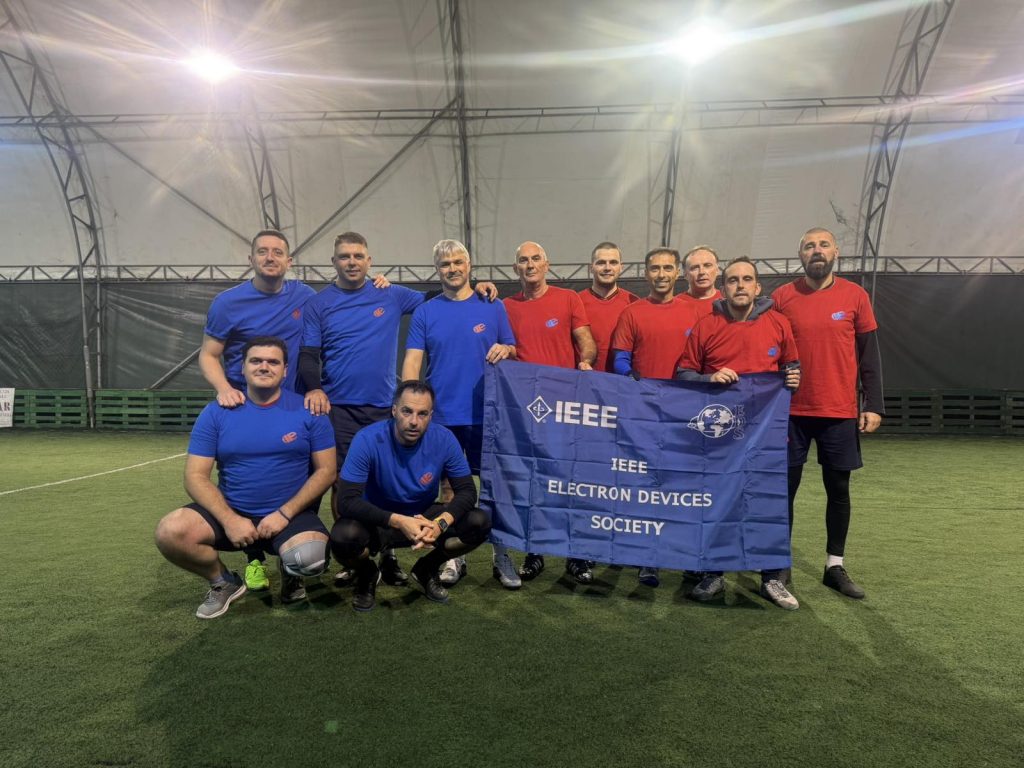
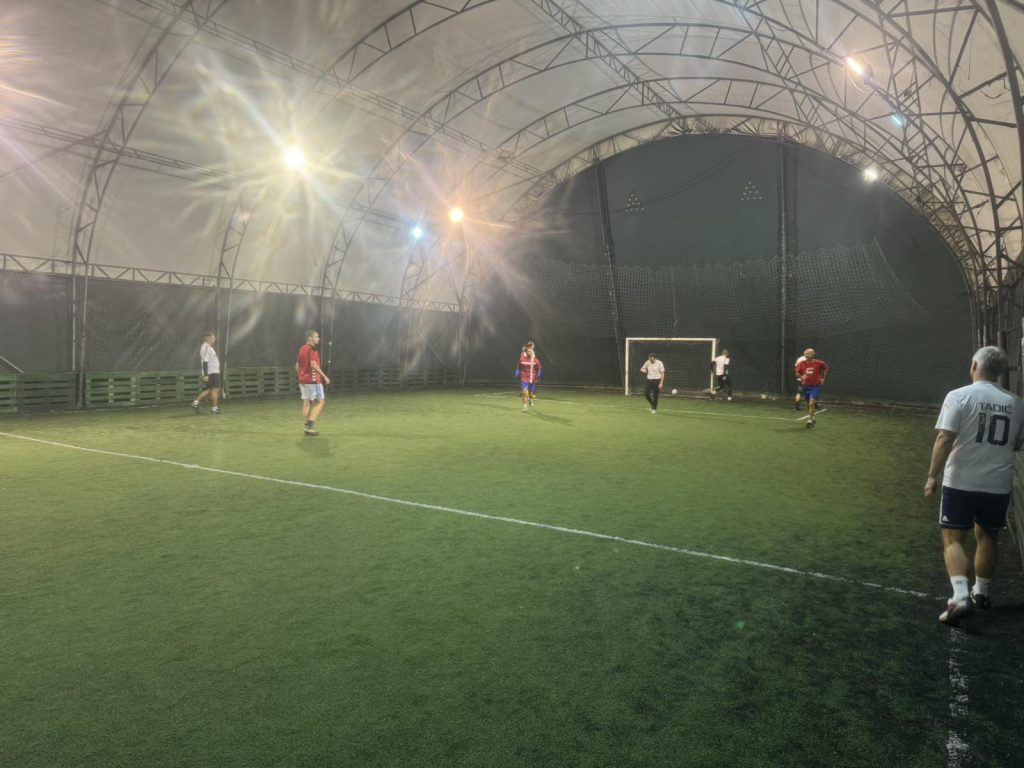
36. Meeting in „Bora Stanković“ high school
On November 13, 2024, another visit to the „Bora Stanković“ high school in Niš was organized. On this occasion, professor Emilija Živanović had a meeting with physics professors Snežana Janković and Vladana Golubović, which was also attended by students who had previously attended workshops realized within the framework of the STEM project „From Idea to Impact: Launching the IEEESTEC Conference“. The topic of the meeting was the agreement on the final presentation of the work at the 17th IEEESTEC conference. In addition, it was agreed that about 30 school students will visit the Faculty of Electronic Engineering in Nis on 28 November 2024. On that occasion, they will attend the official opening of the conference, as well as numerous activities that are organized that day for pupils and students.
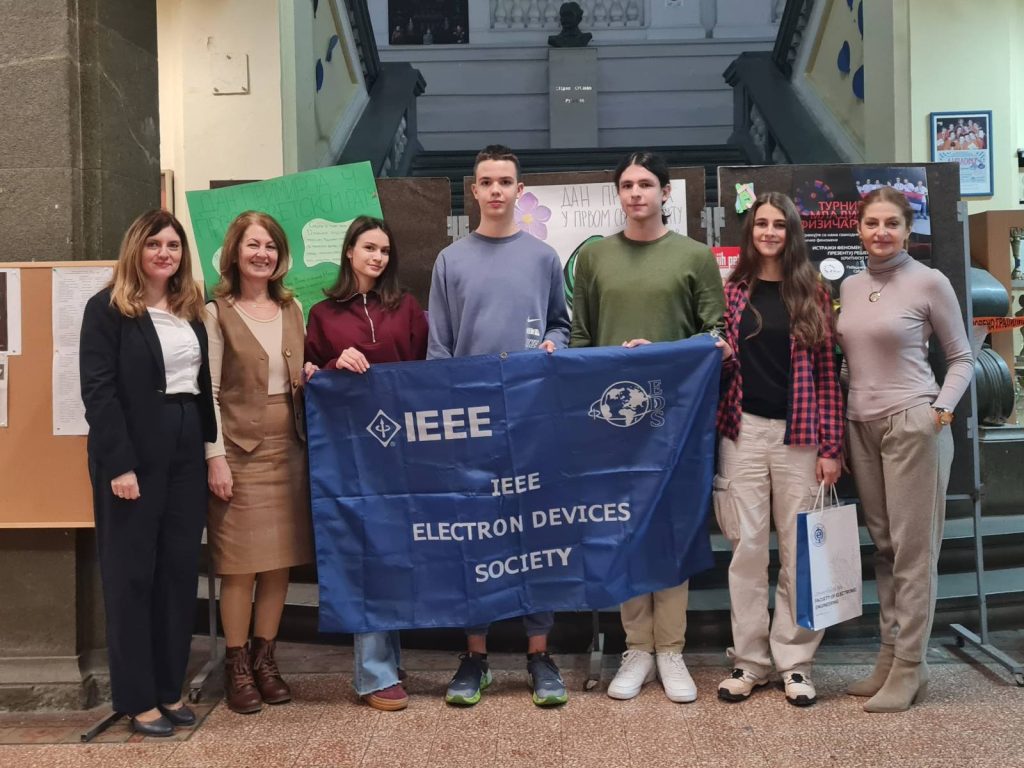
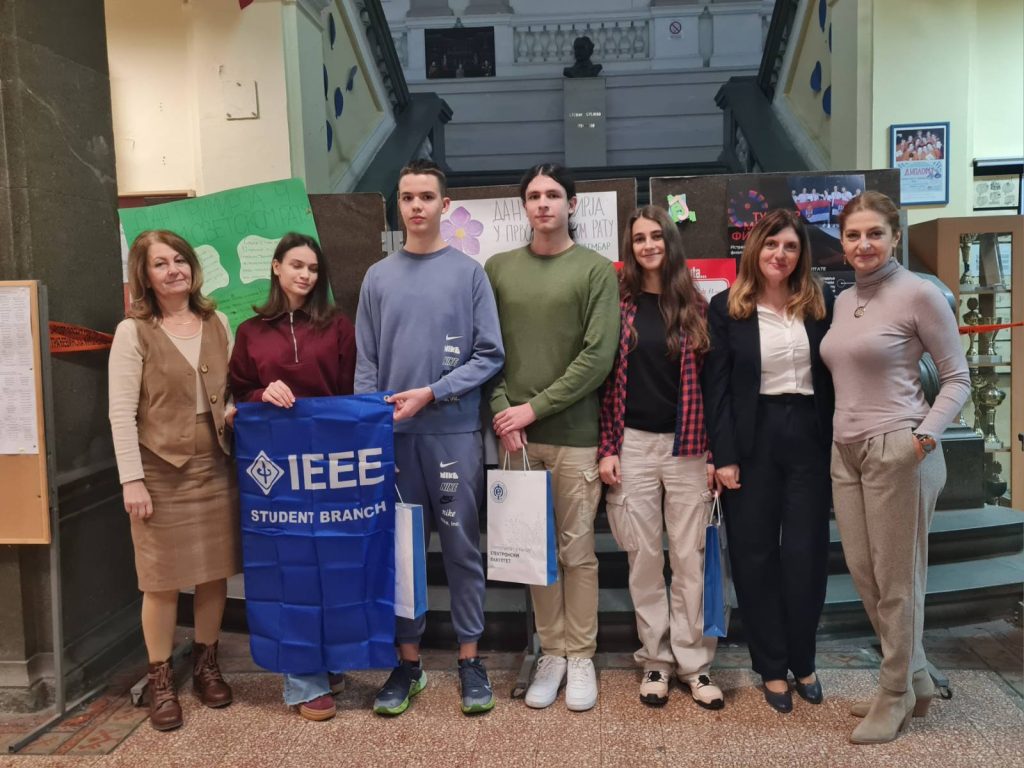
37. Innovative Technologies in Smart Building Architecture
On November 14, 2024, a lecture entitled „Smart buildings in architecture“ was held at the Faculty of Civil Engineering and Architecture in Niš. The lecture was held by the assistant of the Department of Microelectronics, Nikola Mitrović. During this lecture, the innovative technical systems used in the design of smart buildings were presented, as well as the key factors that architects must pay attention when creating such projects. Special attention is paid to the concept of smart windows. The presentation is marked by carefully selected information from the field of architecture and technology. The lecture was attended by 15 architecture students, and the lecture itself lasted 45 minutes.
38. Part of the New Equipment
Thanks to funding from the STEM project, new equipment was acquired, enabling project participants to work on and enhance their skills through practical project implementation. After completing the workshops, participants were highly motivated to continue their work and frequently asked questions like “What’s next?” or “When is the next gathering?” This enthusiasm confirms how engaging the tasks were for students. Initially unfamiliar with the equipment, they gradually mastered its functions, making the experience both educational and inspiring.
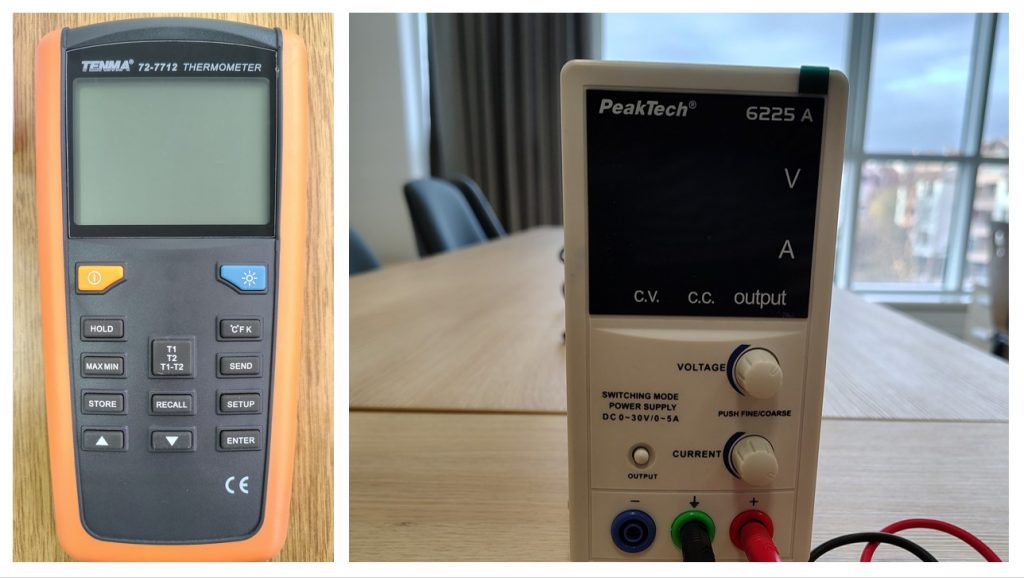
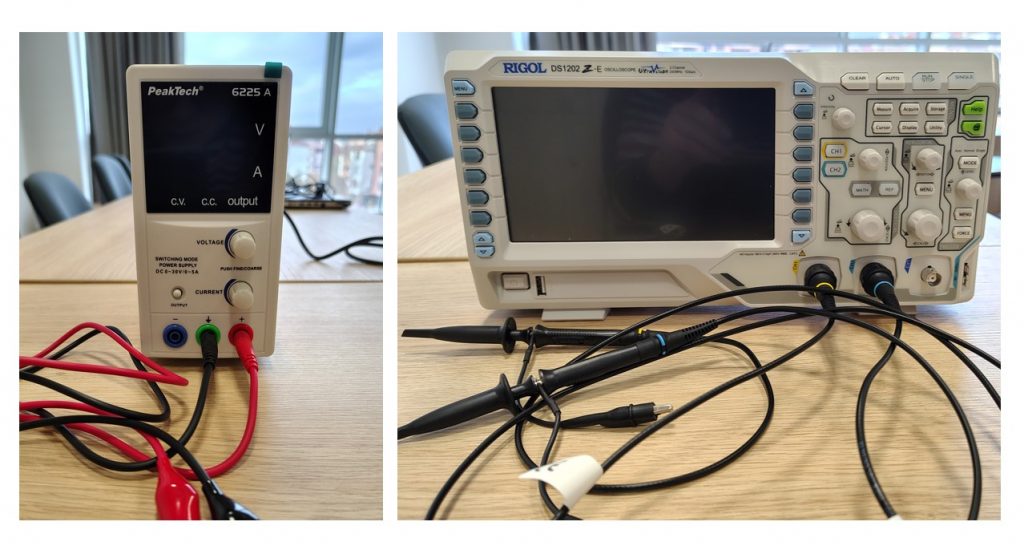
39. Technical Meeting for the IEEESTEC Conference
On November 25, 2024, the final preparations for the organization of the IEEESTEC conference were successfully completed. With numerous students from various cities across Serbia set to attend, detailed planning was required to ensure they could come as planed to the Conference.
A dedicated team of around 20 volunteers played a crucial role in coordinating the conference’s additional events. Their efforts extended to tasks such as communicating with companies, preparing awards for the authors of winning papers, preparing workshops, and ensuring the smooth completing of all activities. Their commitment and teamwork will significantly contribute to the success of the event, creating a well-organized and enriching experience for all participants.
40. Media Promotion Activities for the IEEESTEC Conference
In the lead-up to the IEEESTEC Conference, extensive media promotion was carried out to ensure broad visibility and engagement. This promotion was performed on various social media platforms, including presentations at schools, meetings, and other relevant venues.
The promotional activities reached their peak on the day of the Conference with a television interview which was performed by prof. dr. Danijel Dankovic. This interview was so important because in that way many people could hear about the IEEESTEC Conference. The interview provided an excellent opportunity to highlight the conference’s goals, activities, and significance, further boosting interest and participation among students, professionals, and all associated colleges. These efforts successfully enhanced the conference’s outreach and impact.
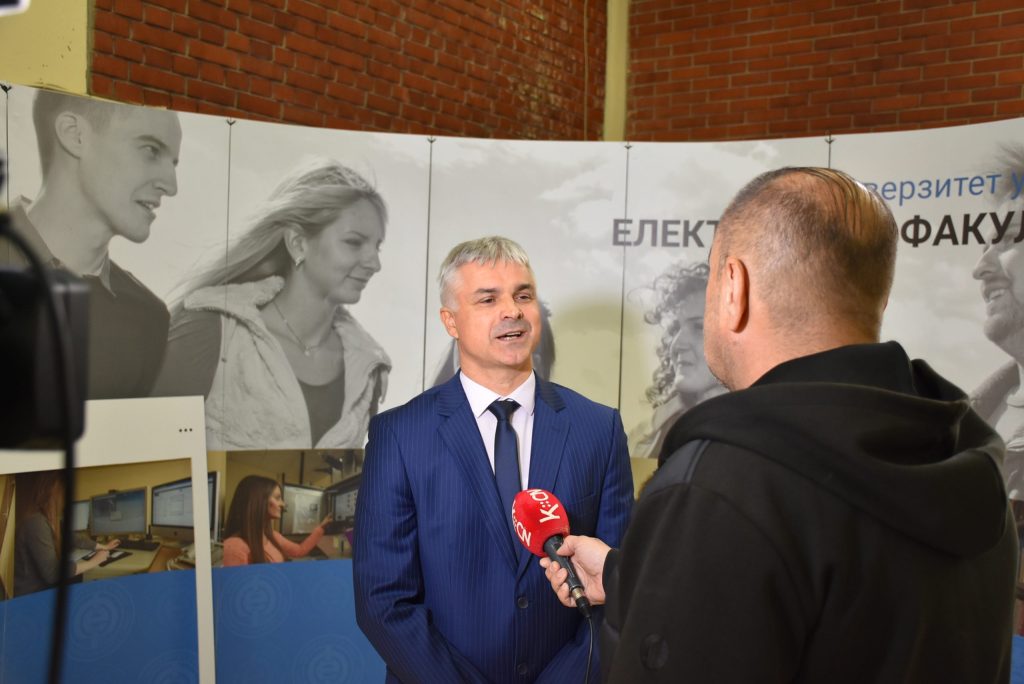
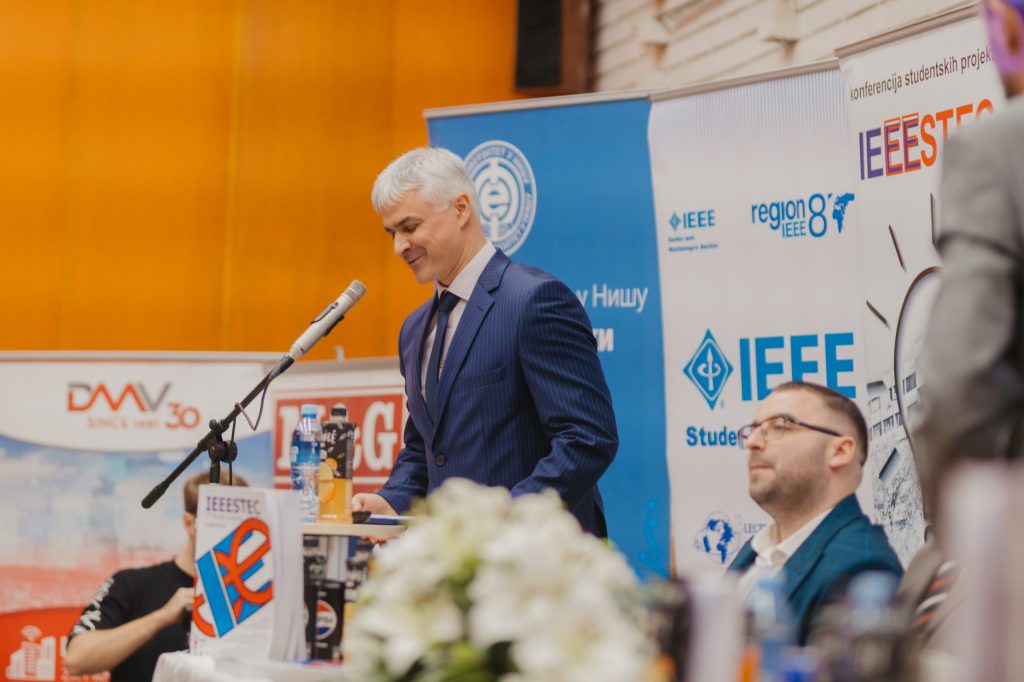
41. 17th IEEESTEC Conference held at the Faculty of Electronic Engineering in Niš
The 17th student’s projects conference – IEESTEC was held on November 28, 2024. The conference was organized by the student branch of IEEE SB Niš, EESTEC LC Niš and the Faculty of Electronic Engineering in Niš, in cooperation with IEEE Serbia and Montenegro Section, IEEE Electron Devices/Solid-State Circuits Chapter, IEEE Microwave Theory and Techniques Chapter, IEEE WIE Affinity Group and IEEE Computational Intelligence Chapter, with the support of the Serbian Academy of Science and Arts (SASA) Branch in Niš, as well as the Ministry of Education, Science and Technological Development of the Republic of Serbia.
We sent an invitation for the conference to the authors of papers from previous conferences, to all student organizations in Serbia, student branches of IEEE, members of IEEE Section Serbia and Montenegro. The total number of papers received is 101 (from the fields: electronics, microelectronics, telecommunications, automation, energy, computing and informatics, physics, student mobility…). All papers have passed the peer review stage, with a minimum of two peer reviews provided for each paper. 54 professors and associates of the Faculty of Electronics in Niš helped in the review process.
Following the official opening ceremony, which included the awarding of prizes for the best projects, participants and visitors had the opportunity to enjoy a poster exhibition in the faculty’s main hall, as well as oral presentations of the awarded papers. Special attention was given to high school students, for whom interactive workshops were organized in the state-of-the-art laboratories of the Faculty of Electronic Engineering. These workshops enabled the students to explore topics in electronics and programming hands-on, under the guidance of experienced instructors and students.
Based on the received reviews, the awards were awarded:
3. Designing a traffic intersection controller for an FPGA chip, Nevena Veselinović, Veljko Stošić, Nikola Stefanović, Faculty of Electronic Engineering Nis, Serbia
2b. Optimization of rendering performance of 3D Gaussian stacking scenes by forward reduction of detail level based on distance, Luka Skenderija, Research center Petnica, Valjevo, Serbia
2a. PIN diode as an X-ray sensor, Dunja Djordjevic, Faculty of Electronic Engineering Nis, Serbia
1. Netrunners „Vision One“, Nikola Ranđelović, Luka Rakić, Faculty of Electronic Engineering Nis, Serbia
The IEEESTEC Conference continues to inspire future engineers, connect talented young individuals, and create an environment that fosters innovation and scientific achievements.
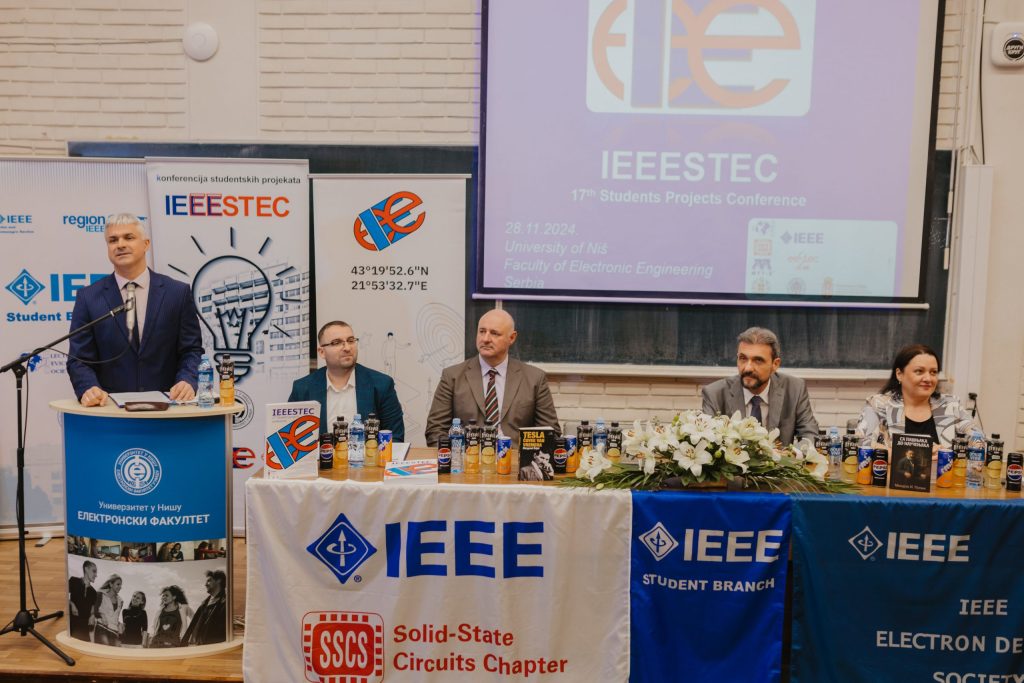
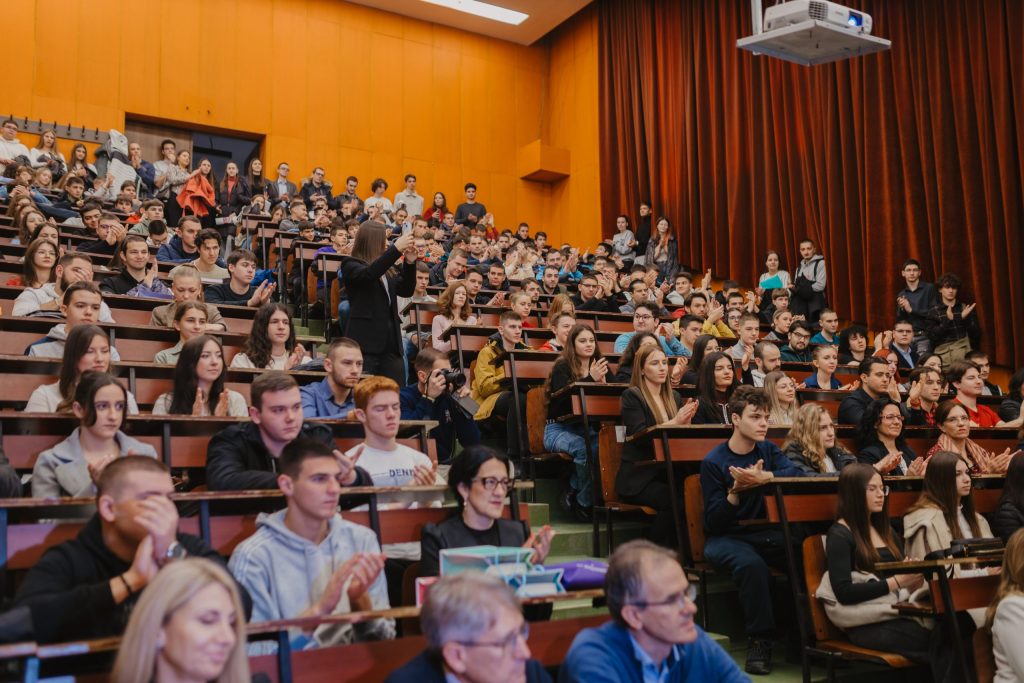
42. Petnica Science Center at the IEEESTEC Conference
It was a great honor to host esteemed guests from the Petnica Science Center at this year’s IEEESTEC Conference. Our long-standing collaborators once again joined us, presenting high-quality projects in the field of electronics. Their participation showcased the impressive results of various tasks and projects undertaken during their seminars. These efforts finished in the creation of exceptional papers that were presented at the Conference, further demonstrating their dedication to scientific excellence.
The cooperation with Petnica Science Center has always been a source of inspiration and innovation, and this year was no exception. Following the successful Conference, the collaboration continued at the formal dinner in a relaxed and friendly atmosphere.
The permanent cooperation with Petnica Science Center stands as a proof of collaboration in advancing education, science, and technology, and we look forward to many more successful projects and shared achievements in years to come.
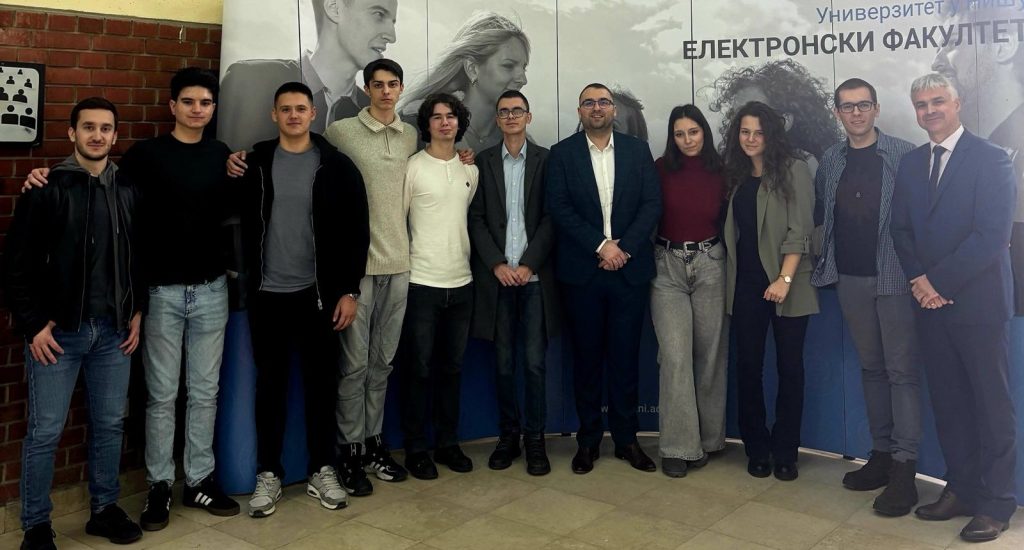
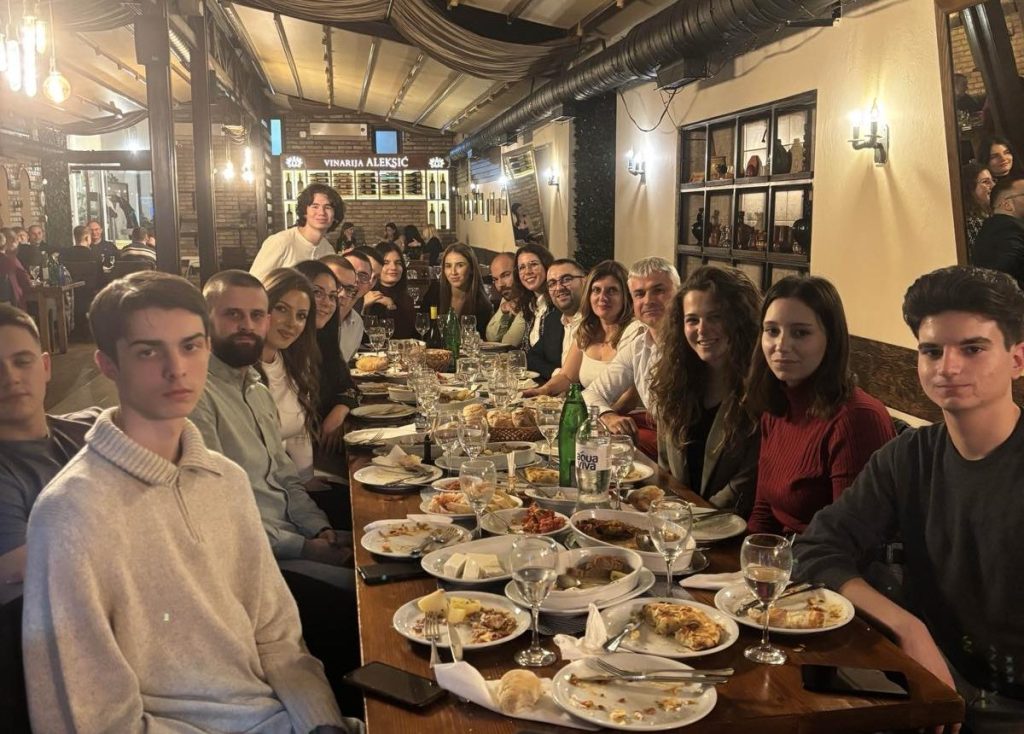
43. Workshop for Galaksija kup participants in Nis
The ninth edition of the Galaxy Cup (in Serbian: Galaksija kup), a national competition for electrical engineering schools, has kicked off, with teams of students and their mentors tasked with developing innovative technological solutions to everyday challenges. This year, the competition has expanded with the support of key partners, including UniCredit Bank Serbia as the main sponsor and Bosch Serbia, bringing global expertise to the event. These partnerships enable students to benefit from a mentoring program and regional workshops, enhancing their skills in problem-solving, critical thinking, and modern work methodologies. A workshop for teams from southern Serbia was held at the Science and Technology Park Niš on December 10, 2024, where Danijel Danković and Miloš Marjanović, jury members of the competition, introduced the IEEE STEM project to the participants.
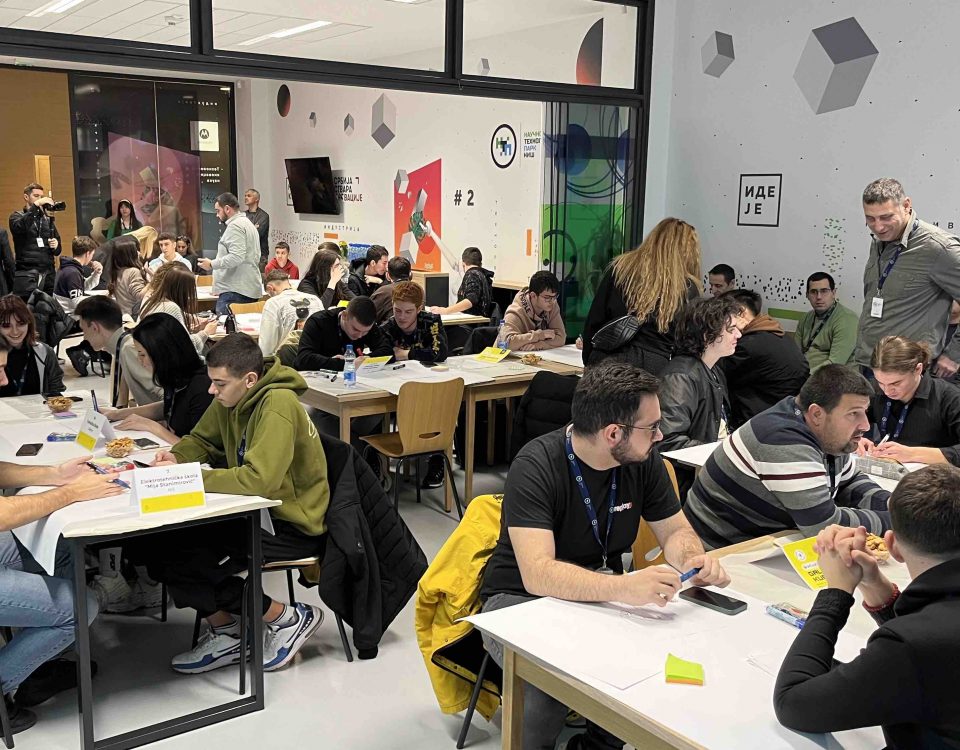
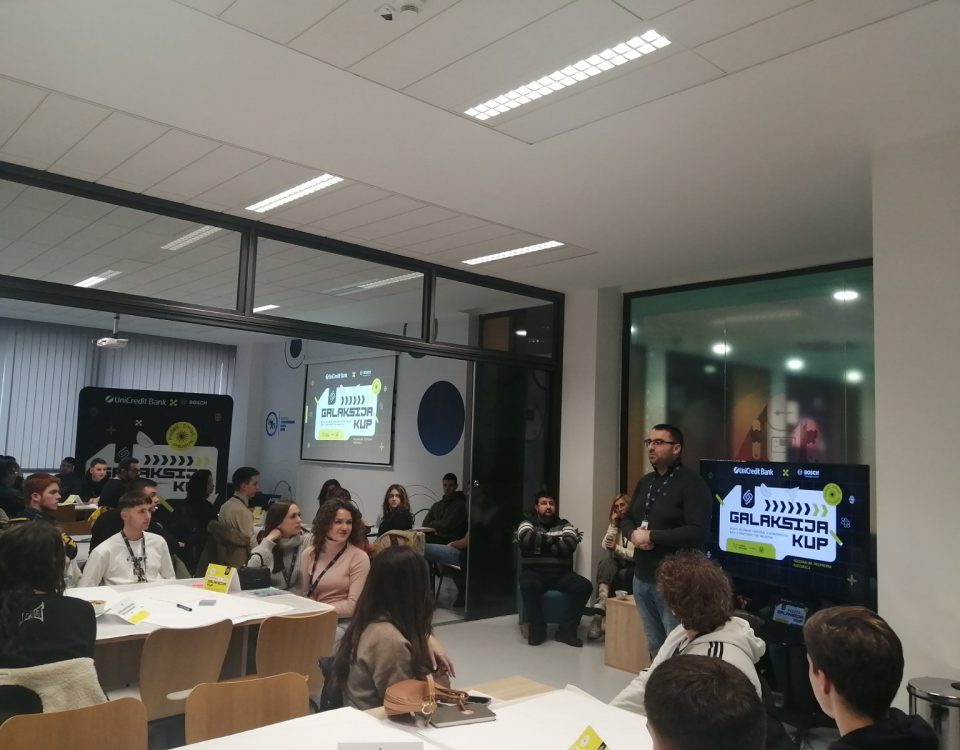
44. „Mobility Today, Skills for Tomorrow“
On December 12, 2024, a presentation of the Erasmus+ project „MOBILITY TODAY, SKILLS FOR TOMORROW“ by the Electrical Engineering School „Mija Stanimirović“ was held at THINK Innovative Hub and Caffe Industrija. Students and teachers who participated in the Erasmus+ project in Leipzig, at the Vitalis training center, shared their experiences with the attendees and presented the works they completed upon returning from Leipzig. This is yet another successful project implemented by the school, following a series of previous projects that resulted in numerous publications and awards at past IEEESTEC conferences. The event was also attended by Prof. Dr. Danijel Danković, who engaged with students and teachers, encouraging them to prepare papers based on the completed projects for the upcoming IEEESTEC conference. The event gathered a large number of representatives from various scientific and educational institutions and received significant media coverage.
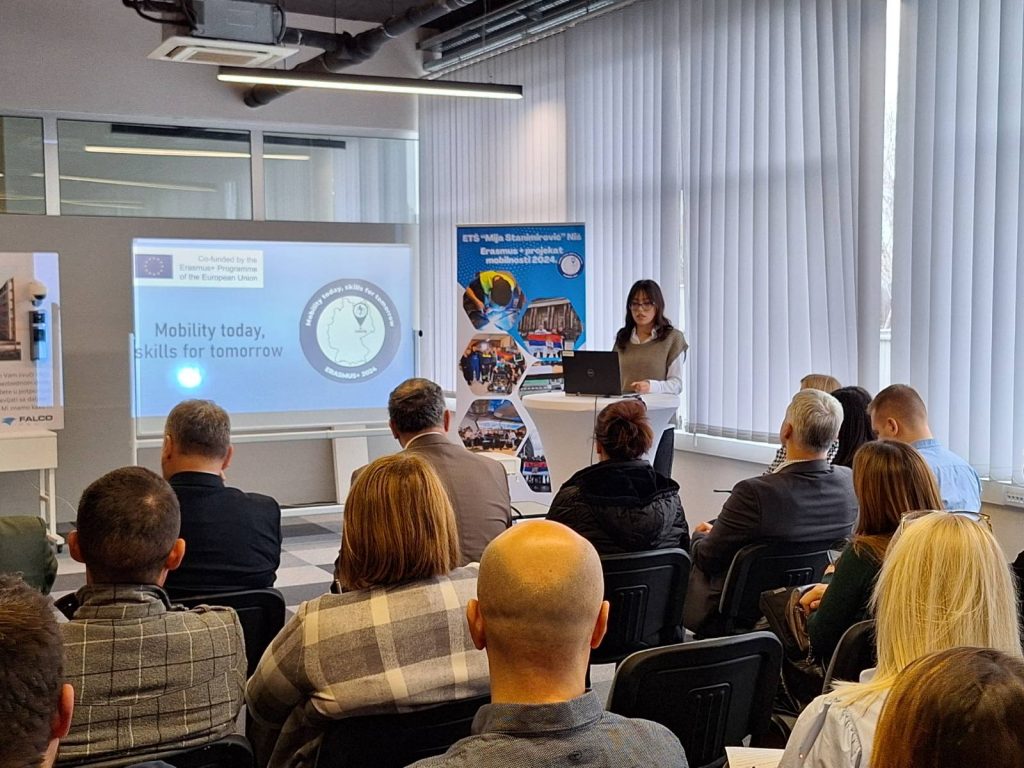
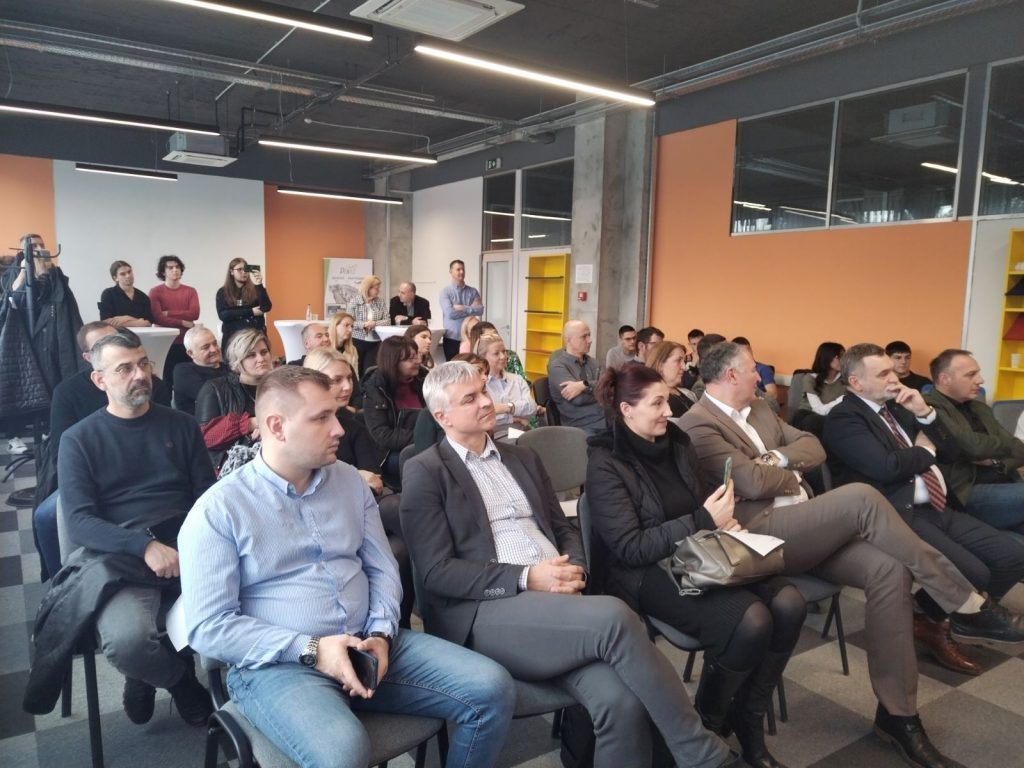
45. Conference „Step into Science“ in Petnica
The „Step into Science“ conference, held annually, brings together alumni from various programs organized by the Petnica Science Center for high school students, as well as representatives from partner organizations across the region. This year, the conference celebrated its 23rd edition from December 13 to 15, 2024. On Saturday, the guest session featured presentations from the Faculty of Electronic Engineering in Niš, including: „Remote Control System Using Infrared Communication“ by Marija Petrović, „PIN Diode as an X-ray Radiation Sensor“ by Dunja Đorđević, and „Twinning for Excellence in Adaptive Edge AI – AIDA4Edge“ by Miloš Marjanović. For several years, the Faculty of Electronic Engineering has collaborated with Petnica SC and IEEE, with faculty members giving guest lectures at Petnica seminars and participating in their conference. In return, Petnica participants present their projects at the IEEESTEC conference, further promoting the STEM concept in education.
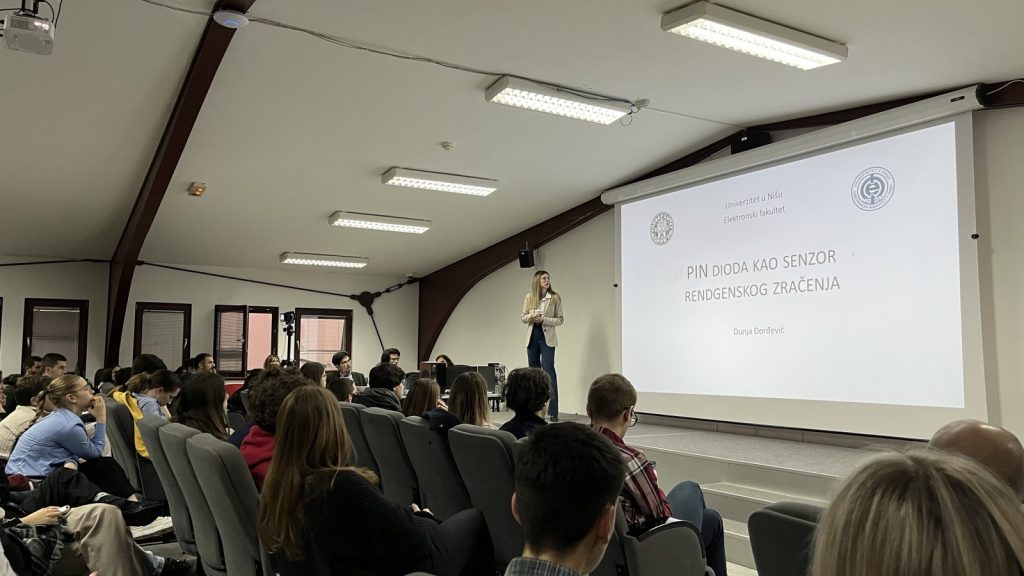
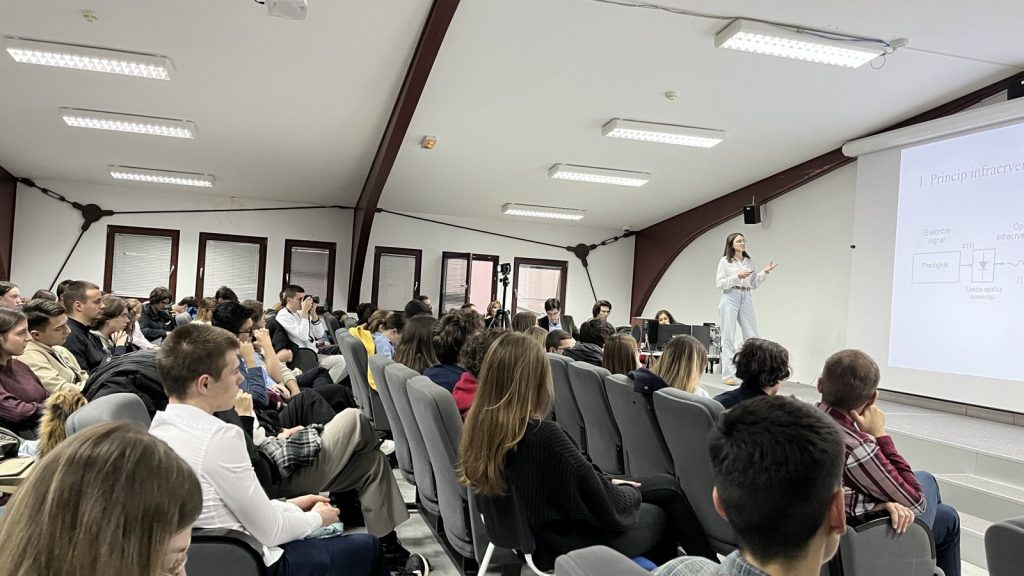
46. Visit to the Technical School „Rade Metalac“ in Leskovac
Following the 17th IEEESTEC conference, the collaboration between the Faculty of Electronic Engineering in Niš and the Technical School „Rade Metalac“ in Leskovac continued with a visit from Prof. Dr. Danijel Danković to the school. Prof. Danković visited the school on December 18th, delivering gifts to the professors and students of the team that won first place in the „Beacon of Knowledge“ competition for the best project.
The competition was held in early December 2024 in Niš. The team from Leskovac triumphed with their project „Eco Challenge,“ one of the largest projects for high school students in the Republic of Serbia, which captured everyone’s hearts and secured victory in the eighth generation of the „Beacon of Knowledge.“
The project involves a competition between three elementary schools in Leskovac to collect waste. The waste is placed in smart bins equipped with artificial intelligence and automated waste recognition and sorting. The school that collects the most points, i.e., waste, over a three-month period will receive a smart garden as a reward. The garden features specific plants that absorb carbon dioxide and other harmful particles, such as PM10 and PM2.5, which negatively affect human health. It also includes sensors for monitoring plant conditions and real-time air quality parameters.
This competition is organized by the Association for the Promotion of Culture in collaboration with the Ministry of Tourism and Youth.
The visit also aimed to emphasize the importance of the IEEE organization, the IEEESTEC conference, and the advantages of studying at the Faculty of Electronic Engineering in Niš. Discussions with the school’s leadership and faculty resulted in a plan for future collaboration.
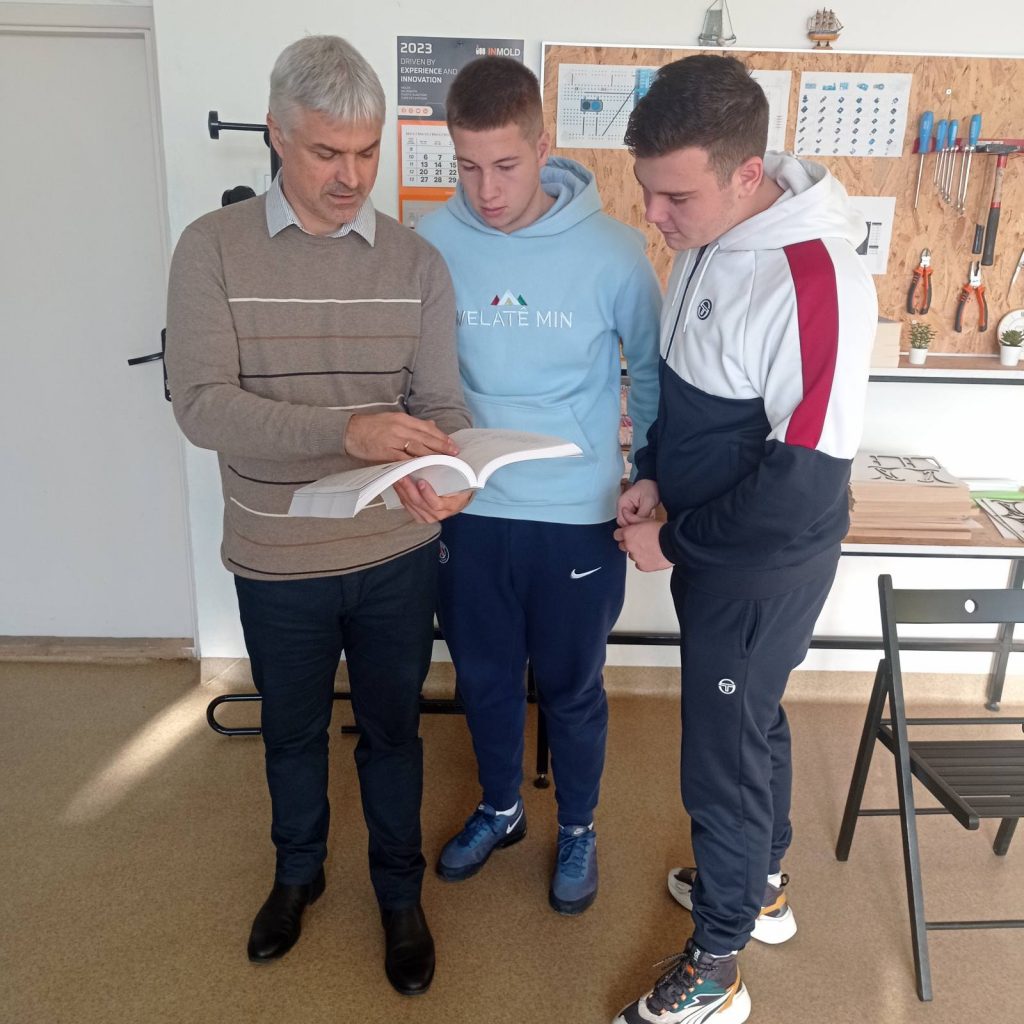
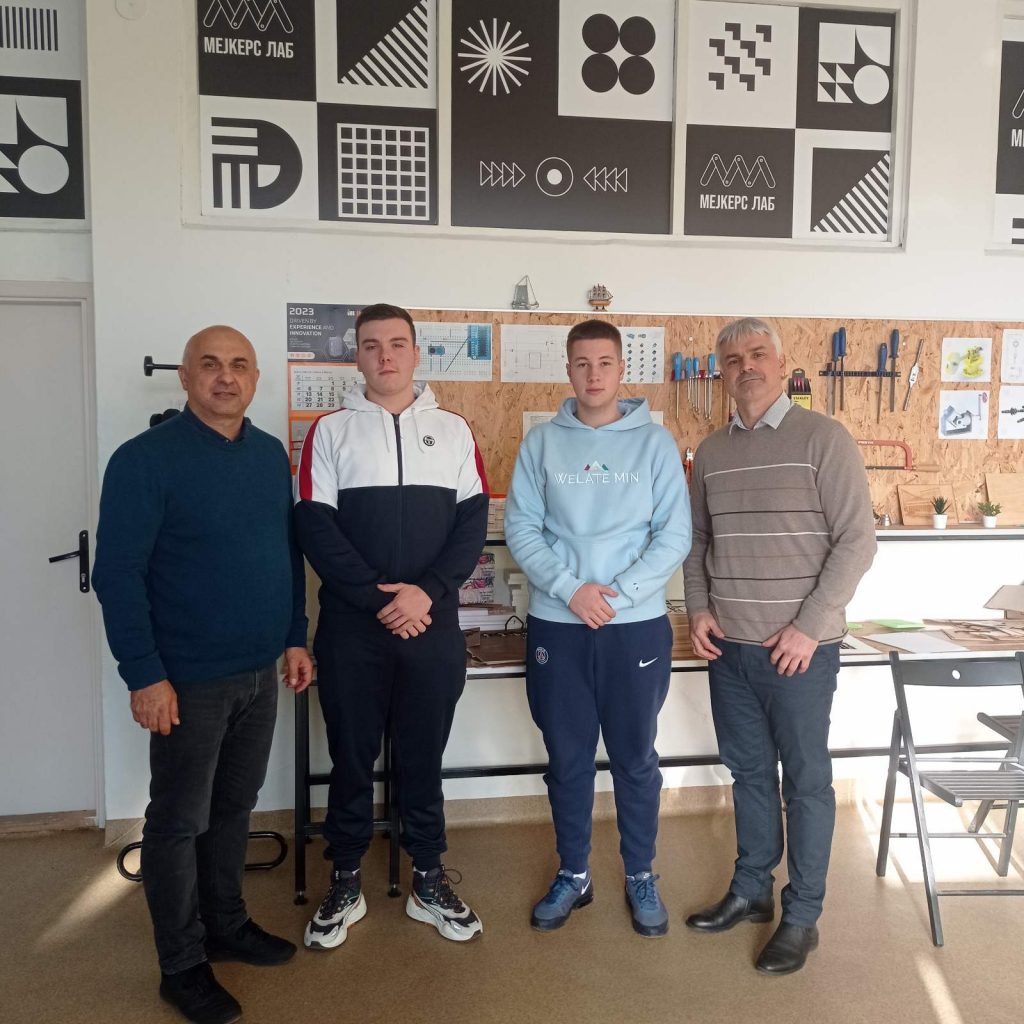
47. Visit to the Center for Professional Development in Education in Leskovac
Prof. Danković visited the Center for Professional Development in Education in Leskovac, one of the most significant institutions in the field of education in the Jablanica and Pčinja districts. Considering that the primary goal of this Center is to improve the quality of education, the visit was used to review the activities conducted in the previous period and to develop a plan for the upcoming calendar year. Emphasis was placed on workshops and lectures for high school students, as well as on activities aimed at encouraging them to write papers for the next IEEESTEC conference and to visit the Faculty of Electronic Engineering.
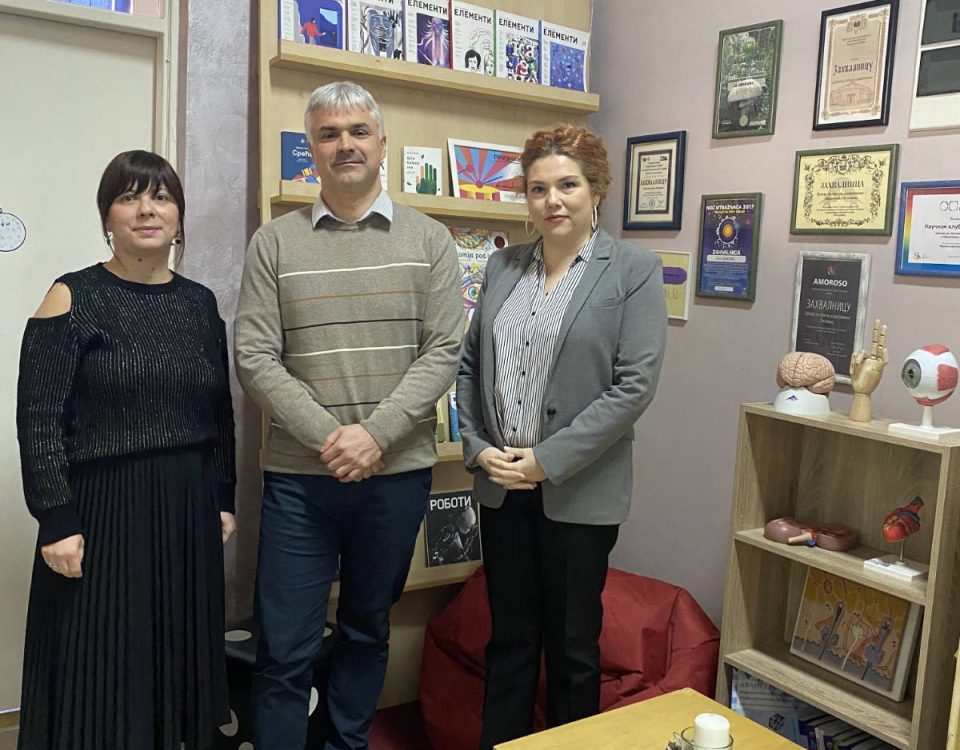
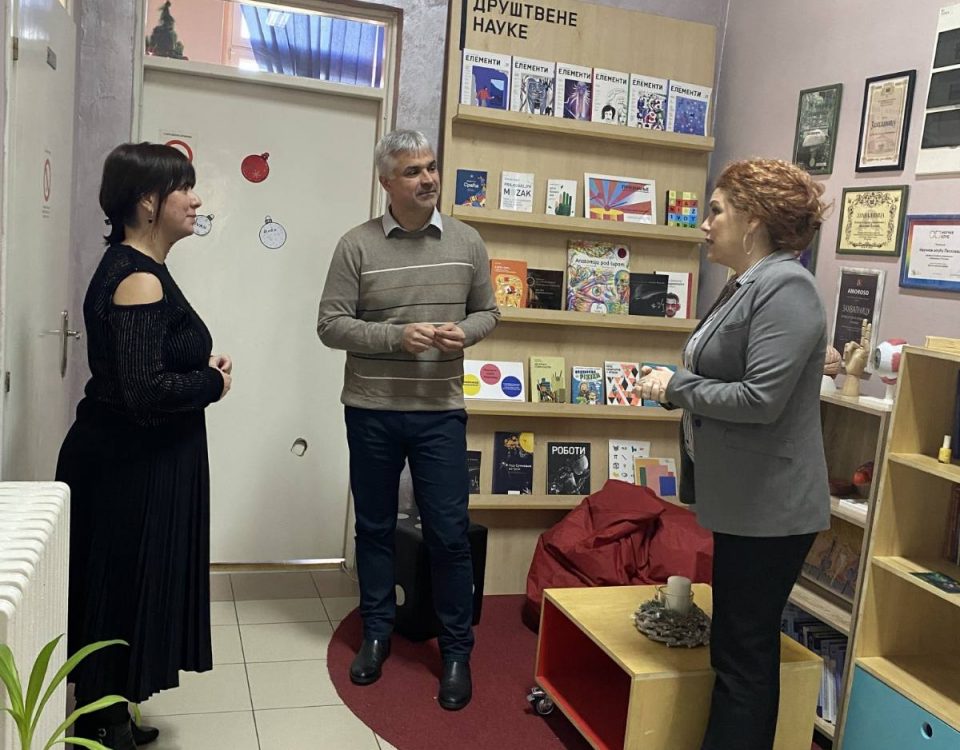
48. Online meeting for Galaksija kup
On Monday, December 23, an online meeting was held, attended by members of the Galaksija kup Organizing Committee, members of the jury of this competition, and a representative of the Noredeus Foundation. The topic of the meeting was the organization of the first part of the competition. As part of the meeting, a report on the IEEESTEC conference was presented to the attendees, and the model of good practice will be transferred to the Galaxy Cup competition. 42 teams applied for the Galaksija kup competition, and the competition will be held in March at a school in Vršac, Serbia.
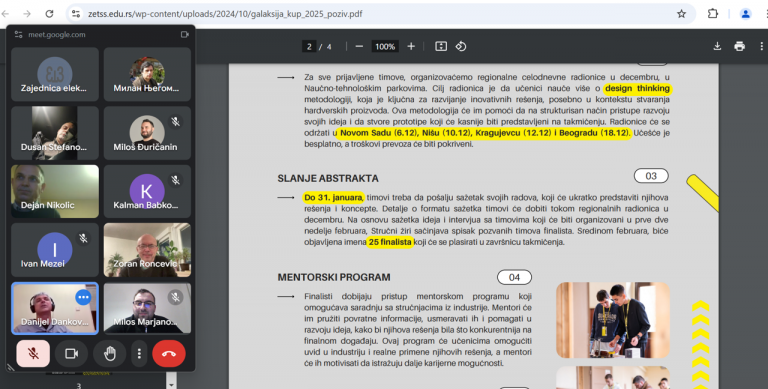
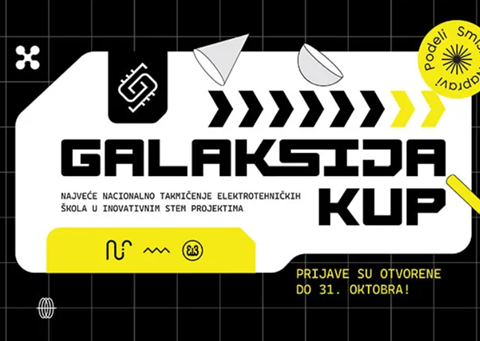
49. The Importance of STEM in a Researcher’s Career
Sandra Veljković, an assistant at the Department of Microelectronics at the Faculty of Electronic Engineering in Niš, has been honored with recognition through the international L’Oréal-UNESCO „For Women in Science“ program.
At the award ceremony, held at the Government of the Republic of Serbia, Sandra spoke about her first encounter with science, which occurred during her participation in the IEEESTEC conference. She also emphasized the importance of support from professors and colleagues with whom she closely collaborates. The award ceremony was attended by Prof. Dr. Danijel Danković and Prof. Dr. Emilija Živanović.
The international L’Oréal-UNESCO „For Women in Science“ initiative celebrates its 26th anniversary this year. The program was launched in Serbia in 2010, and since then, more than 700 young female scientists have participated in the National Awards competition, with 41 of them receiving awards.
The goal of the „For Women in Science“ program is to support exceptional women researchers worldwide, who, through their dedication, achievements, and vision, contribute to the advancement of science and society as a whole.
